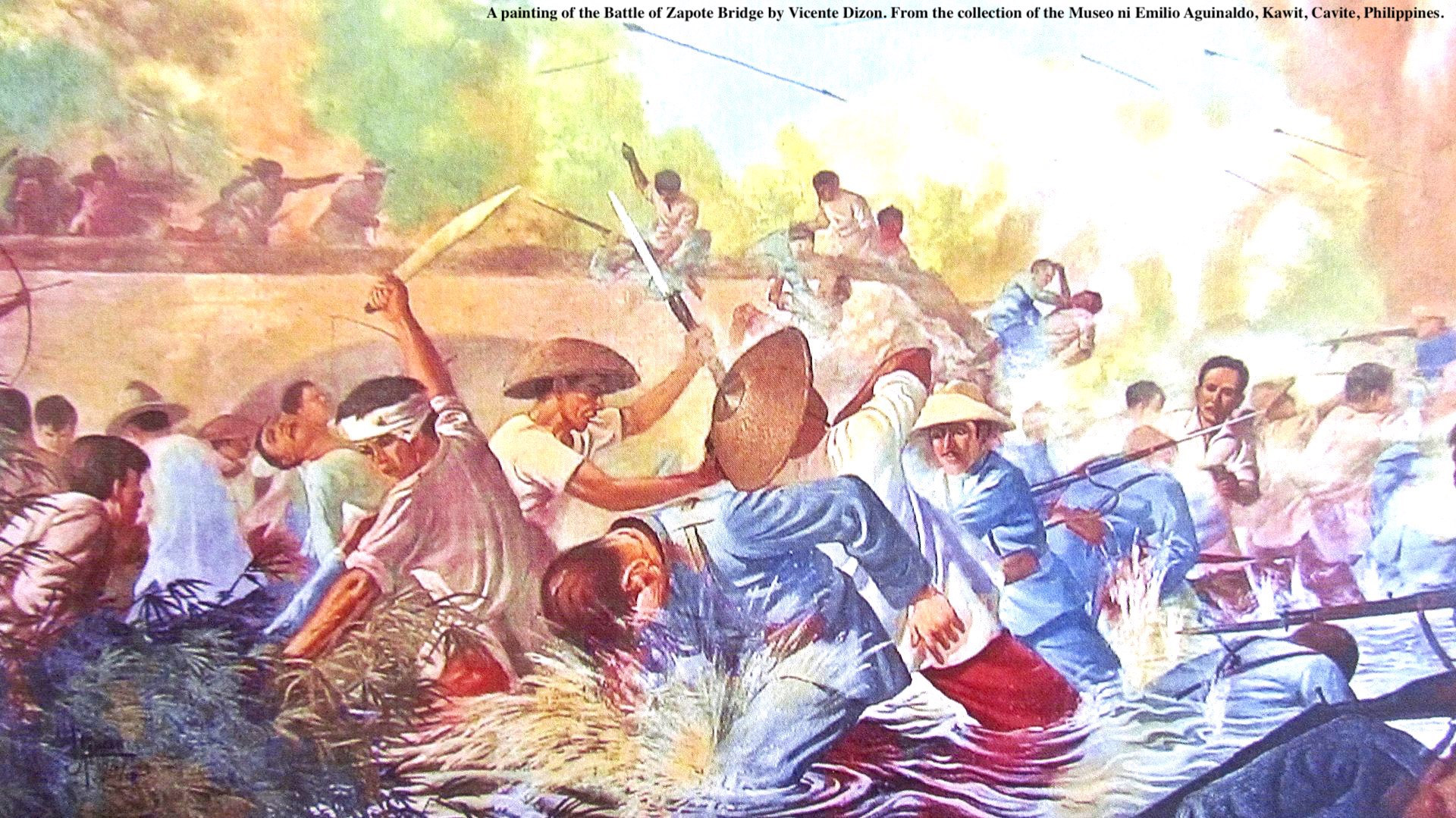
ナショナリズム
Nationalism

ナ ショナリズム(nationalism)とは、人々のあつまりの基本的な単位を国家(→国民国 家)とし、それ の構成員たる国民=ネイション(nation)を維持・発展させていこうとする政治信条のこと。 やさしく言えば、ネーション主義なので、ネイション=国民 のまとまり強調し、それに重きをおく考え方全部をナショナリズムと呼ぶ。ナショナリズムの正しい翻訳語は「国民主義」であり、それは歴 史的には生松敬三をはじめ概念を理解している人たちからそのように翻訳され てきたからである。
ナ ショナリズムを民族主義と訳するのは、ネーションを人種(= レイス, race)と混同してきた戦前から伝統であるが、これは今日的水準からみて完全な誤 訳である。その理由は、我が国(=日本国)では、国民の単位を長いあい だ(1920年代以降今日まで)「大和民族」「日本民族」と言い習わしてきたために、「民族主義(みんぞくしゅぎ)」と言われることがあるが、これはナ ショナリズムのことである。(→日本語の「民族」をチェックする)
ナ ショナリストは、(我が国では)「右翼で、頭の構造が単純な奴」というステレオタイプが あった が、これは我が国の特殊事情に由来するし、史実を必ず反映するわけではない。また、歴史的にも社会的にも左翼のインテリがナショナリストであった国民国家 は数多く存在する。
ひ とつのネイション=国民に重きをおく考え方をナショナリズムと呼ぶのであるから、ナショナリズ ムの反対語あるいは対語は、インターナショナリズム(国際主義)である。インターナショナリズムは、ネーション間の障壁を超えて結びつこう、あるいは、そ れに重きをおく考え方なので、国際連合(国連)などの国際協調主義がその代表である。ただし、国連の前身の国際連盟などは、その枠組みづくりに失敗したと いう歴史的経緯も忘れてはならない。また、国際連盟の時期には、もうすこし別のタイプの国際主義であったインターナショナリズム(第1、第2などと序数が つく)があった。これはプロレタリアート(=革命的労働者)によるネーション=国民概念 を超えた共同体の試み、すなわちソビエト連邦(現在は消滅)が主導 して、世界中にマルクス主義者のネットワークつくりあげようとしたものである。しかし、実際には、モスクワ(ソビエトの首都があった)からの世界マルクス 主義戦略のコントロールを目的としたものであって、その組織化にはさまざまな軋轢が生じて、最終的に瓦解した。
★ さて、 文化ナショナリズム/文化的ナショナリズム(Cultural nationalism) とは、ナショナリズムの研究者たちが、共通の文化を強調することで国民共同体(community of nation)を形成しようとする知識人たちの取り組みを説明する際に用いる用語である。こ れは、「政治的」ナショナリズムと対比される。政治的ナショナリズムとは、国民国家の樹立を通じて「国民の自己決定権」を主張する特定の運動を指す。しか しながら、 化ナショナリズムをめぐる議論のなかで、この概念の必要性を説く人たちが、政治的ナショナリズム(政治ナショナリズム)と、文化ナショナリズムを峻別する ことに対する、賛同と批判である。後者の批判の議論においては「政治ナショナリズム」の派生が「文化ナショナリズムであり」ともに「ナショナリズム」の内 実から意図的に分離することはできないと考える(→「文化ナショナリズム」「ナショナリズムの諸類型」)。
★訳語についての考え方(→「ナショナリズム・民族集団・少数民の研究に関する基礎知識」)
| 英語 |
日本語 |
備考 |
| nation |
国民 |
ネーションを民族と訳してはならない |
| people |
民族・人民・人びと |
|
| folk |
人びと |
folkloreは「人びとの語り」で学問名称は民俗学 |
| ethnic group |
民族集団 |
|
| ethnie |
エトニー・民族 |
|
| ethnicity |
民族性・エスニシティ |
|
| race |
人種 |
|
| assimilation |
同化 |
|
| integration |
統合 |
|
| insertion |
編入 |
|
| transnational |
国家を超えた/トランスナショナル |
|
| nation state |
国民国家 |
| Nationalism
is an idea and movement that holds that the nation should be congruent
with the state.[1][2] As a movement, it presupposes the existence[3]
and tends to promote the interests of a particular nation,[4]
especially with the aim of gaining and maintaining its sovereignty
(self-governance) over its perceived homeland to create a nation-state.
It holds that each nation should govern itself, free from outside
interference (self-determination), that a nation is a natural and ideal
basis for a polity,[5] and that the nation is the only rightful source
of political power.[4][6] It further aims to build and maintain a
single national identity, based on a combination of shared social
characteristics such as culture, ethnicity, geographic location,
language, politics (or the government), religion, traditions and belief
in a shared singular history,[7][8] and to promote national unity or
solidarity.[4] Nationalism, therefore, seeks to preserve and foster a
nation's traditional culture.[9] There are various definitions of a
"nation", which leads to different types of nationalism.[10] The two
main divergent forms identified by scholars are ethnic nationalism and
civic nationalism. Beginning in the late 18th century, particularly with the French Revolution and the spread of the principle of popular sovereignty or self determination, the idea that "the people" should rule is developed by political theorists.[11] Three main theories have been used to explain the emergence of nationalism: 1.Primordialism (perennialism) developed alongside nationalism during the romantic era and held that there have always been nations. This view has since been rejected by most scholars,[12] and nations are now viewed as socially constructed and historically contingent.[13][10] 2. Modernization theory, currently the most commonly accepted theory of nationalism,[14] adopts a constructivist approach and proposes that nationalism emerged due to processes of modernization, such as industrialization, urbanization, and mass education, which made national consciousness possible.[13][15] Proponents of this theory describe nations as "imagined communities" and nationalism as an "invented tradition" in which shared sentiment provides a form of collective identity and binds individuals together in political solidarity.[13][16][17] 3. A third theory, ethnosymbolism explains nationalism as a product of symbols, myths, and traditions, and is associated with the work of Anthony D. Smith.[11] The moral value of nationalism, the relationship between nationalism and patriotism, and the compatibility of nationalism and cosmopolitanism are all subjects of philosophical debate.[13] Nationalism can be combined with diverse political goals and ideologies such as conservatism (national conservatism and right-wing populism) or socialism (left-wing nationalism).[18][19][20][21] In practice, nationalism is seen as positive or negative depending on its ideology and outcomes. Nationalism has been a feature of movements for freedom and justice,[22] has been associated with cultural revivals,[9] and encourages pride in national achievements.[23] It has also been used to legitimize racial, ethnic, and religious divisions, suppress or attack minorities, undermine human rights and democratic traditions,[13] and start wars, being frequently cited as a cause of both World Wars.[24] |
ナ
ショナリズムとは、国家は国家と一致すべきであるとする思想であり運動である[1][2]。運動としては、特定の国家の存在[3]を前提とし、その利益を
促進する傾向があり[4]、特に国民国家を創設するために、認識された祖国に対する主権(自治権)を獲得し維持することを目的としている。ナショナリズム
はさらに、文化、民族性、地理的位置、言語、政治(または政府)、宗教、伝統、共有された特異な歴史に対する信念などの共有された社会的特徴の組み合わせ
に基づいて、単一の国民的アイデンティティを構築し、維持することを目的としている[7][8]。
[したがって、ナショナリズムは国家の伝統的な文化を維持し、育成することを目的としている[9]。 18世紀後半、特にフランス革命と人民主権または自己決定の原則の普及に始まり、「人民」が支配すべきであるという考え方が政治理論家によって発展した: 1. 原初主義(通年主義)は、ロマン主義時代にナショナリズムとともに発展したもので、国家は常に存在してきたとするものである。この見解はその後ほとんどの 学者によって否定され[12]、現在では国家は社会的に構築されたものであり、歴史的に偶発的なものとみなされている[13][10]。 2. 現在ナショナリズムについて最も一般的に受け入れられている近代化理論[14]は、構成主義的なアプローチを採用しており、工業化、都市化、大衆教育と いった近代化のプロセスによってナショナリズムが出現し、それによって国家意識が可能になったと提唱している[13][15]。この理論の支持者は、国家 を「想像された共同体」、ナショナリズムを「発明された伝統」と表現しており、共有された感情が集団的アイデンティティの一形態を提供し、政治的連帯にお いて個人を結びつけると述べている[13][16][17]。 3. 第三の理論であるエスノシンボリズムは、ナショナリズムを象徴、神話、伝統の産物として説明し、アンソニー・D・スミスの研究に関連している[11]。 ナショナリズムの道徳的価値、ナショナリズムと愛国主義の関係、ナショナリズムとコスモポリタニズムの両立はすべて哲学的議論の対象である[13]。ナ ショナリズムは自由と正義を求める運動の特徴であり[22]、文化的復興と関連しており[9]、国家的達成に対する誇りを促している[23]。また人種 的、民族的、宗教的分裂を正当化し、少数派を抑圧または攻撃し、人権と民主主義の伝統を弱体化させ[13]、戦争を始めるために使用されており、両世界大 戦の原因として頻繁に挙げられている[24]。 |
Terminology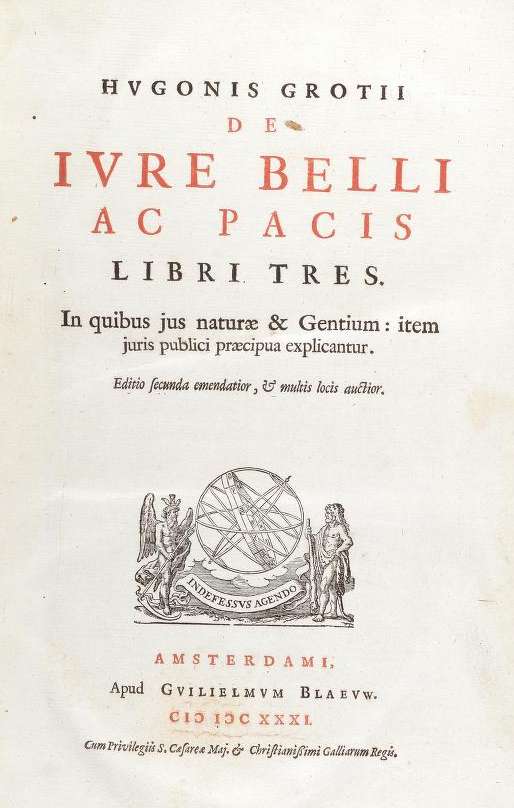 Title page from the second edition (Amsterdam 1631) of De jure belli ac pacis The terminological use of "nations", "sovereignty" and associated concepts were significantly refined with the writing by Hugo Grotius of De jure belli ac pacis in the early 17th century.[how?] Living in the times of the Eighty Years' War between Spain and the Netherlands and the Thirty Years' War between Catholic and Protestant European nations, Grotius was deeply concerned with matters of conflicts between nations in the context of oppositions stemming from religious differences. The word nation was also applied before 1800 in Europe in reference to the inhabitants of a country as well as to collective identities that could include shared history, law, language, political rights, religion and traditions, in a sense more akin to the modern conception.[25] Nationalism as derived from the noun designating 'nations' is a newer word; in the English language, dating to around 1798.[26][27][better source needed] The term gained wider prominence in the 19th century.[28] The term increasingly became negative in its connotations after 1914. Glenda Sluga notes that "The twentieth century, a time of profound disillusionment with nationalism, was also the great age of globalism."[29] Academics define nationalism as a political principle that holds that the nation and state should be congruent.[1][2][30] According to Lisa Weeden, nationalist ideology presumes that "the people" and the state are congruent.[31] |
用語解説 『De jure belli ac pacis』第2版(アムステルダム、1631年)のタイトルページ。 「国家」、「主権」、およびそれらに関連する概念の用語的使用は、17世紀初頭にフーゴー・グロティウスが『De jure belli ac pacis』を著したことで大きく洗練された。スペインとオランダの間の80年戦争や、ヨーロッパのカトリックとプロテスタントの間の30年戦争の時代に 生きたグロティウスは、宗教の違いからくる対立という文脈の中で、国家間の対立の問題に深く関心を抱いていた。1800年以前のヨーロッパでは、国家とい う言葉は、国の住民を指すだけでなく、歴史、法律、言語、政治的権利、宗教、伝統などを共有する集団的アイデンティティを指すこともあり、近代的な概念に 近い意味で用いられていた[25]。 「国家」を意味する名詞に由来するナショナリズムは、英語では1798年頃まで遡る新しい言葉である[26][27][要出典]。 この用語は19世紀に広く知られるようになった[28]。1914年以降、この用語はその意味合いにおいて次第に否定的になっていった。グレンダ・スルー ガは「ナショナリズムに対する深い幻滅の時代であった20世紀は、グローバリズムの偉大な時代でもあった」と指摘している[29]。 リサ・ウィーデンによれば、ナショナリズムのイデオロギーは「国民」と国家が一致していることを前提としている[31]。 |
| History Further information: Nationalist historiography Intellectual origins Anthony D. Smith describes how intellectuals played a primary role in generating cultural perceptions of nationalism and providing the ideology of political nationalism: Wherever one turns in Europe, their seminal position in generating and analysing the concepts, myths, symbols and ideology of nationalism is apparent. This applies to the first appearance of the core doctrine and to the antecedent concepts of national character, genius of the nation and national will.[32] Smith posits the challenges posed to traditional religion and society in the Age of Revolution propelled many intellectuals to "discover alternative principles and concepts, and a new mythology and symbolism, to legitimate and ground human thought and action".[33] He discusses the simultaneous concept of 'historicism' to describe an emerging belief in the birth, growth, and decay of specific peoples and cultures, which became "increasingly attractive as a framework for inquiry into the past and present and [...] an explanatory principle in elucidating the meaning of events, past and present".[34] The Prussian scholar Johann Gottfried Herder (1744–1803) originated the term[clarification needed] in 1772 in his "Treatise on the Origin of Language" stressing the role of a common language.[35][36] He attached exceptional importance to the concepts of nationality and of patriotism – "he that has lost his patriotic spirit has lost himself and the whole world about himself", whilst teaching that "in a certain sense every human perfection is national".[37] Erica Benner identifies Herder as the first philosopher to explicitly suggest "that identities based on language should be regarded as the primary source of legitimate political authority or locus of political resistance".[38] Herder also encouraged the creation of a common cultural and language policy amongst the separate German states.[39] Dating the emergence of nationalism Scholars frequently place the beginning of nationalism in the late 18th century or early 19th century with the American Declaration of Independence or with the French Revolution.[40][41][42] The consensus is that nationalism as a concept was firmly established by the 19th century.[43][44][45] In histories of nationalism, the French Revolution (1789) is seen as an important starting point, not only for its impact on French nationalism but even more for its impact on Germans and Italians and on European intellectuals.[46] The template of nationalism, as a method for mobilizing public opinion around a new state based on popular sovereignty, went back further than 1789: philosophers such as Rousseau and Voltaire, whose ideas influenced the French Revolution, had themselves been influenced or encouraged by the example of earlier constitutionalist liberation movements, notably the Corsican Republic (1755–1768) and American Revolution (1775–1783).[47] 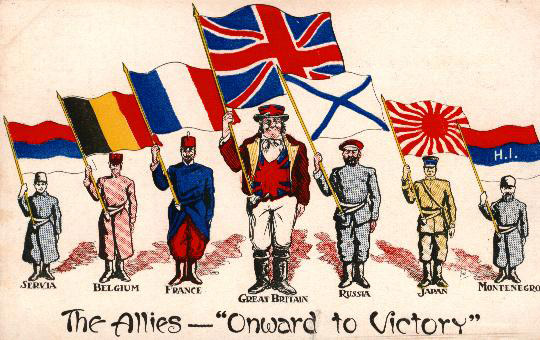 A postcard from 1916 showing national personifications of some of the Allies of World War I, each holding a national flag Due to the Industrial Revolution, there was an emergence of an integrated, nation-encompassing economy and a national public sphere, where British people began to mobilize on a state-wide scale, rather than just in the smaller units of their province, town or family.[48] The early emergence of a popular patriotic nationalism took place in the mid-18th century and was actively promoted by the British government and by the writers and intellectuals of the time.[49] National symbols, anthems, myths, flags and narratives were assiduously constructed by nationalists and widely adopted. The Union Jack was adopted in 1801 as the national one.[50] Thomas Arne composed the patriotic song "Rule, Britannia!" in 1740,[51] and the cartoonist John Arbuthnot invented the character of John Bull as the personification of the English national spirit in 1712.[52] The political convulsions of the late 18th century associated with the American and French revolutions massively augmented the widespread appeal of patriotic nationalism.[53][54] Napoleon Bonaparte's rise to power further established nationalism when he invaded much of Europe. Napoleon used this opportunity to spread revolutionary ideas, resulting in much of the 19th-century European Nationalism.[55] Some scholars argue that variants of nationalism emerged prior to the 18th century. American philosopher and historian Hans Kohn wrote in 1944 that nationalism emerged in the 17th century.[56] In Britons, Forging the Nation 1707–1837, Linda Colley explores how the role of nationalism emerged about 1700 and developed in Britain reaching full form in the 1830s. Writing shortly after World War I, the popular British author H.G. Wells traced the origin of European nationalism to the aftermath of the Reformation, when it filled the moral void left by the decline of Christian faith: [A]s the idea of Christianity as a world brotherhood of men sank into discredit because of its fatal entanglement with priestcraft and the Papacy on the one hand and with the authority of princes on the other, and the age of faith passed into our present age of doubt and disbelief, men shifted the reference of their lives from the kingdom of God and the brotherhood of mankind to these apparently more living realities, France and England, Holy Russia, Spain, Prussia.... **** In the thirteenth and fourteenth centuries the general population of Europe was religious and only vaguely patriotic; by the nineteenth it had become wholly patriotic.[57] 19th century Main article: International relations of the Great Powers (1814–1919) 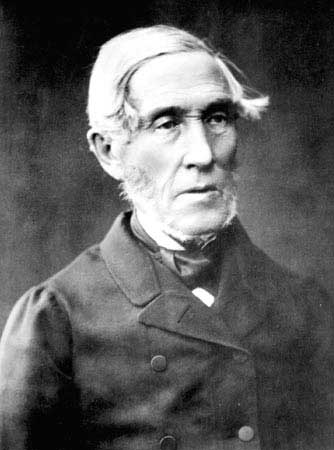 Senator Johan Vilhelm Snellman (1806–1881), who also possessed the professions of philosopher, journalist and author, was one of the most influential Fennomans and Finnish nationalists in the 19th century.[58][59][60][61][62] The political development of nationalism and the push for popular sovereignty culminated with the ethnic/national revolutions of Europe. During the 19th century nationalism became one of the most significant political and social forces in history; it is typically listed among the top causes of World War I.[63][64] Napoleon's conquests of the German and Italian states around 1800–1806 played a major role in stimulating nationalism and the demands for national unity.[65] English historian J. P. T. Bury argues: Between 1830 and 1870 nationalism had thus made great strides. It inspired great literature, quickened scholarship, and nurtured heroes. It had shown its power both to unify and to divide. It had led to great achievements of political construction and consolidation in Germany and Italy; but it was more clear than ever a threat to the Ottoman and Habsburg empires, which were essentially multi-national. European culture had been enriched by the new vernacular contributions of little-known or forgotten peoples, but at the same time such unity as it had was imperiled by fragmentation. Moreover, the antagonisms fostered by nationalism had made not only for wars, insurrections, and local hatreds—they had accentuated or created new spiritual divisions in a nominally Christian Europe.[66] France Main article: French nationalism Further information: French–German enmity and Revanchism 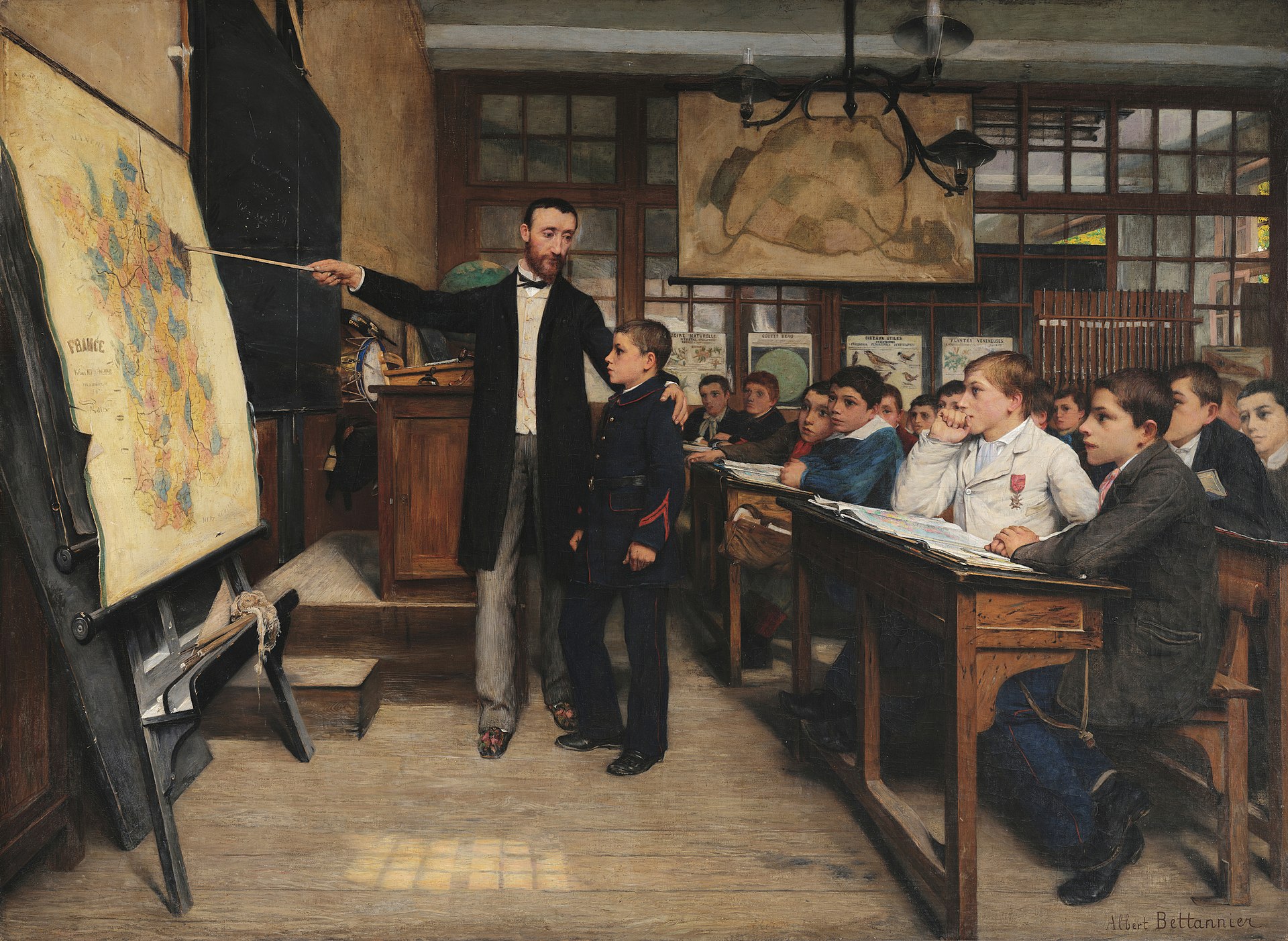 A painting by Alphonse-Marie-Adolphe de Neuville from 1887 depicting French students being taught about the lost provinces of Alsace-Lorraine, taken by Germany in 1871 Nationalism in France gained early expressions in France's revolutionary government. In 1793, that government declared a mass conscription (levée en masse) with a call to service: Henceforth, until the enemies have been driven from the territory of the Republic, all the French are in permanent requisition for army service. The young men shall go to battle; the married men shall forge arms in the hospitals; the children shall turn old linen to lint; the old men shall repair to the public places, to stimulate the courage of the warriors and preach the unity of the Republic and the hatred of kings.[67] This nationalism gained pace after the French Revolution came to a close. Defeat in war, with a loss in territory, was a powerful force in nationalism. In France, revenge and return of Alsace-Lorraine was a powerful motivating force for a quarter century after their defeat by Germany in 1871. After 1895, French nationalists focused on Dreyfus and internal subversion, and the Alsace issue petered out.[68] The French reaction was a famous case of Revanchism ("revenge") which demands the return of lost territory that "belongs" to the national homeland. Revanchism draws its strength from patriotic and retributionist thought and it is often motivated by economic or geo-political factors. Extreme revanchist ideologues often represent a hawkish stance, suggesting that their desired objectives can be achieved through the positive outcome of another war. It is linked with irredentism, the conception that a part of the cultural and ethnic nation remains "unredeemed" outside the borders of its appropriate nation state. Revanchist politics often rely on the identification of a nation with a nation state, often mobilizing deep-rooted sentiments of ethnic nationalism, claiming territories outside the state where members of the ethnic group live, while using heavy-handed nationalism to mobilize support for these aims. Revanchist justifications are often presented as based on ancient or even autochthonous occupation of a territory since "time immemorial", an assertion that is usually inextricably involved in revanchism and irredentism, justifying them in the eyes of their proponents.[69] The Dreyfus Affair in France 1894–1906 made the battle against treason and disloyalty a central theme for conservative Catholic French nationalists. Dreyfus, a Jew, was an outsider, that is in the views of intense nationalists, not a true Frenchman, not one to be trusted, not one to be given the benefit of the doubt. True loyalty to the nation, from the conservative viewpoint, was threatened by liberal and republican principles of liberty and equality that were leading the country to disaster.[70] Russia Main article: Russian nationalism 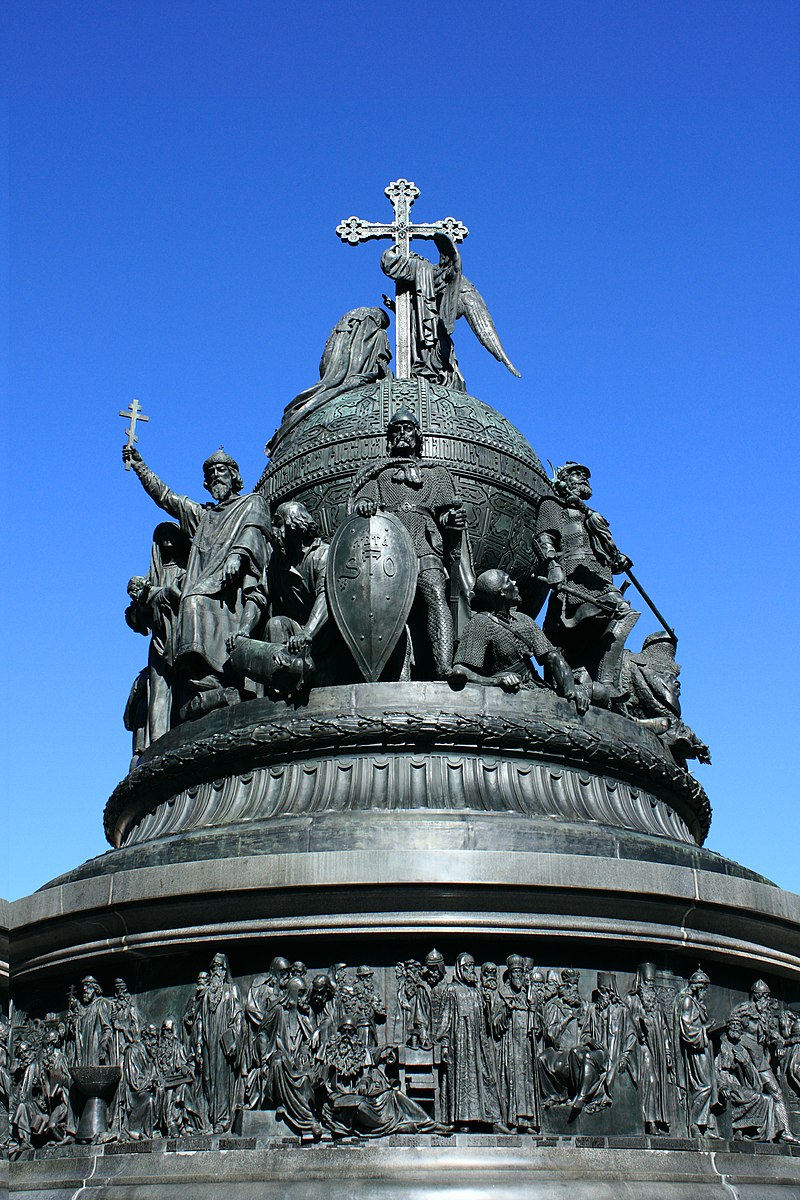 The Millennium of Russia monument which was built in 1862 in celebration of one thousand years of Russian history Before 1815, the sense of Russian nationalism was weak—what sense there was focused on loyalty and obedience to the tsar. The Russian motto "Orthodoxy, Autocracy, and Nationality" was coined by Count Sergey Uvarov and it was adopted by Emperor Nicholas I as the official ideology of the Russian Empire.[71] Three components of Uvarov's triad were: Orthodoxy – Orthodox Christianity and protection of the Russian Orthodox Church. Autocracy – unconditional loyalty to the House of Romanov in return for paternalist protection for all social estates. Nationality (Narodnost, has been also translated as national spirit)[72] – recognition of the state-founding role on Russian nationality. By the 1860s, as a result of educational indoctrination, and due to conservative resistance to ideas and ideologies which were transmitted from Western Europe, a pan-Slavic movement had emerged and it produced both a sense of Russian nationalism and a nationalistic mission to support and protect pan-Slavism. This Slavophile movement became popular in 19th-century Russia. Pan-Slavism was fueled by, and it was also the fuel for Russia's numerous wars against the Ottoman Empire which were waged in order to achieve the alleged goal of liberating Orthodox nationalities, such as Bulgarians, Romanians, Serbs and Greeks, from Ottoman rule. Slavophiles opposed the Western European influences which had been transmitted to Russia and they were also determined to protect Russian culture and traditions. Aleksey Khomyakov, Ivan Kireyevsky, and Konstantin Aksakov are credited with co-founding the movement.[73] Latin America 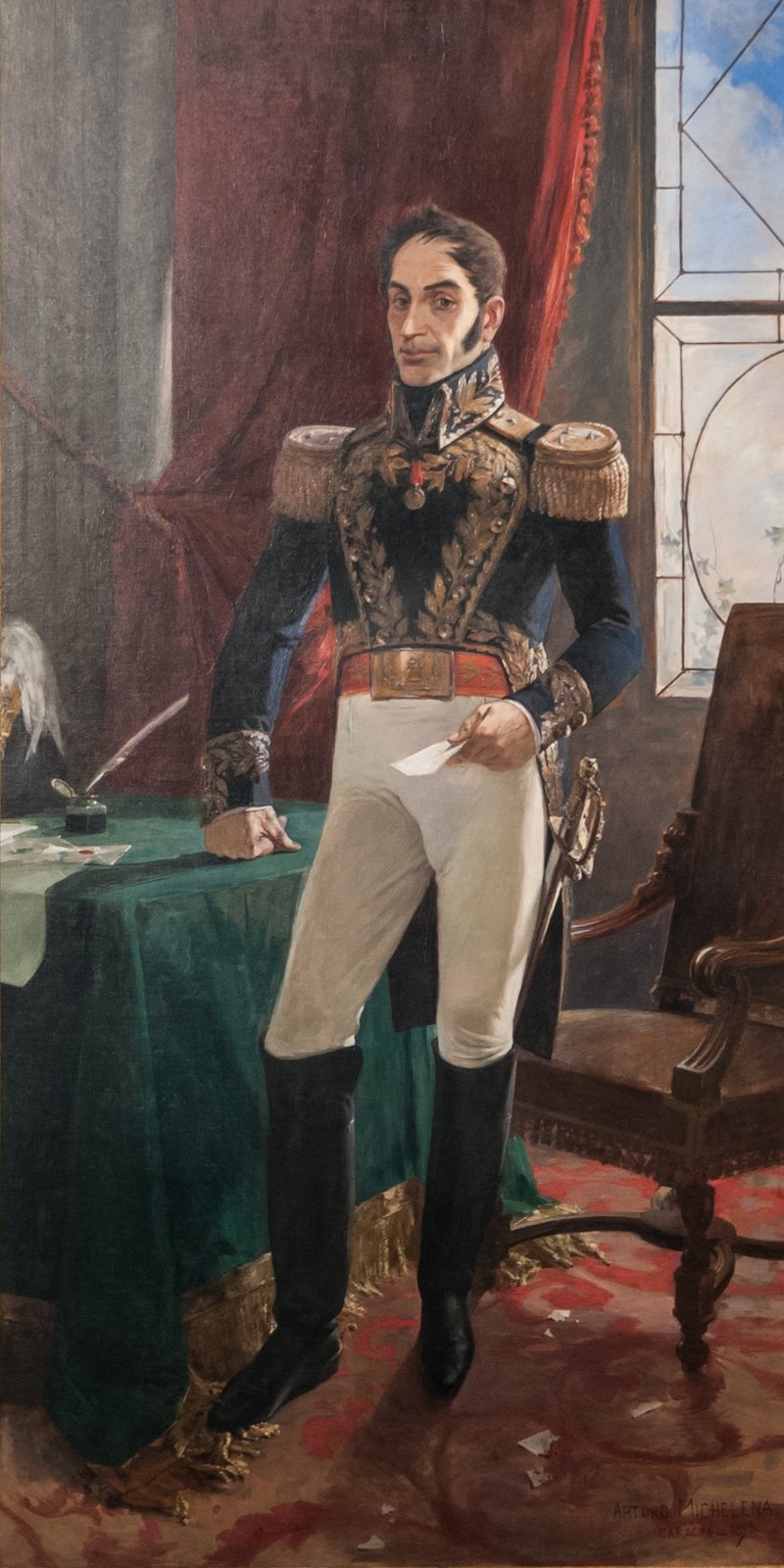 General Simón Bolívar (1783–1830), a leader of independence in Latin America This section needs expansion. You can help by adding to it. (January 2019) Main article: Latin American Wars of Independence An upsurge in nationalism in Latin America in the 1810s and 1820s sparked revolutions that cost Spain nearly all of its colonies which were located there.[74] Spain was at war with Britain from 1798 to 1808, and the British Royal Navy cut off its contacts with its colonies, so nationalism flourished and trade with Spain was suspended. The colonies set up temporary governments or juntas which were effectively independent from Spain. These juntas were established as a result of Napoleon's resistance failure in Spain. They served to determine new leadership and, in colonies like Caracas, abolished the slave trade as well as the Indian tribute.[75] The division exploded between Spaniards who were born in Spain (called "peninsulares") versus those of Spanish descent born in New Spain (called "criollos" in Spanish or "creoles" in English). The two groups wrestled for power, with the criollos leading the call for independence. Spain tried to use its armies to fight back but had no help from European powers. Indeed, Britain and the United States worked against Spain, enforcing the Monroe Doctrine.[76] Spain lost all of its American colonies, except Cuba and Puerto Rico, in a complex series of revolts from 1808 to 1826.[77] Germany Main article: German nationalism 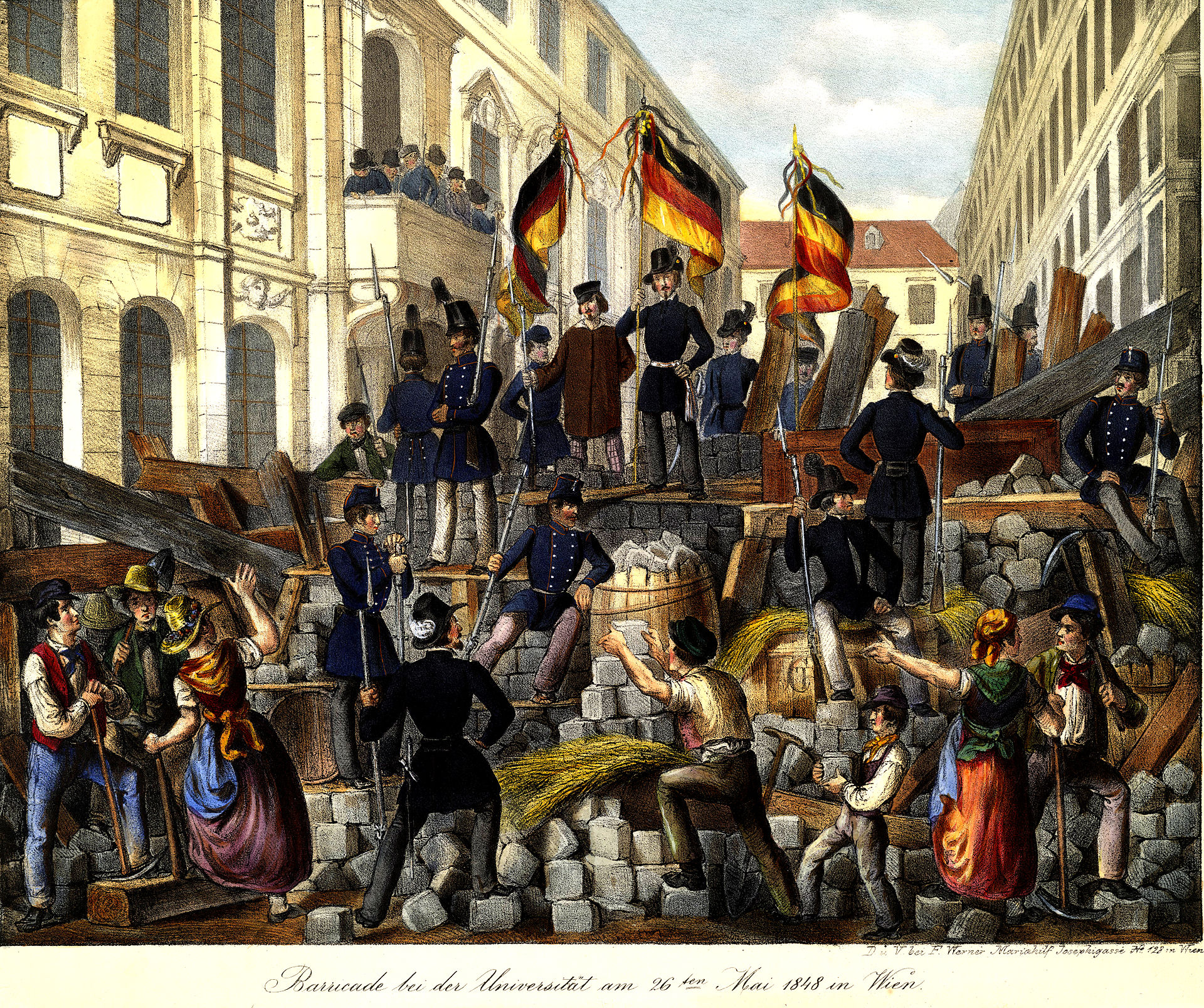 Revolutionaries in Vienna with German tricolor flags, May 1848 In the German states west of Prussia, Napoleon abolished many of the old or medieval relics, such as dissolving the Holy Roman Empire in 1806.[78] He imposed rational legal systems and demonstrated how dramatic changes were possible. His organization of the Confederation of the Rhine in 1806 promoted a feeling of nationalism. Nationalists sought to encompass masculinity in their quest for strength and unity.[79] It was Prussian chancellor Otto von Bismarck who achieved German unification through a series of highly successful short wars against Denmark, Austria and France which thrilled the pan-German nationalists in the smaller German states. They fought in his wars and eagerly joined the new German Empire, which Bismarck ran as a force for balance and peace in Europe after 1871.[80] In the 19th century, German nationalism was promoted by Hegelian-oriented academic historians who saw Prussia as the true carrier of the German spirit, and the power of the state as the ultimate goal of nationalism. The three main historians were Johann Gustav Droysen (1808–1884), Heinrich von Sybel (1817–1895) and Heinrich von Treitschke (1834–1896). Droysen moved from liberalism to an intense nationalism that celebrated Prussian Protestantism, efficiency, progress, and reform, in striking contrast to Austrian Catholicism, impotency and backwardness. He idealized the Hohenzollern kings of Prussia. His large-scale History of Prussian Politics (14 vol 1855–1886) was foundational for nationalistic students and scholars. Von Sybel founded and edited the leading academic history journal, Historische Zeitschrift and as the director of the Prussian state archives published massive compilations that were devoured by scholars of nationalism.[81] The most influential of the German nationalist historians, was Treitschke who had an enormous influence on elite students at Heidelberg and Berlin universities.[82] Treitschke vehemently attacked parliamentarianism, socialism, pacifism, the English, the French, the Jews, and the internationalists. The core of his message was the need for a strong, unified state—a unified Germany under Prussian supervision. "It is the highest duty of the State to increase its power," he stated. Although he was a descendant of a Czech family, he considered himself not Slavic but German: "I am 1000 times more the patriot than a professor."[83] 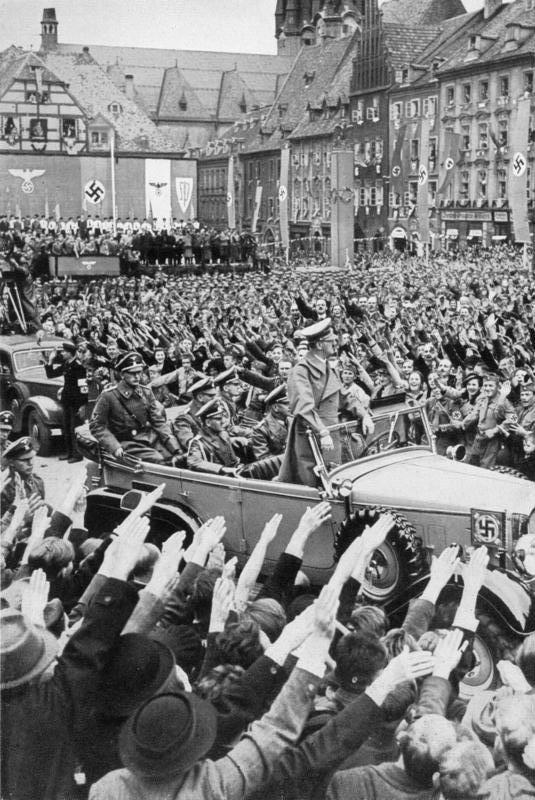 Adolf Hitler being welcomed by a crowd in Sudetenland, where the pro-Nazi Sudeten German Party gained 88% of ethnic-German votes in May 1938[84] German nationalism, expressed through the ideology of Nazism, may also be understood as trans-national in nature. This aspect was primarily advocated by Adolf Hitler, who later became the leader of the Nazi Party. This party was devoted to what they identified as an Aryan race, residing in various European countries, but sometime mixed with alien elements such as Jews.[85] Meanwhile, the Nazis rejected many of the well-established citizens within those same countries, such as the Romani (Gypsies) and of course Jews, whom they did not identify as Aryan. A key Nazi doctrine was "Living Space" (for Aryans only) or "Lebensraum," which was a vast undertaking to transplant Aryans throughout Poland, much of Eastern Europe and the Baltic nations, and all of Western Russia and Ukraine. Lebensraum was thus a vast project for advancing the Aryan race far outside of any particular nation or national borders. The Nazi's goals were racist focused on advancing the Aryan race as they perceived it, eugenics modification of the human race, and the eradication of human beings that they deemed inferior. But their goals were trans-national and intended to spread across as much of the world as they could achieve. Although Nazism glorified German history, it also embraced the supposed virtues and achievements of the Aryan race in other countries,[86] including India.[87] The Nazis' Aryanism longed for now-extinct species of superior bulls once used as livestock by Aryans and other features of Aryan history that never resided within the borders of Germany as a nation.[88] Italy Main articles: Italian Fascism, Italian nationalism, and Italian unification 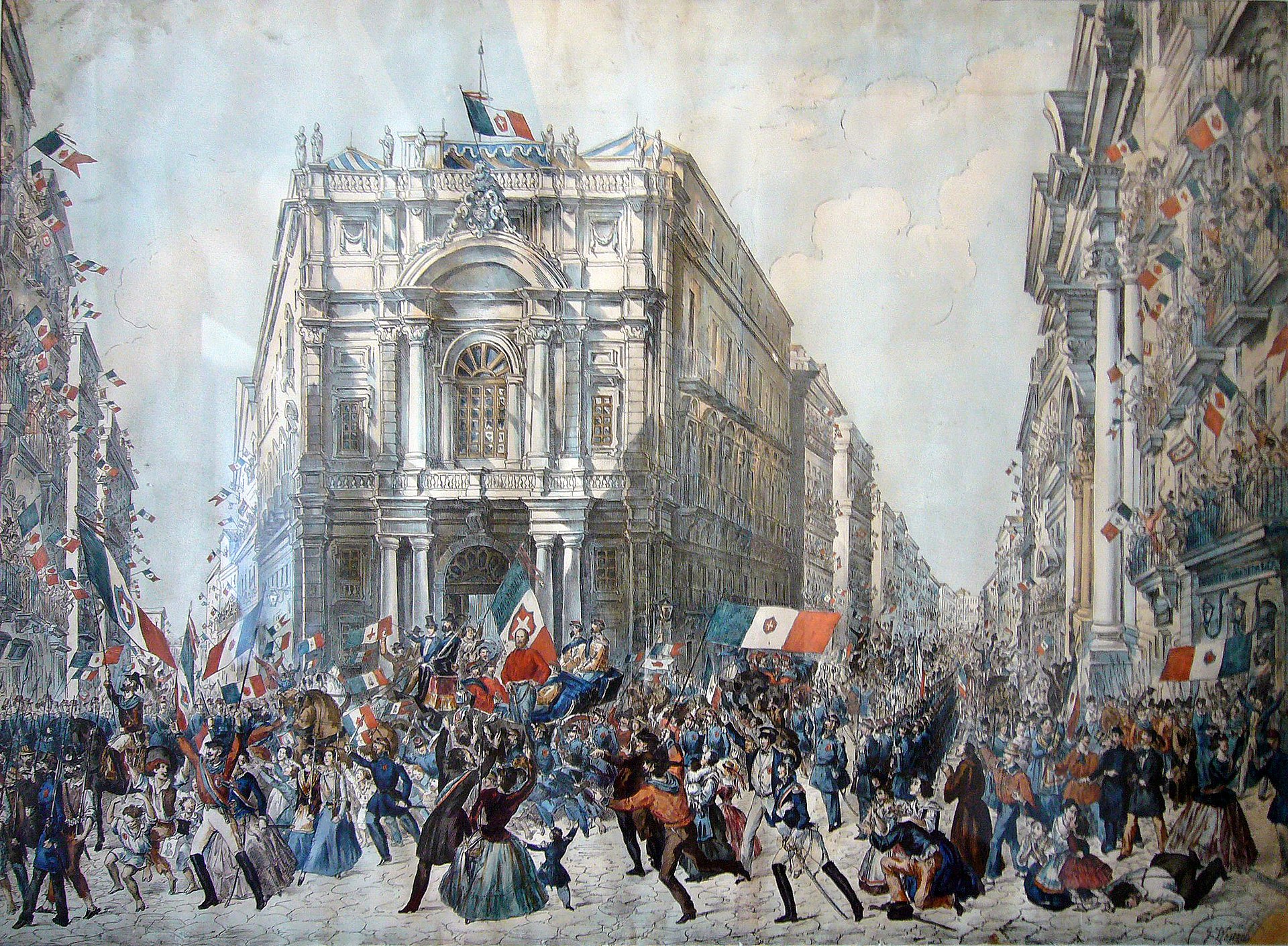 People cheering as Giuseppe Garibaldi enters Naples in 1860 Italian nationalism emerged in the 19th century and was the driving force for Italian unification or the Risorgimento (meaning the "Resurgence" or "Revival"). It was the political and intellectual movement that consolidated the different states of the Italian peninsula into the single state of the Kingdom of Italy in 1861. The memory of the Risorgimento is central to Italian nationalism but it was based in the liberal middle classes and ultimately proved a bit weak.[89] The new government treated the newly annexed South as a kind of underdeveloped province due to its "backward" and poverty-stricken society, its poor grasp of standard Italian (as Italo-Dalmatian dialects of Neapolitan and Sicilian were prevalent in the common use) and its local traditions.[citation needed] The liberals had always been strong opponents of the pope and the very well organized Catholic Church. The liberal government under the Sicilian Francesco Crispi sought to enlarge his political base by emulating Otto von Bismarck and firing up Italian nationalism with an aggressive foreign policy. It partially crashed and his cause was set back. Of his nationalistic foreign policy, historian R. J. B. Bosworth says: [Crispi] pursued policies whose openly aggressive character would not be equaled until the days of the Fascist regime. Crispi increased military expenditure, talked cheerfully of a European conflagration, and alarmed his German or British friends with these suggestions of preventative attacks on his enemies. His policies were ruinous, both for Italy's trade with France, and, more humiliatingly, for colonial ambitions in East Africa. Crispi's lust for territory there was thwarted when on 1 March 1896, the armies of Ethiopian Emperor Menelik routed Italian forces at Adowa [...] in what has been defined as an unparalleled disaster for a modern army. Crispi, whose private life and personal finances [...] were objects of perennial scandal, went into dishonorable retirement.[90] Italy joined the Allies in the First World War after getting promises of territory, but its war effort was not honored after the war and this fact discredited liberalism paving the way for Benito Mussolini and a political doctrine of his own creation, Fascism. Mussolini's 20-year dictatorship involved a highly aggressive nationalism that led to a series of wars with the creation of the Italian Empire, an alliance with Hitler's Germany, and humiliation and hardship in the Second World War. After 1945, the Catholics returned to government and tensions eased somewhat, but the former two Sicilies remained poor and partially underdeveloped (by industrial country standards). In the 1950s and early 1960s, Italy had an economic boom that pushed its economy to the fifth place in the world. The working class in those decades voted mostly for the Communist Party, and it looked to Moscow rather than Rome for inspiration and was kept out of the national government even as it controlled some industrial cities across the North. In the 21st century, the Communists have become marginal but political tensions remained high as shown by Umberto Bossi's Padanism in the 1980s[91] (whose party Lega Nord has come to partially embrace a moderate version of Italian nationalism over the years) and other separatist movements spread across the country.[citation needed] Spain After the War of the Spanish Succession, rooted in the political position of the Count-Duke of Olivares and the absolutism of Philip V, the assimilation of the Crown of Aragon by the Castilian Crown through the Decrees of Nova planta was the first step in the creation of the Spanish nation-state. As in other contemporary European states, political union was the first step in the creation of the Spanish nation-state, in this case not on a uniform ethnic basis, but through the imposition of the political and cultural characteristics of the dominant ethnic group, in this case the Castilians, over those of other ethnic groups, who became national minorities to be assimilated.[92][93] In fact, since the political unification of 1714, Spanish assimilation policies towards Catalan-speaking territories (Catalonia, Valencia, the Balearic Islands, part of Aragon) and other national minorities, as Basques and Galicians, have been a historical constant.[94][95][96][97][98] The nationalization process accelerated in the 19th century, in parallel to the origin of Spanish nationalism, the social, political and ideological movement that tried to shape a Spanish national identity based on the Castilian model, in conflict with the other historical nations of the State. Politicians of the time were aware that despite the aggressive policies pursued up to that time, the uniform and monocultural "Spanish nation" did not exist, as indicated in 1835 by Antonio Alcalà Galiano, when in the Cortes del Estatuto Real he defended the effort "To make the Spanish nation a nation that neither is nor has been until now."[99] Building the nation (as in France, it was the state that created the nation, and not the opposite process) is an ideal that the Spanish elites constantly reiterated, and, one hundred years later than Alcalá Galiano, for example, we can also find it in the mouth of the fascist José Pemartín, who admired the German and Italian modeling policies:[100] "There is an intimate and decisive dualism, both in Italian fascism and in German National Socialism. On the one hand, the Hegelian doctrine of the absolutism of the state is felt. The State originates in the Nation, educates and shapes the mentality of the individual; is, in Mussolini's words, the soul of the soul» And will be found again two hundred years later, from the socialist Josep Borrell:[101] The modern history of Spain is an unfortunate history that meant that we did not consolidate a modern State. Independenceists think that the nation makes the State. I think the opposite. The State makes the nation. A strong State, which imposes its language, culture, education. The creation of the tradition of the political community of Spaniards as common destiny over other communities has been argued to trace back to the Cortes of Cádiz.[102] From 1812 on, revisiting the previous history of Spain, Spanish liberalism tended to take for granted the national conscience and the Spanish nation.[103] A by-product of 19th-century Spanish nationalist thinking is the concept of Reconquista, which holds the power of propelling the weaponized notion of Spain being a nation shaped against Islam.[104] The strong interface of nationalism with colonialism is another feature of 19th-century nation building in Spain, with the defence of slavery and colonialism in Cuba being often able to reconcile tensions between mainland elites of Catalonia and Madrid throughout the period.[105] During the first half of 20th century (notably during the dictatorship of Primo de Rivera and the dictatorship of Franco), a new brand of Spanish nationalism with a marked military flavour and an authoritarian stance (as well as promoting policies favouring the Spanish language against the other languages in the country) as a means of modernizing the country was developed by Spanish conservatives, fusing regenerationist principles with traditional Spanish nationalism.[106] The authoritarian national ideal resumed during the Francoist dictatorship, in the form of National-Catholicism,[106] which was in turn complemented by the myth of Hispanidad.[107] A distinct manifestation of Spanish nationalism in modern Spanish politics is the interchange of attacks with competing regional nationalisms.[108] Initially present after the end of Francoism in a rather diffuse and reactive form, the Spanish nationalist discourse has been often self-branded as "constitutional patriotism" since the 1980s.[109] Often ignored as in the case of other State nationalisms,[110] its alleged "non-existence" has been a commonplace espoused by prominent figures in the public sphere as well as the mass-media in the country.[111] 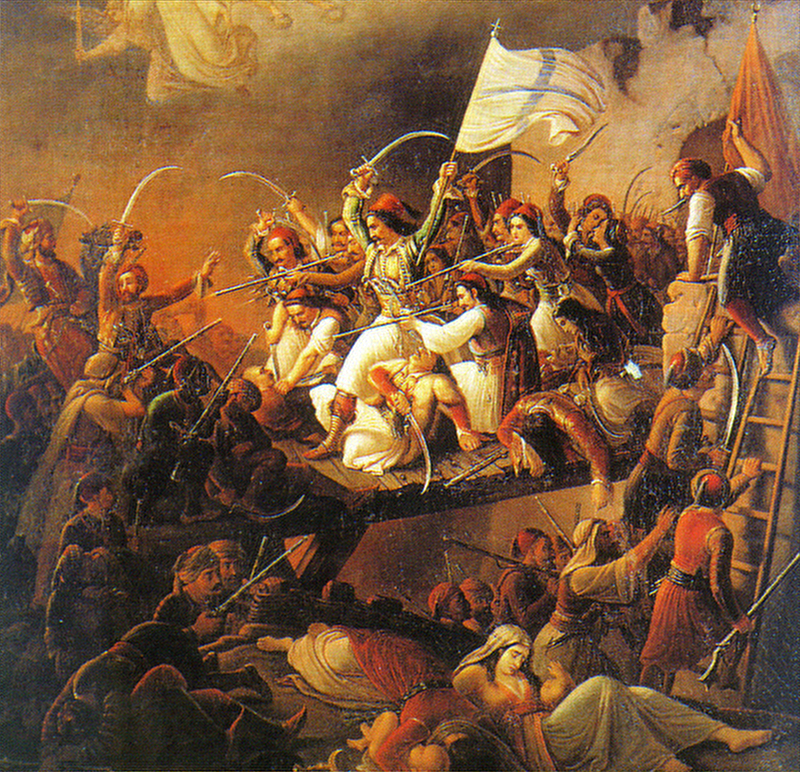 Beginning in 1821, the Greek War of Independence began as a rebellion by Greek revolutionaries against the ruling Ottoman Empire. Greece During the early 19th century, inspired by romanticism, classicism, former movements of Greek nationalism and failed Greek revolts against the Ottoman Empire (such as the Orlofika revolt in southern Greece in 1770, and the Epirus-Macedonian revolt of Northern Greece in 1575), Greek nationalism led to the Greek war of independence.[112] The Greek drive for independence from the Ottoman Empire in the 1820s and 1830s inspired supporters across Christian Europe, especially in Britain, which was the result of western idealization of Classical Greece and romanticism. France, Russia and Britain critically intervened to ensure the success of this nationalist endeavor.[113] Serbia Main articles: History of Serbia, History of Serbs, and Serbian nationalism 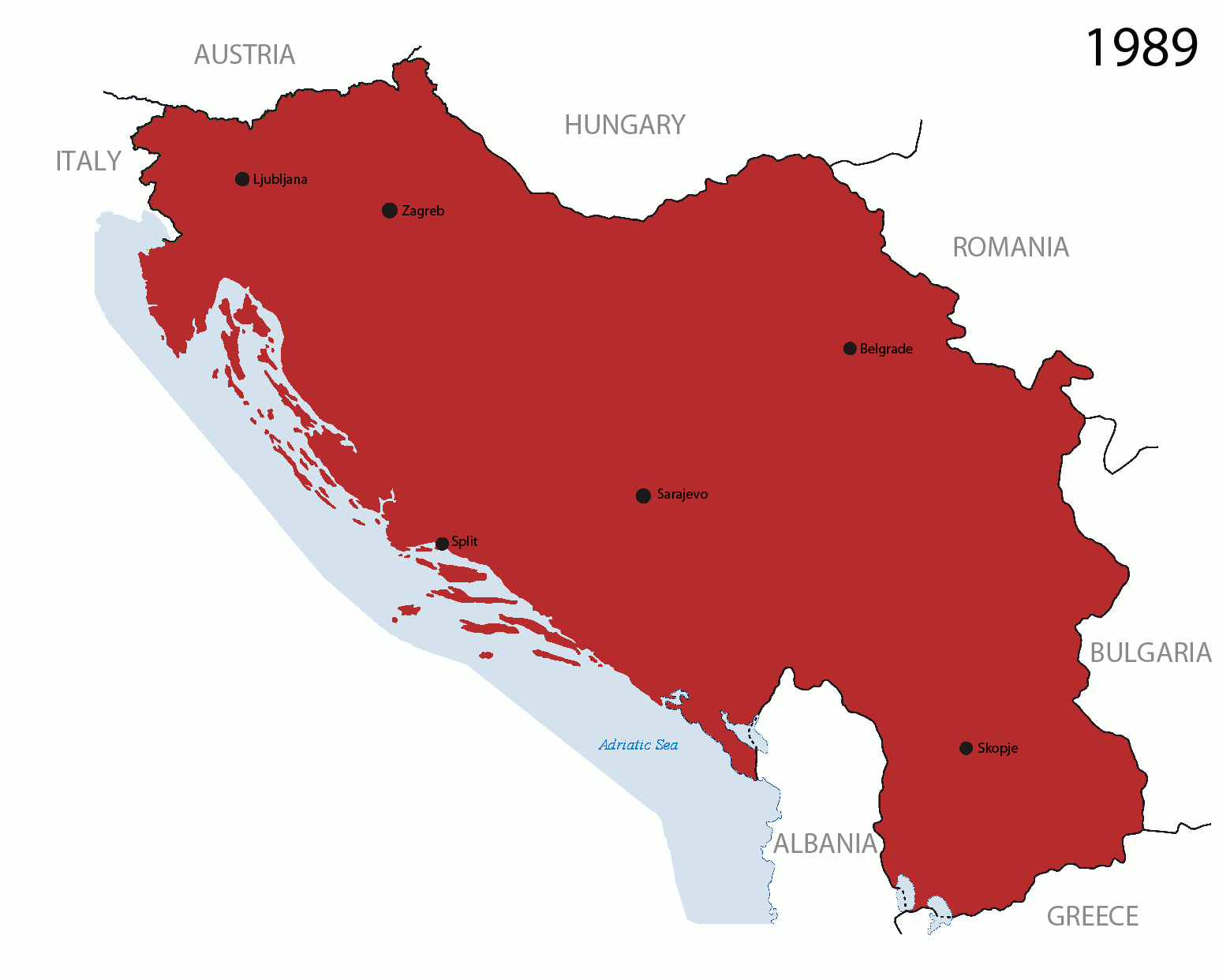 Breakup of Yugoslavia For centuries the Orthodox Christian Serbs were ruled by the Muslim Ottoman Empire.[114] The success of the Serbian Revolution against Ottoman rule in 1817 marked the birth of the Principality of Serbia. It achieved de facto independence in 1867 and finally gained international recognition in 1878. Serbia had sought to liberate and unite with Bosnia and Herzegovina to the west and Old Serbia (Kosovo and Vardar Macedonia) to the south. Nationalist circles in both Serbia and Croatia (part of Austria-Hungary) began to advocate for a greater South Slavic union in the 1860s, claiming Bosnia as their common land based on shared language and tradition.[115] In 1914, Serb revolutionaries in Bosnia assassinated Archduke Ferdinand. Austria-Hungary, with German backing, tried to crush Serbia in 1914, thus igniting the First World War in which Austria-Hungary dissolved into nation states.[116] In 1918, the region of Banat, Bačka and Baranja came under control of the Serbian army, later the Great National Assembly of Serbs, Bunjevci and other Slavs voted to join Serbia; the Kingdom of Serbia joined the union with State of Slovenes, Croats and Serbs on 1 December 1918, and the country was named Kingdom of Serbs, Croats, and Slovenes. It was renamed Yugoslavia in 1929, and a Yugoslav identity was promoted, which ultimately failed. After the Second World War, Yugoslav Communists established a new socialist republic of Yugoslavia. That state broke up again in the 1990s.[117] Poland Main articles: History of Poland and Polish nationalism The cause of Polish nationalism was repeatedly frustrated before 1918. In the 1790s, the Habsburg monarchy, Prussia and Russia invaded, annexed, and subsequently partitioned Poland. Napoleon set up the Duchy of Warsaw, a new Polish state that ignited a spirit of nationalism. Russia took it over in 1815 as Congress Poland with the tsar proclaimed as "King of Poland". Large-scale nationalist revolts erupted in 1830 and 1863–64 but were harshly crushed by Russia, which tried to make the Polish language, culture and religion more like Russia's. The collapse of the Russian Empire in the First World War enabled the major powers to re-establish an independent Poland, which survived until 1939. Meanwhile, Poles in areas controlled by Germany moved into heavy industry but their religion came under attack by Bismarck in the Kulturkampf of the 1870s. The Poles joined German Catholics in a well-organized new Centre Party, and defeated Bismarck politically. He responded by stopping the harassment and cooperating with the Centre Party.[118][119] In the late 19th and early 20th century, many Polish nationalist leaders endorsed the Piast Concept. It held there was a Polish utopia during the Piast Dynasty a thousand years before, and modern Polish nationalists should restore its central values of Poland for the Poles. Jan Poplawski had developed the "Piast Concept" in the 1890s, and it formed the centerpiece of Polish nationalist ideology, especially as presented by the National Democracy Party, known as the "Endecja," which was led by Roman Dmowski. In contrast with the Jagiellon concept, there was no concept for a multi-ethnic Poland.[120] The Piast concept stood in opposition to the "Jagiellon Concept," which allowed for multi-ethnicism and Polish rule over numerous minority groups such as those in the Kresy. The Jagiellon Concept was the official policy of the government in the 1920s and 1930s. Soviet dictator Josef Stalin at Tehran in 1943 rejected the Jagiellon Concept because it involved Polish rule over Ukrainians and Belarusians. He instead endorsed the Piast Concept, which justified a massive shift of Poland's frontiers to the west.[121] After 1945 the Soviet-back puppet communist regime wholeheartedly adopted the Piast Concept, making it the centerpiece of their claim to be the "true inheritors of Polish nationalism". After all the killings, including Nazi German occupation, terror in Poland and population transfers during and after the war, the nation was officially declared as 99% ethnically Polish.[122] In current Polish politics, Polish nationalism is most openly represented by parties linked in the Liberty and Independence Confederation coalition.[citation needed] As of 2020 the Confederation, composed of several smaller parties, had 11 deputies (under 7%) in the Sejm. Bulgaria Main articles: National awakening of Bulgaria, Bulgarian National Awakening, Bulgarian National Revival, and April Uprising of 1876 Bulgarian modern nationalism emerged under Ottoman rule in the late 18th and early 19th century, under the influence of western ideas such as liberalism and nationalism, which trickled into the country after the French Revolution. The Bulgarian national revival started with the work of Saint Paisius of Hilendar, who opposed Greek domination of Bulgaria's culture and religion. His work Istoriya Slavyanobolgarskaya ("History of the Slav-Bulgarians"), which appeared in 1762, was the first work of Bulgarian historiography. It is considered Paisius' greatest work and one of the greatest pieces of Bulgarian literature. In it, Paisius interpreted Bulgarian medieval history with the goal of reviving the spirit of his nation. His successor was Saint Sophronius of Vratsa, who started the struggle for an independent Bulgarian church. An autonomous Bulgarian Exarchate was established in 1870/1872 for the Bulgarian diocese wherein at least two-thirds of Orthodox Christians were willing to join it. In 1869 the Internal Revolutionary Organization was initiated. The April Uprising of 1876 indirectly resulted in the re-establishment of Bulgaria in 1878. Jewish Nationalism Jewish nationalism arose in the latter half of the 19th century, largely as a response to the rise of nation-states. Traditionally Jews lived under uncertain and oppressive conditions. In western Europe, Jews not subject to such restrictions since emancipation of early 19th century often assimilated into the dominant culture. Both assimilation and the traditional second-class status of Jews were considered as threats to the Jewish identity by Jewish nationalists. The method of combatting these threats were different among different national movements among Jews. Zionism, ultimately the most successful of Jewish nationalist movements, advocated in the creation of a Jewish state in the Land of Israel. Labour Zionism hoped that the new Jewish state would be based on socialist principles. They imagined a new Jew that, in contrast to the Jews of the diaspora, was strong, worked the land, and spoke Hebrew. Religious Zionism instead had various religious reasonings for returning to Israel. Although according to historian David Engel, Zionism was more about fear that Jews would end up dispersed and unprotected, rather than fulfilling old prophecies of historical texts.[123] The efforts of the Zionist movement culminated in the establishment of the State of Israel. Jewish Territorialism split from the Zionist Movement in 1903, arguing for a Jewish state no matter where. As more Jews moved to Palestine, the main territorialist organization lost support, eventually disbanding in the 1925.[124] Smaller territorialist movements lasted until the establishment of the State of Israel. Jewish Autonomism and Bundism instead advocated for Jewish national autonomy within the territory they already lived in. Most manifestations of this movement were left-wing in nature, and actively anti-Zionist. While successful among Eastern European Jews in the early 20th century, it lost most of its support due to the Holocaust, although some support lasted through the 20th century. |
歴史 さらに詳しい情報 ナショナリストの歴史学 知識の起源 アンソニー・D・スミスは、ナショナリズムに対する文化的認識を生み出し、政治的ナショナリズムのイデオロギーを提供する上で、知識人がいかに主要な役割 を果たしたかを述べている: ヨーロッパのどこを向いても、ナショナリズムの概念、神話、シンボル、イデオロギーを生み出し、分析する上で、知識人が重要な役割を果たしたことは明らか である。このことは、核となる教義の最初の登場や、国民性、民族の天才性、国家意志といった先行概念にも当てはまる[32]。 スミスは、革命の時代において伝統的な宗教と社会に突きつけられた挑戦が、多くの知識人を「人間の思考と行動を正当化し、根拠づけるための代替的な原理と 概念、そして新たな神話と象徴主義を発見すること」へと駆り立てたと仮定している[33]。 彼は、特定の民族と文化の誕生、成長、衰退に対する新たな信仰を説明するために「歴史主義」という概念を同時に論じており、それは「過去と現在に対する探 求の枠組みとして、また[中略]過去と現在の出来事の意味を解明するための説明原理として、ますます魅力的なものとなった」と述べている[34]。 プロイセンの学者であるヨハン・ゴットフリート・ヘルダー(Johann Gottfried Herder、1744年-1803年)は、1772年に『言語の起源に関する論考』において共通語の役割を強調する中でこの用語を生み出した [clarification needed]。 [エリカ・ベナーは、ヘルダーを「言語に基づくアイデンティティが正当な政治的権威や政治的抵抗の拠り所の第一の源泉とみなされるべき」[38]であるこ とを明確に示唆した最初の哲学者であるとしている。 ナショナリズムの勃興 ナショナリズムの始まりは18世紀後半から19世紀初頭にかけてのアメリカ独立宣言やフランス革命とされることが多い[40][41][42]。 ナショナリズムの歴史において、フランス革命(1789年)はフランスのナショナリズムへの影響だけでなく、ドイツ人やイタリア人、ヨーロッパの知識人へ の影響から重要な出発点であると考えられている[43][44][45]。 [フランス革命に影響を与えたルソーやヴォルテールのような哲学者たちは、コルシカ共和国(1755年-1768年)やアメリカ革命(1775年- 1783年)のような立憲主義的な解放運動から影響を受けたり、勇気づけられたりしていた。  1916年の絵葉書。第一次世界大戦の連合国の擬人化された国旗を持っている。 産業革命によって、統合された、国家を包括する経済と国家的公共圏が出現し、イギリス国民は、自分の州、町、家族といった小さな単位だけでなく、州全体の 規模で動員され始めた[48]。ユニオンジャックは1801年に国家的なものとして採用され[50]、トーマス・アルンは1740年に愛国的な歌 "Rule, Britannia!"を作曲し[51]、漫画家のジョン・アーバスノットは1712年にイギリスの国民精神の擬人化としてジョン・ブルのキャラクターを 考案した[52]。 18世紀後半のアメリカ革命とフランス革命に関連した政治的混乱は、愛国的ナショナリズムの広範な魅力を大幅に増大させた[53][54]。ナポレオンは この機会を利用して革命思想を広め、19世紀のヨーロッパ・ナショナリズムの多くを生み出した[55]。 ナショナリズムの変種が18世紀以前に出現したと主張する学者もいる。アメリカの哲学者であり歴史家でもあるハンス・コーン(Hans Kohn)は1944年に、ナショナリズムは17世紀に出現したと書いている[56]。 リンダ・コリー(Linda Colley)は『Britons, Forging the Nation 1707-1837』の中で、ナショナリズムの役割が1700年頃にどのように出現し、1830年代に完全な形になるまでイギリスで発展したかを探求して いる。イギリスの人気作家H.G.ウェルズは、第一次世界大戦直後の著作で、ヨーロッパのナショナリズムの起源を、キリスト教信仰の衰退によって残された 道徳的空白を埋めた宗教改革の余波にまでさかのぼった: [キリスト教が、一方では司祭術や教皇庁と、他方では君主の権威と、致命的に絡み合ったために信用を失い、信仰の時代が疑いと不信の時代へと移り変わるに つれ、人々は自分たちの生活の基準を、神の国や人類の兄弟愛から、フランスやイギリス、神聖ロシア、スペイン、プロイセン......といった、より生き ているように見える現実に移していった。**** 13世紀と14世紀には、ヨーロッパの一般市民は宗教的であり、漠然と愛国的であったが、19世紀には完全に愛国的になった[57]。 19世紀 主な記事 列強の国際関係(1814年~1919年)  ヨハン・ヴィルヘルム・スネルマン上院議員(1806年-1881年)は、哲学者、ジャーナリスト、作家の顔も持ち、19世紀に最も影響力を持ったフェノ マ人およびフィンランドのナショナリストの一人であった[58][59][60][61][62]。 ナショナリズムの政治的発展と国民主権の推進は、ヨーロッパの民族/国家革命によって頂点に達した。19世紀にはナショナリズムは歴史上最も重要な政治 的・社会的勢力のひとつとなり、第一次世界大戦の原因の上位に挙げられることが一般的である[63][64]。 1800年から1806年にかけてのナポレオンによるドイツとイタリアの征服は、ナショナリズムと国民統合の要求を刺激する上で大きな役割を果たした [65]。 イギリスの歴史家J・P・T・ビューリーは次のように論じている: 1830年から1870年にかけて、ナショナリズムは大きな発展を遂げた。ナショナリズムは偉大な文学を鼓舞し、学問を活発化させ、英雄を育てた。ナショ ナリズムは統一する力も分裂させる力も示した。ナショナリズムは、ドイツとイタリアにおいて政治的建設と統合という偉大な成果をもたらしたが、本質的に多 国籍であったオスマン帝国とハプスブルク帝国にとっては、かつてないほどの脅威であった。ヨーロッパ文化は、あまり知られていなかったり忘れ去られていた 民族の新たな方言の貢献によって豊かになったが、同時にそのような統一は断片化によって危うくなった。さらに、ナショナリズムによって醸成された対立は、 戦争、反乱、地域的な憎悪を生むだけでなく、名目上はキリスト教徒であったヨーロッパにおいて、精神的な分裂を強調したり、新たな分裂を生み出したりして いた[66]。 フランス 主な記事 フランスのナショナリズム さらに詳しい情報 フランスとドイツの敵対とレヴァンキズム  1887年にアルフォンス=マリー=アドルフ・ド・ヌーヴィルによって描かれた、1871年にドイツに奪われたアルザス=ロレーヌ地方について教わるフラ ンスの学生たち。 フランスにおけるナショナリズムは、フランスの革命政府において早くから表れた。1793年、同政府は兵役招集とともに集団徴兵(levée en masse)を宣言した: 今後、敵が共和国の領土から追い出されるまで、すべてのフランス人は永久に兵役を徴用される。若者は戦いに赴き、既婚者は病院で武器を鍛え、子供は古い麻 布を糸くずとし、老人は公共の場に出て、戦士の勇気を鼓舞し、共和国の統一と王への憎悪を説くのである[67]。 このナショナリズムは、フランス革命が終結した後に勢いを増した。領土を失った戦争での敗北は、ナショナリズムの強力な力となった。フランスでは、 1871年にドイツに敗北した後、四半世紀にわたってアルザス・ロレーヌへの復讐と返還が強力な原動力となった。1895年以降、フランスのナショナリス トたちはドレフュスと内部破壊に焦点を当て、アルザス問題は沈静化した[68]。 フランスの反動は、祖国に「属する」失われた領土の返還を要求するレヴァンキズム(「復讐」)の有名な事例であった。レヴァンヒズムは愛国主義的、報復主 義的な思想から力を得ており、経済的、地政学的な要因によって動機づけられることが多い。極端なレバンチ主義のイデオローグはしばしばタカ派的なスタンス を示し、自分たちの望む目的は別の戦争の肯定的な結果を通じて達成できると示唆する。ナショナリズムとは、文化的・民族的国家の一部が、その適切な国家の 境界の 外に「救済されずに」残っているという考え方である。レバンチ主義の政治は、しばしば民族と国家の同一性に依拠しており、しばしば民族ナショナリズムの根 深い感情を動員し、民族集団の構成員が居住する国家の外側に領土を主張し、強引なナショナリズムを利用してこれらの目的への支持を動員する。レバンチ主義 の正当化は、しばしば「太古の昔」からの領土の古代の、あるいは自国民による占領に基づくものとして提示されるが、この主張は通常レバンチ主義と無宗教主 義に表裏一体となっており、支持者の目にはこれらを正当化するものと映る[69]。 1894年から1906年にかけてフランスで起こったドレフュス事件は、反逆と不誠実さとの戦いを保守的なカトリックのフランスナショナリズム者たちの中 心的な テーマとした。ユダヤ人であったドレフュスは、強烈なナショナリズム者たちから見れば部外者であり、真のフランス人ではなく、信頼されるべきでもなく、疑 われる べきでもなかった。保守的な視点から見れば、国家に対する真の忠誠心は、自由と平等というリベラルで共和主義的な原則によって脅かされ、国を破滅へと導い ていた[70]。 ロシア 主な記事 ロシアのナショナリズム  1862年、ロシア千年の歴史を記念して建てられたロシア千年記念碑 1815年以前は、ロシアのナショナリズムの意識は弱く、皇帝への忠誠と服従に重点が置かれていた。ロシアのモットーである「正教、自治、民族」はセルゲ イ・ウヴァーロフ伯爵によって作られ、皇帝ニコライ1世によってロシア帝国の公式イデオロギーとして採用された[71]: 正教 - 正教とロシア正教会の保護。 独裁 - すべての社会階層に対する父権主義的な保護と引き換えに、ロマノフ家に対する無条件の忠誠。 国民性(ナロドノスト、民族精神とも訳される)[72]-ロシアの国民性に関する国家の創設的役割の認識。 1860年代までには、教育的洗脳の結果として、また西ヨーロッパから伝わった思想やイデオロギーに対する保守的な抵抗のために、汎スラヴ運動が勃興し、 ロシアナショナリズムの感覚と汎スラヴ主義を支持し保護するナショナリズム的使命感の両方が生み出された。このスラブ愛好運動は19世紀のロシアで人気を 博した。汎ス ラブ主義は、ブルガリア人、ルーマニア人、セルビア人、ギリシア人などの正統派民族をオスマン帝国の支配から解放するという目的を達成するために、ロシア がオスマン帝国に対して起こした数々の戦争の燃料ともなった。スラブ愛好家たちは、ロシアに伝わった西欧の影響に反対し、ロシアの文化と伝統を守ろうと決 意した。アレクセイ・ホミャコフ、イワン・キレエフスキー、コンスタンチン・アクサコフがこの運動の共同創設者とされている[73]。 ラテンアメリカ  ラテンアメリカの独立指導者シモン・ボリーバル将軍(1783年-1830年 このセクションは拡張が必要です。追加することで支援できます。(2019年1月) 主な記事 ラテンアメリカ独立戦争 1810年代から1820年代にかけてラテンアメリカでナショナリズムが高揚し、革命が勃発、スペインはラテンアメリカにあった植民地のほぼすべてを失っ た[74]。植民地はスペインから事実上独立した臨時政府またはジュンタを設立した。これらのジュンタは、ナポレオンがスペインでの抵抗に失敗した結果樹 立された。彼らは新たな指導者を決定する役割を果たし、カラカスなどの植民地では奴隷貿易とインディオ貢納を廃止した[75]。スペインで生まれたスペイ ン人(「ペニンシュラ人」と呼ばれた)とニュー・スペインで生まれたスペイン系の人々(スペイン語では「クリオージョ」、英語では「クレオール」と呼ばれ た)の間で分裂が爆発した。この2つのグループは権力をめぐって争い、クリオージョが独立の呼びかけを主導した。スペインは軍隊を使って反撃しようとした が、ヨーロッパ列強の助けは得られなかった。実際、イギリスとアメリカはモンロー・ドクトリンを施行し、スペインに対抗した[76]。スペインは1808 年から1826年までの複雑な一連の反乱で、キューバとプエルトリコを除くアメリカの植民地をすべて失った[77]。 ドイツ 主な記事 ドイツナショナリズム  1848年5月、ドイツの三色旗を掲げたウィーンの革命家たち プロイセン以西のドイツ諸州では、ナポレオンは1806年に神聖ローマ帝国を解体するなど、古い、あるいは中世の遺物の多くを廃止した[78]。彼が 1806年にライン同盟を組織したことで、ナショナリズムの気運が高まった。 ナショナリストたちは、強さと統一を求める中で男性性を包含しようとした[79]。プロイセンの首相オットー・フォン・ビスマルクは、デンマーク、オース トリア、フランスとの一連の短期戦争で大成功を収め、ドイツの小国の汎ドイツ的ナショナリストたちを興奮させることでドイツ統一を達成した。彼らはビスマ ルクの戦争に参戦し、1871年以降はヨーロッパの均衡と平和のためにビスマルクが運営する新しいドイツ帝国に熱心に参加した[80]。 19世紀、ドイツのナショナリズムは、プロイセンをドイツ精神の真の担い手とみなし、国家権力をナショナリズムの究極の目標とみなすヘーゲル志向の学問的 歴史家によって推進された。ヨハン・グスタフ・ドロイセン(1808-1884)、ハインリヒ・フォン・シーベル(1817-1895)、ハインリヒ・ フォン・トライチケ(1834-1896)の3人がその中心であった。ドロイセンは自由主義から強烈なナショナリズムへと移行し、プロイセンのプロテスタ ンティズム、効率性、進歩、改革を称え、オーストリアのカトリシズム、無力さ、後進性とは著しく対照的であった。彼はプロイセンのホーエンツォレルン王家 を理想化した。彼の大規模な『プロイセン政治史』(1855-1886年、全14巻)は、ナショナリズム的な学生や学者の基礎となった。フォン・シーベル は主要 な歴史学術誌であるHistorische Zeitschriftを創刊・編集し、プロイセン国立公文書館館長としてナショナリズムの研究者たちがむさぼるように読んだ膨大な編纂物を出版した [81]。 ドイツのナショナリストの歴史家の中で最も影響力があったのは、ハイデルベルクとベルリンの大学のエリート学生たちに絶大な影響力を持ったツァイツケで あった[82]。ツァイツケは議会主義、社会主義、平和主義、イギリス人、フランス人、ユダヤ人、国際主義者を激しく攻撃した。彼のメッセージの核心は、 強力な統一国家、すなわちプロイセンの監督下にある統一ドイツの必要性であった。「国力を高めることは国家の最高の義務である」と彼は述べた。彼はチェコ の家系の末裔であったが、自らをスラヴ人ではなくドイツ人であると考えていた。「私は教授よりも1000倍愛国者である」[83]。  1938年5月、親ナチス派のスデーテン独立党がドイツ民族票の88%を獲得したスデーテンラントで群衆に迎えられるアドルフ・ヒトラー[84]。 ナチズムのイデオロギーを通じて表現されたドイツのナショナリズムもまた、本質的には国家を超えたものとして理解されるかもしれない。この側面は、後にナ チ党の指導者となるアドルフ・ヒトラーによって主に提唱された。この党は、ヨーロッパの様々な国に居住し、時にはユダヤ人のような異質な要素も混在する アーリア人種として認識されるものに傾倒していた[85]。 その一方で、ナチスは、ロマニ(ジプシー)やもちろんユダヤ人のような、アーリア人とは認めない、同じ国々に定着している多くの市民を拒絶した。ナチスの 重要な教義は「生活空間」(アーリア人のためだけの空間)あるいは「レーベンスラウム」であり、ポーランド全土、東欧の大部分とバルト諸国、西ロシアとウ クライナ全土にアーリア人を移植するという広大な事業であった。レーベンスラウムはこのように、特定の国家や国境をはるかに越えてアーリア人種を発展させ るための広大な事業だった。ナチスの目標は、彼らが認識するアーリア人種の進化、優生学による人類の改造、劣等とみなす人間の根絶を中心とした人種差別主 義的なものだった。しかし、彼らの目標は国家を超えたものであり、達成できる限り世界中に広がることを意図していた。ナチズムはドイツの歴史を美化してい たが、インドを含む他の国々におけるアーリア人種の美徳とされる功績も受け入れていた[86][87]。ナチスのアーリアニズムは、かつてアーリア人が家 畜として使用していた今は絶滅してしまった優秀な雄牛の種や、国家としてのドイツの国境内に存在することのないアーリア人の歴史の他の特徴に憧れていた [88]。 イタリア 主な記事 イタリア・ファシズム、イタリア・ナショナリズム、イタリア統一  1860年、ジュゼッペ・ガリバルディのナポリ入城に歓声を上げる人々。 イタリアのナショナリズムは19世紀に台頭し、イタリア統一やリソルジメント(「復活」や「復興」を意味する)の原動力となった。1861年、イタリア半 島のさまざまな国家をイタリア王国という単一の国家に統合した政治的・知的運動である。リソルジメントの記憶はイタリアのナショナリズムの中心であるが、 それはリベラルな中産階級を基盤としており、最終的には少し弱いものであった。 [新政府は、新たに併合された南部を、その「後進的」で貧困にあえぐ社会、標準イタリア語(ナポリ語やシチリア語のイタロ=ダルマチア方言が一般に普及し ていたため)の理解力の低さ、地元の伝統のために、一種の未開発州として扱った[要出典]。自由主義者たちは常に、ローマ教皇と非常によく組織されたカト リック教会に強く反対していた。シチリア出身のフランチェスコ・クリスピが率いる自由主義政権は、オットー・フォン・ビスマルクを模倣し、積極的な外交政 策でイタリアのナショナリズムを煽ることで、政治基盤を拡大しようとした。それは部分的に破綻し、彼の大義は後退した。彼のナショナリスティックな外交政 策について、歴史家のR・J・B・ボズワースは言う: [クリスピは、公然と攻撃的な性格を持つ政策を追求した。クリスピは軍事費を増大させ、ヨーロッパの大火災について陽気に語り、ドイツやイギリスの友人 を、敵に対する予防的攻撃の提案で警戒させた。彼の政策は、イタリアの対フランス貿易にとっても、さらに屈辱的なことに東アフリカの植民地野心にとっても 破滅的なものだった。1896年3月1日、エチオピア皇帝メネリクの軍隊がアドワでイタリア軍を撃退したとき、クリスピの東アフリカでの領土欲は挫折し た。クリスピはその私生活と個人的な財政がたびたびスキャンダルの対象となり、不名誉な引退を余儀なくされた[90]。 第一次世界大戦において、イタリアは領土の約束を得た後に連合国に参加したが、戦後、その戦果は称えられず、この事実が自由主義の信用を失墜させ、ベニー ト・ムッソリーニと彼自身が生み出した政治教義であるファシズムへの道を開いた。ムッソリーニの20年にわたる独裁は、イタリア帝国の創設、ヒトラーのド イツとの同盟、第二次世界大戦での屈辱と苦難など、一連の戦争につながる非常に攻撃的なナショナリズムを伴うものだった。1945年以降、カトリックが政 権に復帰し、緊張はいくぶん緩和されたが、旧2シチリアは依然として貧しく、(工業国の基準からすれば)部分的に未発達だった。1950年代から1960 年代初頭にかけて、イタリアは好景気に沸き、その経済力は世界第5位にまで押し上げられた。 当時の労働者階級はほとんど共産党に投票し、ローマよりもモスクワにインスピレーションを求め、北部のいくつかの工業都市を支配していたにもかかわらず、 国政から締め出されていた。21世紀に入ると、共産党は周縁的な存在となったが、1980年代のウンベルト・ボッシのパダニズム[91](その政党レガ・ ノルドは、長年にわたってイタリア・ナショナリズムの穏健なバージョンを部分的に受け入れるようになった)や全国に広がるその他の分離主義運動が示すよう に、政治的緊張は依然として高いままであった[要出典]。 スペイン オリヴァレス伯爵の政治的立場とフィリップ5世の絶対主義に根ざしたスペイン継承戦争後、ノヴァプランタ勅令によるカスティーリャ王家によるアラゴン王家 の同化は、スペイン国民国家創設の第一歩となった。他のヨーロッパの現代国家と同様、政治的結合がスペイン国民国家創設の第一歩であったが、この場合、統 一された民族的基盤ではなく、支配的な民族集団(この場合カスティーリャ人)の政治的・文化的特徴を、同化されるべき少数民族となった他の民族集団に押し 付けることによってであった。 [実際、1714年の政治的統一以来、カタルーニャ語圏(カタルーニャ、バレンシア、バレアレス諸島、アラゴンの一部)やバスク人、ガリシア人などの少数 民族に対するスペインの同化政策は歴史的に一貫している[94][95][96][97][98]。 国有化プロセスは19世紀に加速し、スペイン・ナショナリズム(スペインの他の歴史的国家と対立しながら、カスティーリャ・モデルに基づくスペインの国民 的アイデンティティを形成しようとした社会的、政治的、イデオロギー的運動)の起源と並行して進行した。1835年、アントニオ・アルカラ・ガリャノがエ スタトゥート・レアル会議(Cortes del Estatuto Real)で次のように述べたように、当時の政治家たちは、それまでの積極的な政策にもかかわらず、一様で単一文化的な「スペイン民族」が存在しないこと を認識していた。 「スペイン国家を、現在も昔もない国家にすること」[99]。 国家を建設すること(フランスのように、国家を作ったのは国家であり、その逆のプロセスではない)は、スペインのエリートたちが常に繰り返していた理想で あり、例えば、アルカラ・ガリャノから100年後、ドイツとイタリアのモデル化政策を賞賛していたファシストのホセ・ペマルティンの口からも見出すことが できる[100]。 「イタリアのファシズムにもドイツの国家社会主義にも、親密で決定的な二元論がある。一方では、国家の絶対主義というヘーゲルの教義が感じられる。ムッソ リーニの言葉を借りれば、国家は魂の魂である。 そして、200年後、社会主義者ジョセップ・ボレルの言葉[101]から再び発見されるだろう。 スペインの近代史は、近代国家を形成できなかった不幸な歴史である。独立論者は、国民が国家をつくると考えている。私はその反対だ。国家が国家を作るの だ。強い国家は、その言語、文化、教育を押し付ける。 スペイン人の政治的共同体が他の共同体に対する共通の宿命であるという伝統の創出は、カディスのコルテスまでさかのぼると主張されている[102]。 1812年以降、スペインの過去の歴史を再検討することで、スペインの自由主義は国民的良心とスペイン国民を当然視する傾向があった[103]。 19世紀スペインのナショナリズム思想の副産物としてレコンキスタの概念があり、これはスペインがイスラムに対して形成された国家であるという武器化され た概念を推進する力を持っていた[104]。ナショナリズムと植民地主義の強い接点は19世紀スペインの国家建設のもう一つの特徴であり、キューバにおけ る奴隷制と植民地主義の擁護は、この時代を通してしばしばカタルーニャとマドリードの本土エリート間の緊張を和解させることができた[105]。 20世紀前半(特にプリモ・デ・リベラの独裁時代とフランコの独裁時代)には、スペインの保守派によって、国の近代化の手段として、顕著な軍事的風味と権 威主義的なスタンス(国内の他の言語に対してスペイン語を優遇する政策を推進する)を持つ新しいスペインのナショナリズムのブランドが開発され、伝統的な スペインのナショナリズムと再生主義の原則が融合された。 [権威主義的な国家理想は、フランコ主義の独裁政権下で、国家カトリック主義という形で再開され[106]、それはイスパニダードの神話によって補完され た[107]。 現代スペイン政治におけるスペインのナショナリズムの明確な現れは、競合する地域ナショナリズムとの攻撃の応酬である[108]。当初はかなり拡散的かつ 反応的な形でフランコ主義の終焉後に存在したスペインのナショナリズムの言説は、1980年代以降、しばしば「憲法愛国主義」として自称されてきた [109]。 他の国家ナショナリズムの場合と同様にしばしば無視され[110]、その「非存在」という主張は、国内のマスメディアだけでなく公共圏の著名人によって信 奉されてきた常套句であった[111]。  1821年に始まったギリシャ独立戦争は、支配者であるオスマン帝国に対するギリシャの革命家たちによる反乱として始まった。 ギリシャ 19世紀初頭、ロマン主義、古典主義、かつてのギリシャナショナリズムの動き、オスマン帝国に対するギリシャの失敗した反乱(1770年のギリシャ南部の オルロ フィカの反乱、1575年の北ギリシャのエピルス・マケドニアの反乱など)に触発され、ギリシャナショナリズムはギリシャ独立戦争につながった [112]。 1820年代から1830年代にかけてのオスマン帝国からの独立を目指すギリシャの動きは、キリスト教ヨーロッパ全域、特にイギリスにおいて支持者を鼓舞 したが、これは古典ギリシャとロマン主義に対する西洋の理想化の結果であった。フランス、ロシア、イギリスは、このナショナリズム的な努力の成功を確実に するた めに批判的に介入した[113]。 セルビア 主な記事 セルビアの歴史、セルビア人の歴史、セルビアナショナリズム  ユーゴスラビア崩壊 1817年、オスマン帝国による支配に反対するセルビア革命が成功し、セルビア公国が誕生した。1867年に事実上の独立を達成し、1878年にようやく 国際的な承認を得た。セルビアは、西のボスニア・ヘルツェゴビナ、南の旧セルビア(コソボとヴァルダール・マケドニア)の解放と統合を目指していた。セル ビアとクロアチア(オーストリア=ハンガリーの一部)のナショナリズム者たちは1860年代から南スラヴの統合を主張し始め、ボスニアを共通の言語と伝統 に基づ く共通の土地と主張した[115]。1914年、ボスニアのセルビア人革命家たちはフェルディナント大公を暗殺した。オーストリア=ハンガリーはドイツの 支援を受け、1914年にセルビアを鎮圧しようとしたため、オーストリア=ハンガリーが国民国家に分裂した第一次世界大戦が勃発した[116]。 1918年、バナト、バチュカ、バラーニャの地域がセルビア軍の支配下に入り、後にセルビア人、ブンジェフチ人、その他のスラヴ人による大国民議会がセル ビアへの加盟を決議した。1918年12月1日、セルビア王国はスロヴェニア人、クロアチア人、セルビア人の国家との連合に参加し、国名はセルビア・クロ アチア・スロヴェニア王国となった。1929年にユーゴスラビアと改名され、ユーゴスラビア人としてのアイデンティティが推進されたが、結局は失敗に終 わった。第二次世界大戦後、ユーゴスラビアの共産主義者たちはユーゴスラビア社会主義共和国を新たに樹立した。この国家は1990年代に再び解体した [117]。 ポーランド 主な記事 ポーランドの歴史、ポーランド・ナショナリズム ポーランドのナショナリズムは1918年以前に何度も挫折した。1790年代、ハプスブルク家、プロイセン、ロシアがポーランドを侵略、併合し、その後分 割した。ナポレオンはワルシャワ公国を設立し、ナショナリズムに火をつけた。1815年、ロシアはこの国を議会ポーランドとして引き継ぎ、皇帝は「ポーラ ンド国王」と宣言した。1830年と1863~64年に大規模なナショナリズム革命が勃発したが、ポーランドの言語、文化、宗教をロシアに近づけようとし たロシ アによって厳しく鎮圧された。第一次世界大戦でロシア帝国が崩壊すると、列強はポーランドを再び独立させ、1939年まで存続させた。一方、ドイツが支配 する地域のポーランド人は重工業に進出したが、1870年代の文化闘争で彼らの宗教はビスマルクの攻撃を受けた。ポーランド人はドイツのカトリック教徒と 一緒になって組織化された新中央党を結成し、ビスマルクを政治的に打ち負かした。ビスマルクはこれに対し、嫌がらせを止め、中央党に協力した[118] [119]。 19世紀末から20世紀初頭にかけて、ポーランドのナショナリズム指導者の多くがピアスト構想を支持した。それは、1000年前のピアスト王朝時代にポー ランド のユートピアがあり、現代のポーランドナショナリズム者はポーランド人のためのポーランドという中心的価値を回復すべきだとするものであった。ヤン・ポプ ラフス キは1890年代に「ピアスト概念」を発展させ、特にロマン・ドモフスキが率いた「エンデチャ」として知られる国民民主主義党が提示したポーランド民族主 義イデオロギーの中心を形成した。ヤギェウォンの概念とは対照的に、多民族国家ポーランドの概念は存在しなかった[120]。 ピアスト構想は「ヤギェウォン構想」と対立するもので、多ナショナリズムを認め、クレシーのような多数の少数民族をポーランドが支配するものであった。ヤ ギェロ ン構想は、1920年代から1930年代にかけての政府の公式政策であった。1943年、ソ連の独裁者ヨシフ・スターリンはテヘランで、ポーランドがウク ライナ人やベラルーシ人を支配するという理由でヤギェウォン構想を拒否した。1945年以降、ソ連を後ろ盾とする傀儡共産政権はピアスト構想を全面的に採 用し、「ポーランドナショナリズムの真の継承者」であるという主張の中心に据えた。ナチス・ドイツによる占領、ポーランドでのテロ、戦中・戦後の人口移動 など、 あらゆる殺戮を経て、国家は99%が民族的にポーランド人であると公式に宣言された[122]。 現在のポーランド政治において、ポーランドのナショナリズムを最も公然と代表しているのは、自由と独立連合に連なる政党である[引用者注釈]。2020年 現在、いくつかの小政党から成る同連合は、国民議会で11人の代議員(7%未満)を擁している。 ブルガリア 主な記事 ブルガリアの民族覚醒、ブルガリア民族復興、1876年4月蜂起 ブルガリアの近代ナショナリズムは、18世紀末から19世紀初頭にかけてオスマン帝国の支配下で、フランス革命後に流入した自由主義やナショナリズムと いった西洋思想の影響を受けて生まれた。 ブルガリアの民族復興は、ギリシャによるブルガリアの文化と宗教の支配に反対したヒレンダーの聖ペイシウスの活動から始まった。1762年に出版された 『スラブ・ブルガリア人の歴史』は、ブルガリア史の最初の著作となった。パイシウスの最高傑作であり、ブルガリア文学の最高傑作の一つとされている。その 中でパイシウスは、ブルガリアの中世史を解釈し、民族の精神を復活させることを目的とした。 彼の後を継いだヴラツァの聖ソフロニウスは、ブルガリアの独立教会のための闘争を開始した。1870/1872年、ブルガリア教区のために、少なくとも3 分の2の正教徒が参加するブルガリア自治教区が設立された。 1869年、内部革命組織が発足した。 1876年の四月蜂起は、1878年のブルガリア再統一に間接的につながった。 ユダヤナショナリズム ユダヤ人ナショナリズムは19世紀後半、主に国民国家の台頭に対する反応として生まれた。伝統的にユダヤ人は、不確実で抑圧的な条件の下で暮らしていた。 西ヨーロッパでは、19世紀初頭の奴隷解放以降、そのような制限を受けなくなったユダヤ人は、支配的な文化に同化することが多かった。同化もユダヤ人の伝 統的な二流身分も、ユダヤ人ナショナリストにとってはユダヤ人のアイデンティティに対する脅威と見なされた。こうした脅威と闘う方法は、ユダヤ人の民族運 動によって異なっていた。 シオニズムは、ユダヤ人ナショナリズム運動の中で最終的に最も成功した運動であり、イスラエルの地にユダヤ人国家を建設することを主張した。労働シオニズ ムは、 新しいユダヤ国家が社会主義の原則に基づくことを望んだ。彼らは、ディアスポラのユダヤ人とは対照的に、強く、土地を耕し、ヘブライ語を話す新しいユダヤ 人を想像した。宗教的シオニズムはその代わりに、イスラエルに帰還するためのさまざまな宗教的理由を持っていた。歴史家デイヴィッド・エンゲルによれば、 シオニズムは、歴史的文章の古い予言を成就させることよりも、ユダヤ人が分散して無防備な状態に陥ることを恐れたものであった[123]。 ユダヤ領土主義は1903年にシオニスト運動から分裂し、ユダヤ人国家をどこにでも建国することを主張した。より多くのユダヤ人がパレスチナに移住するに つれ、領土主義の主要組織は支持を失い、最終的には1925年に解散した[124]。 ユダヤ人自治主義とブンド主義は、その代わりに、彼らがすでに住んでいた領土内でのユダヤ人の民族自治を主張した。この運動の多くは左翼的で、積極的な反 シオニストであった。20世紀初頭には東ヨーロッパのユダヤ人の間で成功を収めたが、ホロコーストによってその支持の大半を失った。 |
| 20th century China Main article: Chinese nationalism The awakening of nationalism across Asia helped shape the history of the continent. The key episode was the decisive defeat of Russia by Japan in 1905, demonstrating the military advancement of non-Europeans in a modern war. The defeat quickly led to manifestations of a new interest in nationalism in China, as well as Turkey and Persia.[125] In China Sun Yat-sen (1866–1925) launched his new party the Kuomintang (National People's Party) in defiance of the decrepit Empire, which was run by outsiders. The Kuomintang recruits pledged: [F]rom this moment I will destroy the old and build the new, and fight for the self-determination of the people, and will apply all my strength to the support of the Chinese Republic and the realization of democracy through the Three Principles, ... for the progress of good government, the happiness and perpetual peace of the people, and for the strengthening of the foundations of the state in the name of peace throughout the world.[126] The Kuomintang largely ran China until the Communists took over in 1949. But the latter had also been strongly influenced by Sun's nationalism as well as by the May Fourth Movement in 1919. It was a nationwide protest movement about the domestic backwardness of China and has often been depicted as the intellectual foundation for Chinese Communism.[127] The New Culture Movement stimulated by the May Fourth Movement waxed strong throughout the 1920s and 1930s. Historian Patricia Ebrey says: Nationalism, patriotism, progress, science, democracy, and freedom were the goals; imperialism, feudalism, warlordism, autocracy, patriarchy, and blind adherence to tradition were the enemies. Intellectuals struggled with how to be strong and modern and yet Chinese, how to preserve China as a political entity in the world of competing nations.[128] Greece Main article: Greek nationalism Nationalist irredentist movements Greek advocating for Enosis (unity of ethnically Greek states with the Hellenic Republic to create a unified Greek state), used today in the case of Cyprus, as well as the Megali Idea, the Greek movement that advocated for the reconquering of Greek ancestral lands from the Ottoman Empire (such as Crete, Ionia, Pontus, Northern Epirus, Cappadocia, Thrace among others) that were popular in the late 19th and early to 20th centuries, led to many Greek states and regions that were ethnically Greek to eventually unite with Greece and the Greco-Turkish war of 1919. The 4th of August regime was a fascist or fascistic nationalist authoritarian dictatorship inspired by Mussolini's Fascist Italy and Hitler's Germany and led by Greek general Ioannis Metaxas from 1936 to his death in 1941. It advocated for the Third Hellenic Civilization, a culturally superior Greek civilization that would be the successor of the First and Second Greek civilizations, that were Ancient Greece and the Byzantine empire respectively. It promoted Greek traditions, folk music and dances, classicism as well as medievalism. Africa Main articles: African nationalism and History of Africa  Kenneth Kaunda, an anti-colonial political leader from Zambia, pictured at a nationalist rally in colonial Northern Rhodesia (now Zambia) in 1960 In the 1880s the European powers divided up almost all of Africa (only Ethiopia and Liberia were independent). They ruled until after World War II when forces of nationalism grew much stronger. In the 1950s and the 1960s, colonial holdings became independent states. The process was usually peaceful but there were several long bitter bloody civil wars, as in Algeria,[129] Kenya[130] and elsewhere. Across Africa, nationalism drew upon the organizational skills that natives had learned in the British and French, and other armies during the world wars. It led to organizations that were not controlled by or endorsed by either the colonial powers or the traditional local power structures that had been collaborating with the colonial powers. Nationalistic organizations began to challenge both the traditional and the new colonial structures and finally displaced them. Leaders of nationalist movements took control when the European authorities exited; many ruled for decades or until they died off. These structures included political, educational, religious, and other social organizations. In recent decades, many African countries have undergone the triumph and defeat of nationalistic fervor, changing in the process the loci of the centralizing state power and patrimonial state.[131][132][133] South Africa, a British colony, was exceptional in that it became virtually independent by 1931. From 1948, it was controlled by white Afrikaner nationalists, who focused on racial segregation and white minority rule, known as apartheid. It lasted until 1994, when multiracial elections were held. The international anti-apartheid movement supported black nationalists until success was achieved,[verification needed] and Nelson Mandela was elected president.[134] Middle East 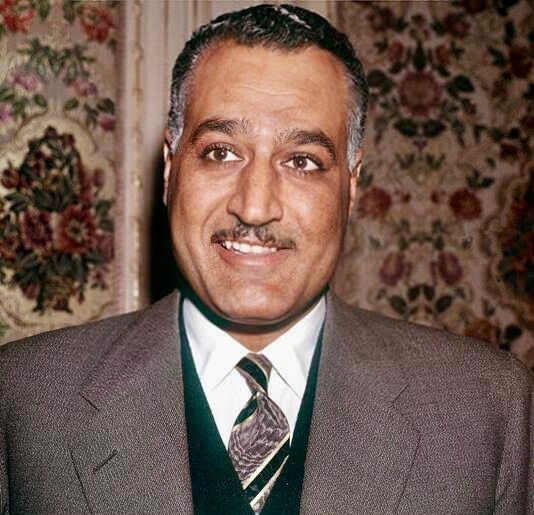 Gamal_Abdel_Nasser_1958 Gamal Abdel Nasser Arab nationalism, a movement toward liberating and empowering the Arab peoples of the Middle East, emerged during the late 19th century, inspired by other independence movements of the 18th and 19th centuries. As the Ottoman Empire declined and the Middle East was carved up by the Great Powers of Europe, Arabs sought to establish their own independent nations ruled by Arabs, rather than foreigners. Syria was established in 1920; Transjordan (later Jordan) gradually gained independence between 1921 and 1946; Saudi Arabia was established in 1932; and Egypt achieved gradually gained independence between 1922 and 1952. The Arab League was established in 1945 to promote Arab interests and cooperation between the new Arab states. The Zionist movement, emerged among European Jews in the 19th century. In 1882, Jews, from Europe, began to emigrate to Ottoman Palestine with the goal of establishing a new Jewish homeland. The majority and local population in Palestine, Palestinian Arabs were demanding independence from the British Mandate. Breakup of Yugoslavia Main article: Breakup of Yugoslavia This section has multiple issues. Please help improve it or discuss these issues on the talk page. (Learn how and when to remove these template messages) This section possibly contains original research. (March 2023) This section needs additional citations for verification. (March 2023) There was a rise in extreme nationalism after the Revolutions of 1989 had triggered the collapse of communism in the 1990s. That left many people with no identity. The people under communist rule had to integrate, but they now found themselves free to choose. That made long-dormant conflicts rise and create sources of serious conflict.[135] When communism fell in Yugoslavia, serious conflict arose, which led to a rise in extreme nationalism. In his 1992 article Jihad vs. McWorld, Benjamin Barber proposed that the fall of communism would cause large numbers of people to search for unity and that small-scale wars would become common, as groups will attempt to redraw boundaries, identities, cultures and ideologies.[136] The fall of communism also allowed for an "us vs. them" mentality to return.[137] Governments would become vehicles for social interests, and the country would attempt to form national policies based on the majority culture, religion or ethnicity.[135] Some newly sprouted democracies had large differences in policies on matters, which ranged from immigration and human rights to trade and commerce. The academic Steven Berg felt that the root of nationalist conflicts was the demand for autonomy and a separate existence.[135] That nationalism can give rise to strong emotions, which may lead to a group fighting to survive, especially as after the fall of communism, political boundaries did not match ethnic boundaries.[135] Serious conflicts often arose and escalated very easily, as individuals and groups acted upon their beliefs and caused death and destruction.[135] When that happens, states unable to contain the conflict run the risk of slowing their progress at democratization. Yugoslavia was established after the First World War and joined three acknowledged ethnic groups: Serbs, Croats and Slovenes. The national census numbers from 1971 to 1981 measured an increase from 1.3% to 5.4% in the population that ethnically identified itself as Yugoslavs.[138] That meant that the country, almost as a whole, was divided by distinctive religious, ethnic and national loyalties after nearly 50 years. Nationalist separatism of Croatia and Slovenia from the rest of Yugoslavia has basis in historical imperialist conquests of the region (Austria-Hungary and Ottoman Empire) and existence within separate spheres of religious, cultural and industrial influence – Catholicism, Protenstantism, Central European cultural orientation in the northwest, versus Orthodoxy, Islam and Orientalism in the southeast. Croatia and Slovenia were subsequently more economically and industrially advanced and remained as such throughout existence of both forms of Yugoslavia.[137] In the 1970s, the leadership of the separate territories in Yugoslavia protected only territorial interests, at the expense of other territories. In Croatia, there was almost a split within the territory between Serbs and Croats so that any political decision would kindle unrest, and tensions could cross adjacent territories: Bosnia and Herzegovina.[138] Bosnia had no group with a majority; Muslim, Serb, Croat, and Yugoslavs stopped leadership from advancing here either. Political organizations were not able to deal successfully with such diverse nationalisms. Within the territories, leaderships would not compromise. To do so would create a winner in one ethnic group and a loser in another and raise the possibility of a serious conflict. That strengthened the political stance promoting ethnic identities and caused intense and divided political leadership within Yugoslavia. 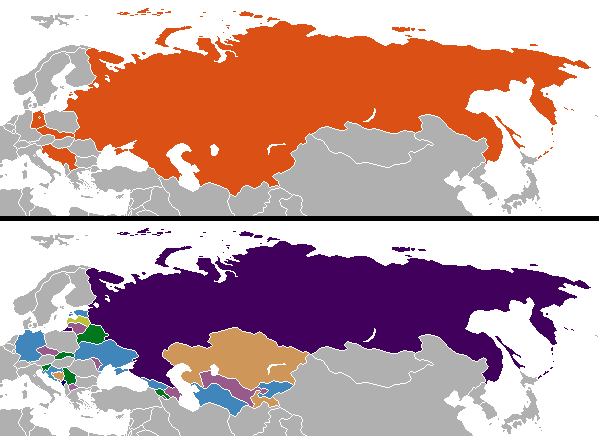 Changes in national boundaries in post-Soviet and post-Yugoslav states after the revolutions of 1989 were followed by a resurgence of nationalism. In the 1980s, Yugoslavia began to break into fragments.[136] Economic conditions within Yugoslavia were deteriorating. Conflict in the disputed territories was stimulated by the rise in mass nationalism and ethnic hostilities.[138] The per capita income of people in the northwestern territory, encompassing Croatia and Slovenia, was several times higher than that of the southern territory. That, combined with escalating violence from ethnic Albanians and Serbs in Kosovo, intensified economic conditions.[138] The violence greatly contributed to the rise of extreme nationalism of Serbs in Serbia and the rest of Yugoslavia. The ongoing conflict in Kosovo was propagandized by a communist Serb, Slobodan Milošević, to increase Serb nationalism further. As mentioned, that nationalism gave rise to powerful emotions which grew the force of Serbian nationalism by highly nationalist demonstrations in Vojvodina, Serbia, Montenegro, and Kosovo. Serbian nationalism was so high that Slobodan Milošević ousted leaders in Vojvodina and Montenegro, repressed Albanians within Kosovo and eventually controlled four of the eight regions/territories.[138] Slovenia, one of the four regions not under communist control, favoured a democratic state. In Slovenia, fear was mounting because Milošević would use the militia to suppress the country, as had occurred in Kosovo.[138] Half of Yugoslavia wanted to be democratic, the other wanted a new nationalist authoritarian regime. In fall of 1989, tensions came to a head, and Slovenia asserted its political and economic independence from Yugoslavia and seceded. In January 1990, there was a total break with Serbia at the League of Communists of Yugoslavia, an institution that had been conceived by Milošević to strengthen unity and later became the backdrop for the fall of communism in Yugoslavia. In August 1990, a warning to the region was issued when ethnically divided groups attempted to alter the government structure. The republic borders established by the Communist regime in the postwar period were extremely vulnerable to challenges from ethnic communities. Ethnic communities arose because they did not share the identity with everyone within the new post-communist borders,[138] which threatened the new governments. The same disputes were erupting that were in place prior to Milošević and were compounded by actions from his regime. Also, within the territory, the Croats and the Serbs were in direct competition for control of government. Elections were held and increased potential conflicts between Serbian and Croat nationalism. Serbia wanted to be separate and to decide its own future based on its own ethnic composition, but that would then give Kosovo encouragement to become independent from Serbia. Albanians in Kosovo were already practically independent from Kosovo, but Serbia did not want to let Kosovo become independent. Albanian nationalists wanted their own territory, but that would require a redrawing of the map and threaten neighboring territories. When communism fell in Yugoslavia, serious conflict arose, which led to the rise in extreme nationalism. Nationalism again gave rise to powerful emotions, which evoked, in some extreme cases, a willingness to die for what one believed, a fight for the survival of the group.[135] The end of communism began a long period of conflict and war for the region. For six years, 200,000–500,000 people died in the Bosnian War.[139] All three major ethnicities in Bosnia and Herzegovina (Bosnian Muslims, Croats, Serbs) suffered at the hands of each other.[137][verification needed] The war garnered assistance from groups, Muslim, Orthodox, and Western Christian, and from state actors, which supplied all sides; Saudi Arabia and Iran supported Bosnia; Russia supported Serbia; Central European and the West, including the US, supported Croatia; and the Pope supported Slovenia and Croatia. |
20世紀 中国 主な記事 中国のナショナリズム アジア全域でナショナリズムが目覚め、アジア大陸の歴史が形成された。重要なエピソードは、1905年にロシアが日本に決定的な敗北を喫したことである。 この敗戦は、トルコやペルシャだけでなく、中国でもナショナリズムへの新たな関心を急速に高めるきっかけとなった[125]。中国では孫文(1866- 1925)が、部外者によって運営されていた老朽化した帝国に反抗して、国民党という新党を立ち上げた。国民党の新兵はこう誓った: [この瞬間から、私は古いものを破壊し、新しいものを建設し、人民の自決のために戦い、中華民国の支持と三原則による民主主義の実現のため に、......善政の進展、人民の幸福と恒久の平和のために、そして全世界の平和の名において国家の基盤を強化するために、全力を傾ける」[126]。 国民党は、1949年に共産党が政権を奪取するまで、中国をほぼ支配していた。しかし共産党もまた、孫のナショナリズムや1919年の五・四運動から強い 影響を受けていた。五・四運動は中国国内の後進性に対する全国的な抗議運動であり、しばしば中国共産党の知的基盤として描かれてきた。歴史家のパトリシ ア・エブリーは言う: ナショナリズム、愛国主義、進歩、科学、民主主義、自由が目標であり、帝国主義、封建主義、軍閥主義、独裁主義、家父長制、伝統への盲目的な固執が敵で あった。知識人たちは、いかにして強く近代的でありながら中国的であるか、いかにして競合する国家がひしめく世界で政治的実体としての中国を維持するかに 苦闘した[128]。 ギリシャ 主な記事 ギリシャナショナリズム エノーシス(民族的にギリシャの国家とヘレニズム共和国を統合し、統一ギリシャ国家を建設すること)を主張するギリシャのナショナリズム的民族解放運動 は、今 日、キプロスのケースで使用されており、また、オスマン帝国からギリシャの祖先の土地を再征服することを主張したギリシャの運動であるメガリ・イデア(ク レタ島など、 19世紀末から20世紀初頭にかけて盛んに行われた、イオニア、ポントス、北エピルス、カッパドキア、トラキアなどのギリシャの先祖伝来の土地のオスマン 帝国からの奪還を主張するギリシャ運動は、多くのギリシャの国家や民族的にギリシャ的な地域を最終的にギリシャに統合させ、1919年のギリシャ・トルコ 戦争につながった。 8月4日政権は、ムッソリーニのファシスト・イタリアとヒトラーのドイツに影響を受けたファシストまたはファシズムナショナリズムの権威主義独裁政権であ り、 1936年から1941年に死去するまでギリシャの将軍イオアニス・メタクサスに率いられた。第3次ヘレニズム文明を提唱し、それぞれ古代ギリシャとビザ ンチン帝国であった第1次、第2次ギリシャ文明の後継となる文化的に優れたギリシャ文明を提唱した。ギリシャの伝統、民族音楽、舞踊、古典主義、中世主義 を奨励した。 アフリカ 主な記事 アフリカナショナリズム、アフリカ史  ザンビアの反植民地政治指導者ケネス・カウンダ(1960年、植民地時代の北ローデシア(現ザンビア)でのナショナリズム集会にて)。 1880年代、ヨーロッパ列強はアフリカのほぼ全域を分割した(独立したのはエチオピアとリベリアのみ)。第二次世界大戦後、ナショナリズムの勢力が非常 に強くなるまで、彼らはアフリカを支配した。1950年代から1960年代にかけて、植民地は独立国家となった。その過程は通常平和的であったが、アル ジェリア[129]、ケニア[130]などのように、長く苦しい血なまぐさい内戦が何度か起こった。 アフリカ全土において、ナショナリズムは、原住民が世界大戦中にイギリス軍やフランス軍、その他の軍隊で学んだ組織的スキルを活用した。それは、植民地勢 力にも、植民地勢力と協力してきた伝統的な地元の権力機構にも支配されず、支持されない組織を生み出した。ナショナリズム的組織は、伝統的な植民地構造と 新しい 植民地構造の両方に挑戦し始め、ついにはそれらを駆逐した。ナショナリズム運動の指導者たちは、ヨーロッパ当局が撤退すると、その支配権を握った。これら の構造には、政治、教育、宗教、その他の社会組織が含まれる。ここ数十年で、多くのアフリカ諸国はナショナリズム的熱狂の勝利と敗北を経験し、その過程で 中央集 権的な国家権力と愛国的国家の所在が変化した[131][132][133]。 イギリスの植民地であった南アフリカは、1931年までに事実上独立したという点で例外的であった。1948年以降、アパルトヘイトとして知られる人種隔 離と少数派の白人支配に重点を置く白人アフリカーナーナショナリズム者によって支配された。アパルトヘイトは1994年に多民族選挙が実施されるまで続い た。国 際的な反アパルトヘイト運動は、成功を収めるまで黒人ナショナリストを支援し[要検証]、ネルソン・マンデラが大統領に選出された[134]。 中東  Gamal_Abdel_Nasser_1958 ガマル・アブデル・ナセル アラブナショナリズムは、中東のアラブ民族を解放し、力を与えようとする運動であり、18世紀と19世紀の他の独立運動に触発されて、19世紀後半に出現 した。 オスマン帝国が衰退し、中東がヨーロッパの大国によって切り分けられると、アラブ人は外国人ではなくアラブ人が統治する独立国家の樹立を目指した。シリア は1920年に設立され、トランスヨルダン(後のヨルダン)は1921年から1946年にかけて徐々に独立を果たし、サウジアラビアは1932年に設立さ れ、エジプトは1922年から1952年にかけて徐々に独立を果たした。アラブ連盟はアラブの利益と新しいアラブ諸国間の協力を促進するために1945年 に設立された。 シオニズム運動は、19世紀にヨーロッパのユダヤ人の間で生まれた。1882年、ヨーロッパからユダヤ人が新しいユダヤ人の祖国を建設する目的でオスマ ン・パレスチナへの移住を開始した。パレスチナの地元住民であるパレスチナ・アラブ人は、イギリス委任統治からの独立を要求していた。 ユーゴスラビア解体 主な記事 ユーゴスラビア解体 このセクションには複数の問題があります。改善するか、トークページで議論してください。(このテンプレートメッセージを削除する方法とタイミングを学 ぶ) このセクションにはオリジナルの研究が含まれている可能性があります。(2023年3月) このセクションは検証のために追加の引用が必要です。(2023年3月) 1989年の革命が1990年代の共産主義崩壊の引き金となった後、極端なナショナリズムが台頭した。その結果、多くの人々がアイデンティティを失った。 共産主義の支配下にあった人々は統合しなければならなかったが、今では自由に選択できるようになった。ユーゴスラビアで共産主義が崩壊すると、深刻な紛争 が発生し、極端なナショナリズムが台頭した。 ベンジャミン・バーバーは1992年の論文『ジハードvs.マクワールド』の中で、共産主義の崩壊によって大勢の人々が結束を求めるようになり、集団が境 界線、アイデンティティ、文化、イデオロギーを引き直そうとするため、小規模な戦争が一般的になると提案している[136]。政府は社会的利害のための手 段となり、国は多数派の文化、宗教、民族性に基づいた国家政策を形成しようとするようになる。 学者であるスティーブン・バーグは、ナショナリズムによる紛争の根源は、自治と独立した存在の要求であると感じていた[135]。ナショナリズムは強い感 情を生む可能性があり、それが集団が生き残るために戦うことにつながる可能性がある。 ユーゴスラビアは第一次世界大戦後に建国され、3つの民族集団が加盟した: セルビア人、クロアチア人、スロベニア人である。1971年から1981年にかけての国勢調査では、民族的にユーゴスラビア人であると自認する人口が 1.3%から5.4%へと増加した[138]。これは、ほぼ全体として、50年近く経った後に、この国が独特の宗教的、民族的、国家的忠誠心によって分断 されたことを意味する。 クロアチアとスロベニアのユーゴスラビアの他の地域からのナショナリズム的分離主義は、この地域の歴史的な帝国主義的征服(オーストリア=ハンガリーとオ スマン 帝国)と、宗教的、文化的、産業的影響力の別々の圏内での存在(北西部ではカトリック、プロテンスタンティズム、中央ヨーロッパ文化志向、南東部では正 教、イスラム教、オリエンタリズム)に基礎を置く。クロアチアとスロヴェニアはその後、より経済的、工業的に発展し、ユーゴスラヴィアの両形態が存在する 間、その状態を維持した[137]。 1970年代、ユーゴスラビアの分離した領土の指導者たちは、他の領土を犠牲にして領土の利益のみを保護した。クロアチアでは、セルビア人とクロアチア人 の間で領土内がほぼ分裂していたため、政治的な決定があれば動揺を呼び起こし、緊張が隣接する領土に及ぶ可能性があった: ボスニア・ヘルツェゴビナには多数派を占めるグループはなく、イスラム教徒、セルビア人、クロアチア人、ユーゴスラビア人が、ここでも指導者の進出を阻止 した。政治組織はこのような多様なナショナリズムにうまく対処することができなかった。領土内では、指導者たちは妥協しようとしなかった。妥協すれば、あ る民族に勝者が生まれ、別の民族に敗者が生まれ、深刻な紛争に発展する可能性が高まるからだ。そのため、民族のアイデンティティを推進する政治姿勢が強ま り、ユーゴスラビア国内では政治指導部が激しく分裂することになった。  1989年の革命後、ポスト・ソビエトおよびポスト・ユーゴスラビア諸国における国境線の変化は、ナショナリズムの復活に続いた。 1980年代、ユーゴスラビアは分裂し始めた[136]。クロアチアとスロベニアを含む北西部領土の人々の一人当たりの所得は、南部領土のそれよりも数倍 高かった[138]。この暴力はセルビアとユーゴスラビアの他の地域におけるセルビア人の極端なナショナリズムの台頭に大きく貢献した。コソボで進行中の 紛争は、セルビア人のナショナリズムをさらに高めるために、共産主義者のセルビア人、スロボダン・ミロシェヴィッチによって宣伝された。前述のように、こ のナショナリズムは強力な感情を生み、ヴォイヴォディナ、セルビア、モンテネグロ、コソボでナショナリズム的なデモが行われ、セルビア人ナショナリズムの 勢力を 拡大した。セルビア人のナショナリズムは非常に高まり、スロボダン・ミロシェヴィッチはヴォイヴォディナとモンテネグロの指導者を追放し、コソヴォ内のア ルバニア人を弾圧し、最終的に8つの地域/領土のうち4つを支配した[138]。共産主義の支配下になかった4つの地域の1つであるスロヴェニアは民主主 義国家を支持した。 スロヴェニアでは、ミロシェヴィッチがコソヴォで起きたように民兵を使って国を抑圧するのではないかという恐怖が高まっていた[138]。ユーゴスラヴィ アの半分は民主化を望み、もう半分は新たなナショナリズム的権威主義体制を望んでいた。1989年秋、緊張が頂点に達し、スロベニアはユーゴスラビアから の政治 的・経済的独立を主張し、分離独立した。1990年1月、ミロシェヴィッチが団結強化のために構想し、後にユーゴスラビア共産主義崩壊の背景となったユー ゴスラビア共産主義者同盟で、セルビアとの全面的な断絶が起こった。 1990年8月、民族的に分裂したグループが政府機構を変更しようとしたため、この地域に警告が発せられた。戦後、共産主義政権によって確立された共和国 の国境は、民族共同体からの挑戦に対して極めて脆弱であった。民族共同体は、共産主義後の新しい国境内のすべての人とアイデンティティを共有していなかっ たために発生し[138]、新政府を脅かした。ミロシェヴィッチ以前と同じ紛争が勃発し、ミロシェヴィッチ政権の行動によってさらに悪化した。 また領土内では、クロアチア人とセルビア人が政府の支配権をめぐって直接競争していた。選挙が実施され、セルビア人とクロアチア人のナショナリズムの潜在 的な対立が激化した。セルビアは分離独立を望み、自国の民族構成に基づいて自国の将来を決めたかったが、それではコソボにセルビアからの独立を促すことに なる。コソボのアルバニア人はすでにコソボから実質的に独立していたが、セルビアはコソボを独立させたくなかった。アルバニアのナショナリズム者たちは自 分たち の領土を望んでいたが、そのためには地図を引き直す必要があり、近隣の領土を脅かすことになる。ユーゴスラビアで共産主義が崩壊すると、深刻な対立が生 じ、極端なナショナリズムが台頭した。 ナショナリズムは再び強力な感情を呼び起こし、極端な場合には、自分の信じるもののために死のうとする気持ち、集団の存続のための戦いを呼び起こした [135]。共産主義の終焉は、この地域にとって長い紛争と戦争の時代を始めた。ボスニア・ヘルツェゴビナの3つの主要民族(ボスニア・ムスリム、クロア チア人、セルビア人)は互いに苦しめられた[137][要検証]。サウジアラビアとイランはボスニアを支援し、ロシアはセルビアを支援し、中央ヨーロッパ とアメリカを含む西側諸国はクロアチアを支援し、ローマ教皇はスロベニアとクロアチアを支援した。 |
| 21st century Main article: Neo-nationalism The rise of globalism in the late 20th century led to a rise in nationalism and populism in Europe and North America. That trend was further fueled by increased terrorism in the West (the September 11 attacks in the United States being a prime example), increasing unrest and civil wars in the Middle East, and waves of Muslim refugees, especially from the Syrian Civil War, flooding into Europe (as of 2016 the refugee crisis appears to have peaked).[140][141] Nationalist groups like Germany's Pegida, France's National Front and the UK Independence Party gained prominence in their respective nations advocating restrictions on immigration to protect the local populations.[142][143] Since 2010, Catalan nationalists have led a renewed Catalan independence movement and declared Catalan independence. The movement has been opposed by Spanish nationalists.[144][145] In the 2010s, the Greek economic crisis and waves of immigration have led to a significant rise of Fascism and Greek nationalism across Greece, especially among the youth.[146] In Russia, exploitation of nationalist sentiments allowed Vladimir Putin to consolidate power.[147] This nationalist sentiment was used in Russia's annexation of Crimea in 2014 and other actions in Ukraine.[143] Nationalist movements gradually began to rise in Central Europe as well, particularly Poland, under the influence of the ruling party, Law and Justice (led by Jarosław Kaczyński).[148] In Hungary, the anti-immigration rhetoric and stance against foreign influence is a powerful national glue promoted the ruling Fidesz party (led by Viktor Orbán).[149] Nationalist parties have also joined governing coalitions in Bulgaria,[150] Slovakia,[151] Latvia[152] and Ukraine.[153] In India, Hindu nationalism has grown in popularity with the rise of the Bharatiya Janata Party, a right-wing party which has been ruling India at the national level since 2014.[154][155] The rise in religious nationalism comes with the rise of right-wing populism in India, with the election and re-election of populist leader Narendra Modi as Prime Minister, who promised economic prosperity for all and an end to corruption. Militant Buddhist nationalism is also on the rise in Myanmar, Thailand and Sri Lanka.[156][157] In Japan, nationalist influences in the government developed over the course of the early 21st century, largely from the far right[158][159][160] ultra-conservative[161][162][163] Nippon Kaigi organization.[164] The new movement has advocated re-establishing Japan as a military power and pushed revisionist historical narratives denying events such as the Nanking Massacre.[164] A referendum on Scottish independence from the United Kingdom was held on 18 September 2014. The proposal was defeated, with 55.3% voting against independence. In a 2016 referendum, the British populace unexpectedly voted to withdraw the United Kingdom from the European Union (known as Brexit). As the promise of continued European Union membership was a core feature of the anti-independence campaign during the Scottish referendum, there have been calls for a second referendum on Scottish independence.[165] 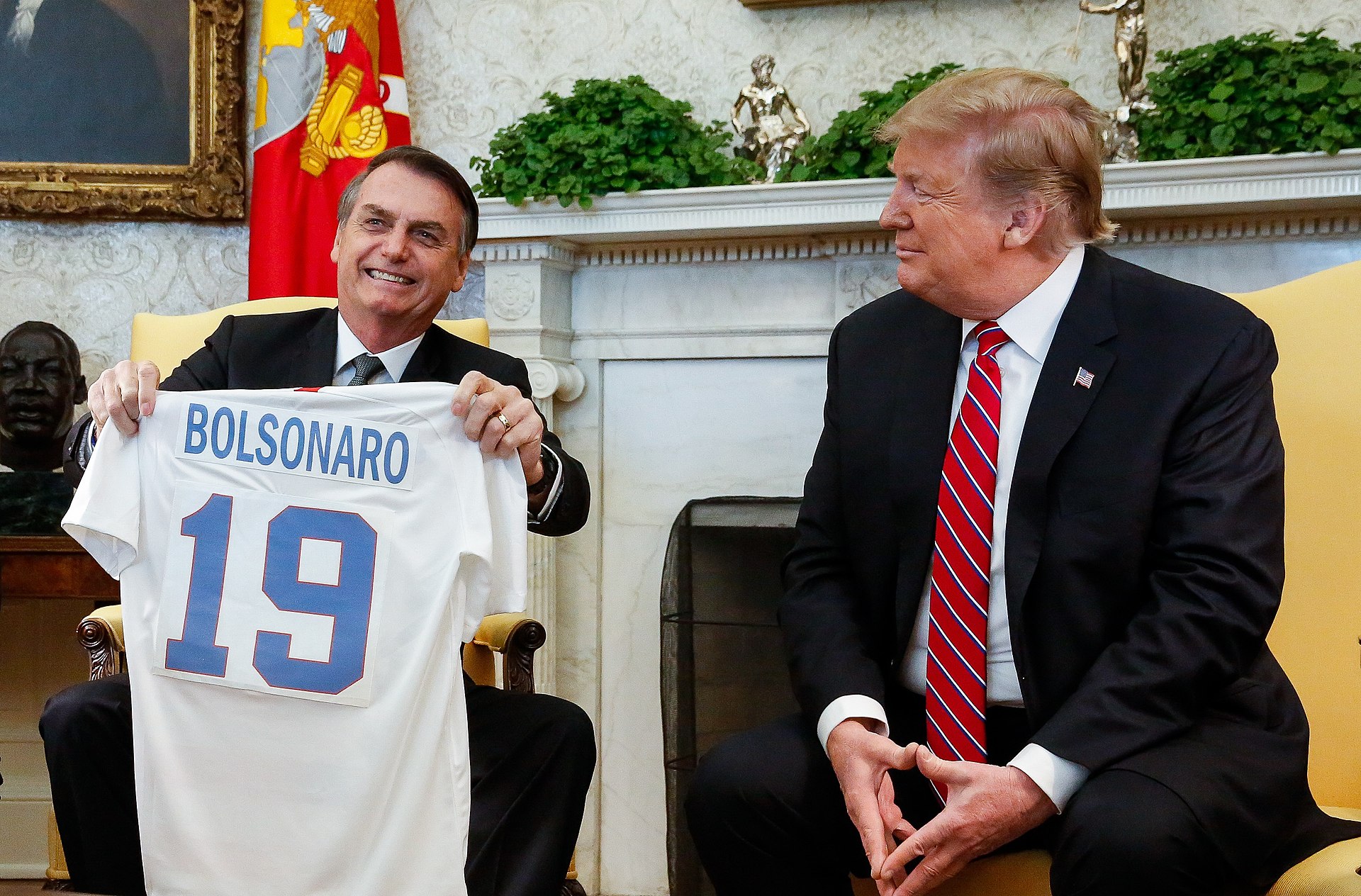 Brazilian Former President Jair Bolsonaro, sometimes called the "Tropical Trump", with United States President Donald Trump The 2016 United States presidential campaign saw the unprecedented rise of Donald Trump, a businessman with no political experience who ran on a populist/nationalist platform and struggled to gain endorsements from mainstream political figures, even within his own party. Trump's slogans "Make America Great Again" and "America First" exemplified his campaign's repudiation of globalism and its staunchly nationalistic outlook. His unexpected victory in the election was seen as part of the same trend that had brought about the Brexit vote.[166] On 22 October 2018, two weeks before the mid-term elections President Trump openly proclaimed that he was a nationalist to a cheering crowd at a rally in Texas in support of re-electing Senator Ted Cruz who was once an adversary.[167] On 29 October 2018 Trump equated nationalism to patriotism, saying "I'm proud of this country and I call that ''nationalism.''[168] In 2016, Rodrigo Duterte became president of the Philippines running a distinctly nationalist campaign. Contrary to the policies of his recent predecessors, he distanced the country from the Philippines' former ruler, the United States, and sought closer ties with China (as well as Russia).[169] In 2017, Turkish nationalism propelled President Recep Tayyip Erdoğan to gain unprecedented power in a national referendum.[170] Reactions from world leaders were mixed, with Western European leaders generally expressing concern[171] while the leaders of many of the more authoritarian regimes as well as President Trump offered their congratulations.[172] |
21世紀 主な記事 ネオ・ナショナリズム 20世紀後半におけるグローバリズムの台頭は、ヨーロッパと北米におけるナショナリズムとポピュリズムの台頭をもたらした。この傾向は、西側諸国における テロの増加(アメリカにおける9.11同時多発テロがその代表例)、中東における不安と内戦の増加、そして特にシリア内戦からのイスラム教徒の難民の波が ヨーロッパに押し寄せたことによってさらに拍車がかかった(2016年現在、難民危機はピークに達したように見える)[140][141]。 ドイツのペギーダ、フランスの国民戦線、イギリスの独立党のようなナショナリスト集団は、地元住民を保護するために移民の制限を提唱し、それぞれの国で注 目を集めた[142][143]。 2010年以降、カタルーニャのナショナリストたちはカタルーニャ独立運動を再び主導し、カタルーニャ独立を宣言した。この運動はスペインのナショナリス トたちによって反対されている[144][145]。 2010年代、ギリシャの経済危機と移民の波によって、ギリシャ全土、特に若者の間でファシズムとギリシャ・ナショナリズムが著しく台頭した[146]。 ロシアでは、ナショナリズム感情の利用によってウラジーミル・プーチンが権力を強化することができた[147]。このナショナリズム感情は、2014年の ロシアのクリミア併合やウクライナにおけるその他の行動で利用された[143]。中央ヨーロッパでも、特にポーランドでは、与党「法と正義」(ヤロスワ フ・カチンスキ率いる)の影響下で、ナショナリズム運動が徐々に台頭し始めた。 [148]。ハンガリーでは、反移民のレトリックと外国からの影響に反対する姿勢は、与党フィデス党(ヴィクトル・オルバン率いる)の強力な国民的接着剤 となっている[149]。ブルガリア[150]、スロバキア[151]、ラトビア[152]、ウクライナでもナショナリズム政党が政権連合に参加している [153]。 インドでは、ヒンドゥー教ナショナリズムが、2014年以来インドを国政レベルで支配している右派政党であるバラティヤ・ジャナタ党の台頭とともに人気を 高めている[154][155]。宗教ナショナリズムの台頭は、インドにおける右派ポピュリズムの台頭に伴うものであり、ポピュリストの指導者であるナレ ンドラ・モディが首相に選出・再選され、万人のための経済的繁栄と汚職の撲滅を約束した。ミャンマー、タイ、スリランカでも過激な仏教ナショナリズムが台 頭している[156][157]。 日本では、政府におけるナショナリストの影響が21世紀初頭にかけて発展し、主に極右[158][159][160]の超保守的な[161][162] [163]組織である日本会議から影響を受けた。この新しい動きは、日本を軍事大国として再確立することを提唱し、南京大虐殺のような出来事を否定する歴 史修正主義的な物語を推し進めてきた[164]。 2014年9月18日、イギリスからのスコットランド独立を問う住民投票が実施された。55.3%が独立に反対し、提案は否決された。2016年の国民投 票では、イギリス国民は予想に反してイギリスを欧州連合(EU)から脱退させることに投票した(ブレグジットとして知られる)。スコットランドの住民投票 では、EU加盟継続の約束が独立反対キャンペーンの中心的な特徴であったため、スコットランド独立に関する2度目の住民投票を求める声が上がっている [165]。  「熱帯のトランプ」と呼ばれることもあるブラジルのジャイル・ボルソナロ前大統領とアメリカのドナルド・トランプ大統領 2016年のアメリカ大統領選挙では、政治経験のない実業家ドナルド・トランプが前例のない台頭を見せた。彼はポピュリスト/ナショナリストを掲げて出馬 し、自党内でさえ主流の政治家から支持を得るのに苦労した。トランプ氏のスローガン「アメリカを再び偉大に」「アメリカ第一主義」は、グローバリズムの否 定と強固なナショナリズムを象徴するものだった。選挙での彼の予想外の勝利は、ブレグジット投票をもたらしたのと同じ傾向の一部と見なされていた [166]。 中間選挙の2週間前の2018年10月22日、トランプ大統領は、かつて敵対していたテッド・クルーズ上院議員の再選を支持するテキサス州での集会で、喝 采を浴びる群衆に自分がナショナリストであることを公然と宣言した[167]。 2018年10月29日、トランプはナショナリズムを愛国主義と同一視し、「私はこの国を誇りに思っており、それを''ナショナリズム''と呼んでいる」 と述べた[168]。 2016年、ロドリゴ・ドゥテルテはフィリピンの大統領に就任し、明確なナショナリズムを掲げた選挙戦を展開した。最近の前任者たちの政策に反して、彼は フィリピンの前支配者であるアメリカからフィリピンを遠ざけ、中国(およびロシア)との緊密な関係を求めた[169]。 2017年、トルコのナショナリズムはレジェップ・タイイップ・エルドアン大統領を国民投票で前代未聞の権力を獲得させた[170]。 世界の指導者たちの反応はまちまちで、西ヨーロッパの指導者たちは概して懸念を表明し[171]、一方、より権威主義的な政権の多くやトランプ大統領の指 導者たちは祝意を表明した[172]。 |
| Political science Many political scientists have theorized about the foundations of the modern nation-state and the concept of sovereignty. The concept of nationalism in political science draws from these theoretical foundations. Philosophers like Machiavelli, Locke, Hobbes, and Rousseau conceptualized the state as the result of a "social contract" between rulers and individuals.[173] Max Weber provides the most commonly used definition of the state, "that human community which successfully lays claim to the monopoly of legitimate physical violence within a certain territory".[174] According to Benedict Anderson, nations are "Imagined Communities", or socially constructed institutions.[175] Many scholars have noted the relationship between state-building, war, and nationalism. John Etherington argues nationalism is inherently exclusionary and thus potentially violent,[176] while Jeffrey Herbst posits that external threats can foster nationalist sentiment: "External threats have such a powerful effect on nationalism because people realize in a profound manner that they are under threat because of who they are as a nation; they are forced to recognize that it is only as a nation that they can successfully defeat the threat".[177] With increased external threats, the state's extractive capacities increase. He links the lack of external threats to countries in Sub-Saharan Africa, post-independence, to weak state nationalism and state capacity.[177] Barry Posen argues that nationalism increases the intensity of war, and that states deliberately promote nationalism with the aim of improving their military capabilities.[178] Most new nation-states since 1815 have emerged through decolonization.[40] Adria Lawrence has argued that nationalism in the colonial world was spurred by failures of colonial powers to extend equal political rights to the subjects in the colonies, thus prompting them to pursue independence.[179] Michael Hechter has argued similarly that "peripheral nationalisms" formed when empires prevented peripheral regions from having autonomy and local rule.[180] |
政治科学 多くの政治学者が、近代国民国家の基礎と主権の概念について理論化してきた。政治学におけるナショナリズムの概念は、こうした理論的基盤から導き出された ものである。マキャベリ、ロック、ホッブズ、ルソーのような哲学者は国家を支配者と個人の間の「社会契約」の結果として概念化している[173]。マック ス・ウェーバーは国家について最も一般的に使用されている定義を提示しており、「一定の領土内で合法的な物理的暴力の独占を成功裏に主張する人間共同体」 [174]である。ベネディクト・アンダーソンによれば、国家は「想像された共同体」、すなわち社会的に構築された制度である[175]。 多くの学者が国家建設、戦争、ナショナリズムの関係を指摘している。ジョン・エザリントンは、ナショナリズムは本質的に排他的であり、したがって潜在的に 暴力的であると主張し[176]、ジェフリー・ハーブストは、外的脅威がナショナリズム感情を助長する可能性があると仮定している: 「外的脅威がナショナリズムに強力な影響を与えるのは、人々が、自分たちが国家であるがゆえに脅威にさらされていることを深く認識するからであり、脅威を うまく打ち負かすことができるのは国家としてのみであることを認識せざるを得ないからである」[177]。バリー・ポーゼンは、ナショナリズムは戦争の激 しさを増大させ、国家は軍事力を向上させる目的で意図的にナショナリズムを推進すると論じている[178]。 アドリア・ローレンスは、植民地世界におけるナショナリズムは、植民地の臣民に平等な政治的権利を与えることができなかった植民地大国の失敗によって拍車 がかかり、その結果、臣民は独立を追求するようになったと主張している[179]。 マイケル・ヘクターも同様に、帝国が周辺地域の自治と地方支配を妨げたときに「周辺ナショナリズム」が形成されたと主張している[180]。 |
| Sociology The sociological or modernist interpretation of nationalism and nation-building argues that nationalism arises and flourishes in modern societies that have an industrial economy capable of self-sustainability, a central supreme authority capable of maintaining authority and unity, and a centralized language understood by a community of people.[181] Modernist theorists note that this is only possible in modern societies, while traditional societies typically lack the prerequisites for nationalism. They lack a modern self-sustainable economy, have divided authorities, and use multiple languages resulting in many groups being unable to communicate with each other.[181] Prominent theorists who developed the modernist interpretation of nations and nationalism include: Carlton J. H. Hayes, Henry Maine, Ferdinand Tönnies, Rabindranath Tagore, Émile Durkheim, Max Weber, Arnold Joseph Toynbee and Talcott Parsons.[181] In his analysis of the historical changes and development of human societies, Henry Maine noted that the key distinction between traditional societies defined as "status" societies based on family association and functionally diffuse roles for individuals and modern societies defined as "contract" societies where social relations are determined by rational contracts pursued by individuals to advance their interests. Maine saw the development of societies as moving away from traditional status societies to modern contract societies.[182] In his book Gemeinschaft und Gesellschaft (1887), Ferdinand Tönnies defined a Gemeinschaft ("community") as being based on emotional attachments as attributed with traditional societies while defining a Gesellschaft ("society") as an impersonal society that is modern. Although he recognized the advantages of modern societies, he also criticized them for their cold and impersonal nature that caused alienation while praising the intimacy of traditional communities.[182] Émile Durkheim expanded upon Tönnies' recognition of alienation and defined the differences between traditional and modern societies as being between societies based upon "mechanical solidarity" versus societies based on "organic solidarity".[182] Durkheim identified mechanical solidarity as involving custom, habit, and repression that was necessary to maintain shared views. Durkheim identified organic solidarity-based societies as modern societies where there exists a division of labour based on social differentiation that causes alienation. Durkheim claimed that social integration in traditional society required authoritarian culture involving acceptance of a social order. Durkheim claimed that modern society bases integration on the mutual benefits of the division of labour, but noted that the impersonal character of modern urban life caused alienation and feelings of anomie.[182] Max Weber claimed the change that developed modern society and nations is the result of the rise of a charismatic leader to power in a society who creates a new tradition or a rational-legal system that establishes the supreme authority of the state. Weber's conception of charismatic authority has been noted as the basis of many nationalist governments.[182] Primordialist evolutionary interpretation The primordialist perspective is based upon evolutionary theory.[183][184] This approach has been popular with the general public but is typically rejected by experts. Laland and Brown report that "the vast majority of professional academics in the social sciences not only ... ignore evolutionary methods but in many cases [are] extremely hostile to the arguments" that draw vast generalizations from rather limited evidence.[185] The evolutionary theory of nationalism perceives nationalism to be the result of the evolution of human beings into identifying with groups, such as ethnic groups, or other groups that form the foundation of a nation.[183] Roger Masters in The Nature of Politics describes the primordial explanation of the origin of ethnic and national groups as recognizing group attachments that are thought to be unique, emotional, intense, and durable because they are based upon kinship and promoted along lines of common ancestry.[186] The primordialist evolutionary views of nationalism often reference the evolutionary theories of Charles Darwin as well as Social Darwinist views of the late nineteenth century. Thinkers like Herbert Spencer and Walter Bagehot reinterpreted Darwin's theory of natural selection "often in ways inconsistent with Charles Darwin's theory of evolution" by making unsupported claims of biological difference among groups, ethnicities, races, and nations.[187] Modern evolutionary sciences have distanced themselves from such views, but notions of long-term evolutionary change remain foundational to the work of evolutionary psychologists like John Tooby and Leda Cosmides.[188] Approached through the primordialist perspective, the example of seeing the mobilization of a foreign military force on the nation's borders may provoke members of a national group to unify and mobilize themselves in response.[189] There are proximate environments where individuals identify nonimmediate real or imagined situations in combination with immediate situations that make individuals confront a common situation of both subjective and objective components that affect their decisions.[190] As such proximate environments cause people to make decisions based on existing situations and anticipated situations.[190] 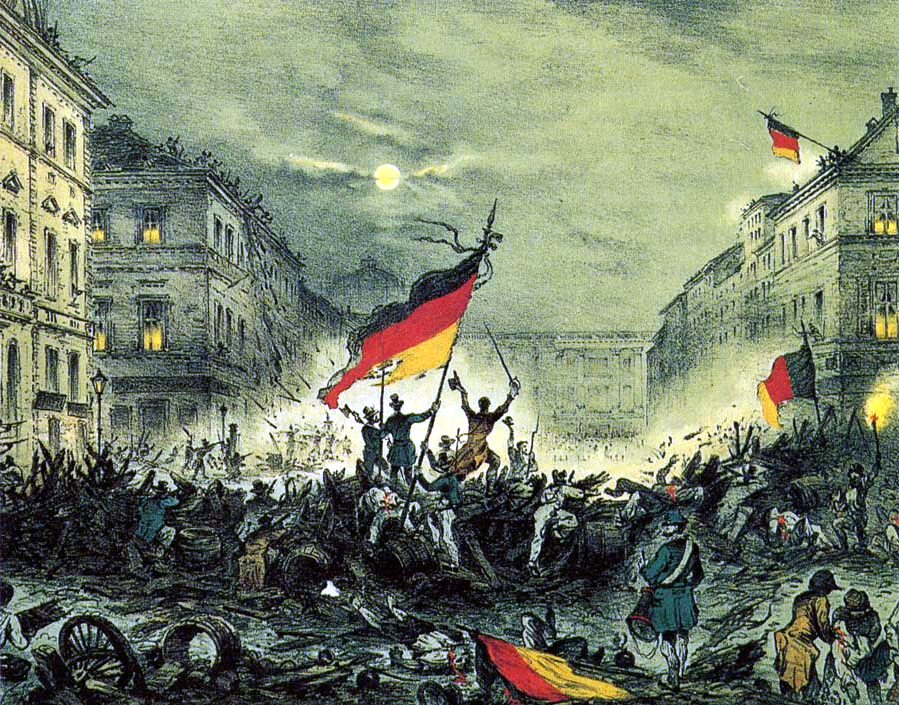 Nationalist and liberal pressure led to the European Revolutions of 1848. Critics argue that primordial models relying on evolutionary psychology are based not on historical evidence but on assumptions of unobserved changes over thousands of years and assume stable genetic composition of the population living in a specific area and are incapable of handling the contingencies that characterize every known historical process. Robert Hislope argues: [T]he articulation of cultural evolutionary theory represents theoretical progress over sociobiology, but its explanatory payoff remains limited due to the role of contingency in human affairs and the significance of non-evolutionary, proximate causal factors. While evolutionary theory undoubtedly elucidates the development of all organic life, it would seem to operate best at macro-levels of analysis, "distal" points of explanation, and from the perspective of the long-term. Hence, it is bound to display shortcomings at micro-level events that are highly contingent in nature.[191] In 1920, English historian G. P. Gooch argued that "[while patriotism is as old as human association and has gradually widened its sphere from the clan and the tribe to the city and the state, nationalism as an operative principle and an articulate creed only made its appearance among the more complicated intellectual processes of the modern world."[192] Marxist interpretations In The Communist Manifesto, Karl Marx and Friedrich Engels declared that "the working men have no country".[193] Vladimir Lenin supported the concept of self-determination.[194] Joseph Stalin's Marxism and the National Question (1913) declares that "a nation is not a racial or tribal, but a historically constituted community of people;" "a nation is not a casual or ephemeral conglomeration, but a stable community of people"; "a nation is formed only as a result of lengthy and systematic intercourse, as a result of people living together generation after generation"; and, in its entirety: "a nation is a historically constituted, stable community of people, formed on the basis of a common language, territory, economic life, and psychological make-up manifested in a common culture."[195] |
社会学 ナショナリズムと国家建設に関する社会学的あるいは近代主義的な解釈は、ナショナリズムは、自立可能な産業経済、権威と統一性を維持することのできる中央 の最高権力者、そして人々の共同体によって理解される中央集権的な言語を有する近代社会において生じ、繁栄すると主張する[181]。近代主義者の理論家 は、伝統的な社会が一般的にナショナリズムの前提条件を欠いているのに対して、これは近代的な社会においてのみ可能であると指摘する。伝統的な社会は近代 的な自立可能な経済を欠いており、権威が分立しており、複数の言語を使用しているため、多くの集団が互いにコミュニケーションをとることができない。 国家とナショナリズムに関する近代主義的解釈を展開した著名な理論家には以下のようなものがある: カールトン・J・H・ヘイズ、ヘンリー・メイン、フェルディナント・テニエス、ラビンドラナート・タゴール、エミール・デュルケーム、マックス・ウェー バー、アーノルド・ジョセフ・トインビー、タルコット・パーソンズなどである[181]。 ヘンリー・メインは、人類社会の歴史的変化と発展に関する彼の分析において、家族の結びつきと個人の機能的に拡散した役割に基づく「身分」社会と定義され る伝統的社会と、社会関係が個人の利益を増進させるために個人によって追求される合理的な契約によって決定される「契約」社会と定義される近代的社会との 間の重要な区別を指摘した。メインは、社会の発展が伝統的な身分社会から近代的な契約社会へと移行するものであると見なしていた[182]。 フェルディナント・テニエスはその著書『ゲマインシャフトとゲゼルシャフト』(Gemeinschaft und Gesellschaft、1887年)において、ゲマインシャフト(「共同体」)を伝統的な社会と同様に感情的な愛着に基づくものと定義する一方で、ゲ ゼルシャフト(「社会」)を近代的な非人間的な社会と定義した。彼は近代社会の利点を認識する一方で、伝統的な共同体の親密さを賞賛する一方で、疎外感を 引き起こす冷淡で非人間的な性質について批判していた[182]。 エミール・デュルケームはテニエスの疎外に対する認識を拡大し、伝統的社会と近代的社会の違いを「機械的連帯」に基づく社会と「有機的連帯」に基づく社会 の違いであると定義した[182]。デュルケムは有機的連帯に基づく社会を、疎外を引き起こす社会的分化に基づく分業が存在する近代社会であると見なして いた。デュルケムは、伝統的社会における社会統合には、社会秩序の受容を伴う権威主義的文化が必要であると主張した。デュルケムは、近代社会は分業による 相互利益に基づいて統合を基礎づけていると主張していたが、近代都市生活の非人間的な性格が疎外とアノミーの感情を引き起こしていると指摘していた [182]。 マックス・ウェーバーは、近代社会と国家を発展させた変化は、新しい伝統や国家の最高権威を確立する合理的な法体系を作り出すカリスマ的指導者が社会で権 力を握った結果であると主張していた。ヴェーバーのカリスマ的権威の概念は、多くの国家主義的政府の基礎として指摘されている[182]。 原初主義的進化論的解釈 原初主義的な視点は進化論に基づいている[183][184]。このアプローチは一般大衆には人気があるが、一般的に専門家には否定されている。ラランド とブラウンは、「社会科学の専門的な学者の大多数は......進化論的手法を無視するだけでなく、多くの場合、むしろ限られた証拠から膨大な一般化を導 き出す議論に対して[極めて]敵対的である」と報告している[185]。 ナショナリズムの進化論は、ナショナリズムが民族集団や国家の基盤を形成するその他の集団などの集団と同一化するように人間が進化した結果であると認識し ている[183]。ロジャー・マスターズは『政治の本質』の中で、民族集団や国家集団の起源に関する原初的な説明について、それが親族関係に基づき、共通 の祖先の系統に沿って促進されるために、独特で感情的で強烈で耐久性があると考えられている集団の愛着を認識することであると述べている[186]。 ナショナリズムの原初主義的な進化論的見解は、チャールズ・ダーウィンの進化論や19世紀後半の社会ダーウィニズムの見解を参照することが多い。ハーバー ト・スペンサーやウォルター・バゲホーのような思想家は、集団、民族、人種、国家間の生物学的差異について根拠のない主張をすることによって、「しばしば チャールズ・ダーウィンの進化論と矛盾する方法で」ダーウィンの自然淘汰理論を再解釈した[187]。現代の進化科学はこのような見解から距離を置いてい るが、長期的な進化的変化という概念はジョン・トゥービーやレダ・コスミデスのような進化心理学者の研究の基礎となっている。 原初主義的な視点を通してアプローチすると、外国の軍隊が国家の国境に動員されるのを見るという例は、国民集団のメンバーを刺激し、それに対して団結し、 自らを動員させるかもしれない[189]。近接的な環境というものがあり、そこでは個人が非近接的な現実の状況や想像上の状況を目の前の状況と組み合わせ て認識することで、個人の意思決定に影響を与える主観的な要素と客観的な要素の両方からなる共通の状況に直面することになる[190]。  ナショナリストとリベラルの圧力は1848年のヨーロッパ革命をもたらした。 批評家たちは、進化心理学に依拠した原初的モデルは歴史的証拠に基づくものではなく、何千年にもわたる観察されていない変化の仮定に基づくものであり、特 定の地域に住む集団の安定した遺伝的構成を仮定しており、既知のあらゆる歴史的過程を特徴づける偶発性を扱うことができないと主張している。ロバート・ヒ スロープはこう主張する: [文化進化論は社会生物学よりも理論的に進歩しているが、人間の問題における偶発性の役割や、進化論的でない近接的な原因因子の重要性から、その説明的価 値は依然として限定的である。進化論がすべての有機的生命の発達を解明していることは間違いないが、それはマクロな分析レベル、説明の「遠距離」ポイン ト、そして長期的な観点から最もよく機能しているように思われる。それゆえ、本質的に非常に偶発的であるミクロレベルの事象においては、欠点を示すに違い ない[191]。 1920年、イギリスの歴史家であるG・P・グーチは「愛国主義は人間の結社と同じくらい古く、一族や部族から都市や国家へと徐々にその領域を広げてきた が、作動原理や明確な信条としてのナショナリズムは近代世界のより複雑な知的プロセスの中で初めてその姿を現した」と主張していた[192]。 マルクス主義の解釈 共産党宣言』において、カール・マルクスとフリードリヒ・エンゲルスは「労働者は国を持たない」と宣言した[193]。 [194] ヨシフ・スターリンの『マルクス主義と民族問題』(1913年)は、「民族とは人種や部族ではなく、歴史的に構成された人々の共同体である」、「民族とは 気軽な、あるいは刹那的な集合体ではなく、安定した人々の共同体である」、「民族は、人々が世代を越えて共に暮らした結果として、長く体系的な交流の結果 としてのみ形成される」と宣言している: 「国家とは、歴史的に構成された安定した人々の共同体であり、共通の言語、領土、経済生活、共通の文化に現れる心理的構成に基づいて形成される」 [195]。 |
| Types See also: Types of nationalism Historians, sociologists and anthropologists have debated different types of nationalism since at least the 1930s.[196] Generally, the most common way of classifying nationalism has been to describe movements as having either "civic" or "ethnic" nationalist characteristics. This distinction was popularized in the 1950s by Hans Kohn who described "civic" nationalism as "Western" and more democratic while depicting "ethnic" nationalism as "Eastern" and undemocratic.[197] Since the 1980s, scholars of nationalism have pointed out numerous flaws in this rigid division and proposed more specific classifications and numerous varieties.[198][199] Anti-colonial 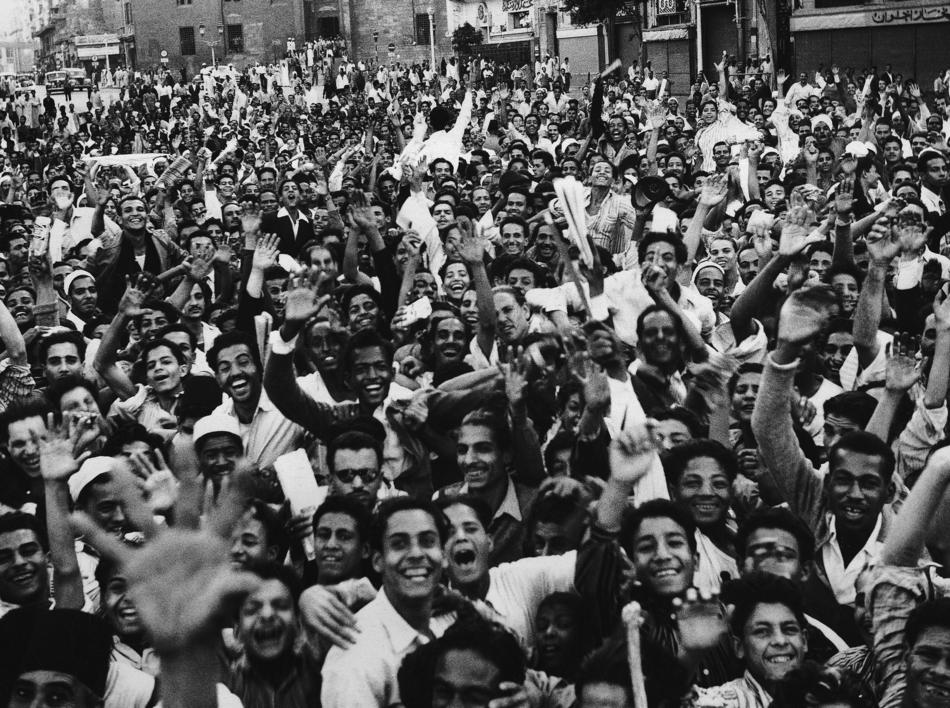 Crowd demonstrates against Britain in Cairo on 23 October 1951 as tension continued to mount in the dispute between Egypt and Britain over control of the Suez Canal and Anglo-Egyptian Sudan. Anti-colonial nationalism is an intellectual framework that preceded, accompanied and followed the process of decolonization in the mid-1900s. Benedict Anderson defined a nation as a socially constructed community that is co-created by individuals who imagine themselves as part of this group.[13][16] He points to the New World as the site that originally conceived of nationalism as a concept, which is defined by its imagination of an ahistorical identity that negates colonialism by definition. This concept of nationalism was exemplified by the transformation of settler colonies into nations, while anti-colonial nationalism is exemplified by movements against colonial powers in the 1900s. Nationalist mobilization in French colonial Africa and British colonial India developed "when colonial regimes refused to cede rights to their increasingly well-educated colonial subjects", who formed indigenous elites and strategically adopted and adapted nationalist tactics.[13][200][201] New national identities may cross pre-existing ethnic or linguistic divisions.[13] Anti-colonial independence movements in Africa and Asia in the 1900s were led by individuals who had a set of shared identities and imagined a homeland without external rule. Anderson argues that the racism often experienced as a result of colonial rule and attributed to nationalism is rather due to theories of class.[175] Gellner's theory of nationalism argues that nationalism works for combining one culture or ethnicity in one state, which leads to that state's success. For Gellner, nationalism is ethnic, and state political parties should reflect the ethnic majority in the state. This definition of nationalism also contributes to anti-colonial nationalism, if one conceives of anti-colonial movements to be movements consisting of one specific ethnic group against an outside ruling party.[202] Edward Said also saw nationalism as ethnic, at least in part, and argued that nationalist narratives often go hand in hand with racism, as communities define themselves in relation to the other.[203] Anti-colonial nationalism is not static and is defined by different forms of nationalism depending on location. In the anti-colonial movement that took place in the Indian subcontinent, Mahatma Gandhi and his allies in the Indian independence movement argued for a composite nationalism, not believing that an independent Indian nation should be defined by its religious identity.[204][205] Despite large-scale opposition by Congress supporters, the insistence of the Muslims under the separatist Muslim League resulted in the Indian subcontinent being partitioned into two states in 1947 along religious lines into the Muslim-majority Dominion of Pakistan and the Hindu-majority Dominion of India.[206] Because of colonialism's creation of state and country lines across ethnic, religious, linguistic and other historical boundaries, anti-colonial nationalism is largely related to land first. After independence, especially in countries with particularly diverse populations with historic enmity, there have been a series of smaller independence movements that are also defined by anti-colonialism. Philosopher and scholar Achille Mbembe argues that post-colonialism is a contradictory term, because colonialism is ever present.[207] Those that participate in this intellectual practice envision a post-colonialism despite its being the defining frame for the world. This is the case with anti-colonialism as well. Anti-colonial nationalism as an intellectual framework persisted into the late 20th century with the resistance movements in Soviet satellite states and continues with independence movements in the Arab world in the 21st century. Civic and liberal Main article: Civic nationalism Civic nationalism defines the nation as an association of people who identify themselves as belonging to the nation, who have equal and shared political rights, and allegiance to similar political procedures.[208] According to the principles of civic nationalism, the nation is not based on common ethnic ancestry, but is a political entity whose core identity is not ethnicity. This civic concept of nationalism is exemplified by Ernest Renan in his lecture in 1882 "What is a Nation?", where he defined the nation as a "daily referendum" (frequently translated "daily plebiscite") dependent on the will of its people to continue living together.[208] Civic nationalism is normally associated with liberal nationalism, although the two are distinct, and did not always coincide. On the one hand, until the late 19th and early 20th century adherents to anti-Enlightenment movements such as French Legitimism or Spanish Carlism often rejected the liberal, national unitary state, yet identified themselves not with an ethnic nation but with a non-national dynasty and regional feudal privileges. Xenophobic movements in long-established Western European states indeed often took a 'civic national' form, rejecting a given group's ability to assimilate with the nation due to its belonging to a cross-border community (Irish Catholics in Britain, Ashkenazic Jews in France). On the other hand, while subnational separatist movements were commonly associated with ethnic nationalism, this was not always so, and such nationalists as the Corsican Republic, United Irishmen, Breton Federalist League or Catalan Republican Party could combine a rejection of the unitary civic-national state with a belief in liberal universalism. Liberal nationalism is commonly considered to be compatible with liberal values of freedom, tolerance, equality, and individual rights.[209][210][211] Ernest Renan[212] and John Stuart Mill[213] are often thought to be early liberal nationalists. Liberal nationalists often defend the value of national identity by saying that individuals need a national identity to lead meaningful, autonomous lives,[214][215] and that liberal democratic polities need national identity to function properly.[216][217] Civic nationalism lies within the traditions of rationalism and liberalism, but as a form of nationalism it is usually contrasted with ethnic nationalism. Civic nationalism is correlated with long-established states whose dynastic rulers had gradually acquired multiple distinct territories, with little change to boundaries, but which contained historical populations of multiple linguistic and/or confessional backgrounds. Since individuals living within different parts of the state territory might have little obvious common ground, civic nationalism developed as a way for rulers to both explain a contemporary reason for such heterogeneity and to provide a common purpose (Ernest Renan's classic description in What is a Nation? (1882) as a voluntary partnership for a common endeavor). Renan argued that factors such as ethnicity, language, religion, economics, geography, ruling dynasty and historic military deeds were important but not sufficient. Needed was a spiritual soul that allowed as a "daily referendum" among the people.[218] Civic-national ideals influenced the development of representative democracy in multiethnic countries such as the United States and France, as well as in constitutional monarchies such as Great Britain, Belgium and Spain.[70] 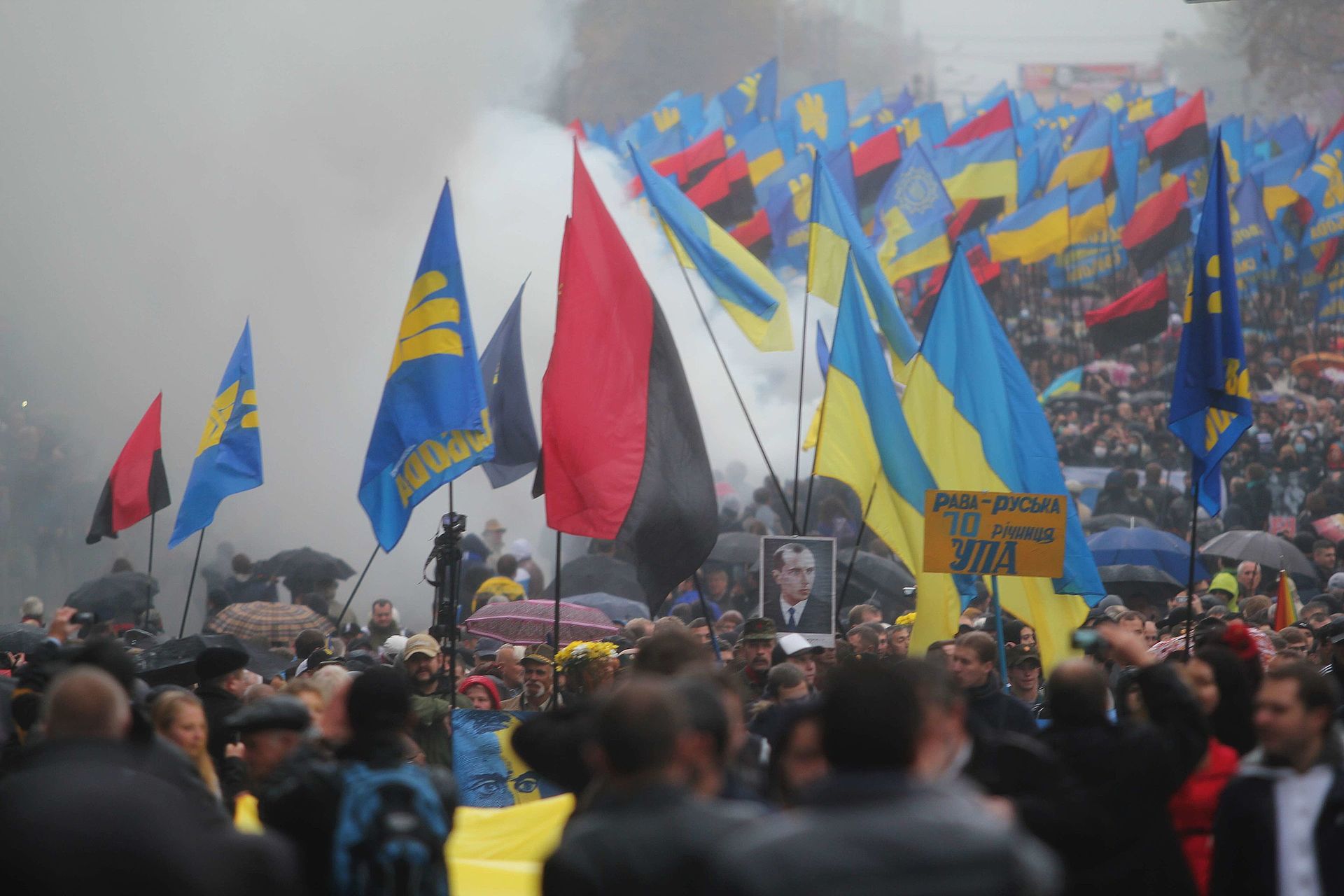 Ukrainian nationalists carry portraits of Stepan Bandera and flags of the Ukrainian Insurgent Army.2012 Creole Main article: Creole nationalism Creole nationalism is the ideology that emerged in independence movements among the creoles (descendants of the colonizers), especially in Latin America in the early 19th century. It was facilitated when French Emperor Napoleon seized control of Spain and Portugal, breaking the chain of control from the Spanish and Portuguese kings to the local governors. Allegiance to the Napoleonic states was rejected, and increasingly the creoles demanded independence. They achieved it after civil wars 1808–1826.[219] Ethnic See also: Ethnic nationalism Ethnic nationalism, also known as ethno-nationalism, is a form of nationalism wherein the "nation" is defined in terms of ethnicity.[220] The central theme of ethnic nationalists is that "nations are defined by a shared heritage, which usually includes a common language, a common faith, and a common ethnic ancestry".[221] It also includes ideas of a culture shared between members of the group, and with their ancestors. It is different from a purely cultural definition of "the nation," which allows people to become members of a nation by cultural assimilation; and from a purely linguistic definition, according to which "the nation" consists of all speakers of a specific language. Whereas nationalism in and of itself does not imply a belief in the superiority of one ethnicity or country over others, some nationalists support ethnocentric supremacy or protectionism. The humiliation of being a second-class citizen led regional minorities in multiethnic states, such as Great Britain, Spain, France, Germany, Russia and the Ottoman Empire, to define nationalism in terms of loyalty to their minority culture, especially language and religion. Forced assimilation was anathema.[222] For the politically dominant cultural group, assimilation was necessary to minimize disloyalty and treason and therefore became a major component of nationalism. A second factor for the politically dominant group was competition with neighboring states—nationalism involved a rivalry, especially in terms of military prowess and economic strength.[223] Economic See also: Economic nationalism Economic nationalism, or economic patriotism, is an ideology that favors state interventionism in the economy, with policies that emphasize domestic control of the economy, labor, and capital formation, even if this requires the imposition of tariffs and other restrictions on the movement of labor, goods and capital.[224] Gendered and muscular Main article: Nationalism and gender Feminist critique interprets nationalism as a mechanism through which sexual control and repression are justified and legitimized, often by a dominant masculine power. The gendering of nationalism through socially constructed notions of masculinity and femininity not only shapes what masculine and feminine participation in the building of that nation will look like, but also how the nation will be imagined by nationalists.[225] A nation having its own identity is viewed as necessary, and often inevitable, and these identities are gendered.[226] The physical land itself is often gendered as female (i.e. "Motherland"), with a body in constant danger of violation by foreign males, while national pride and protectiveness of "her" borders is gendered as masculine.[227] 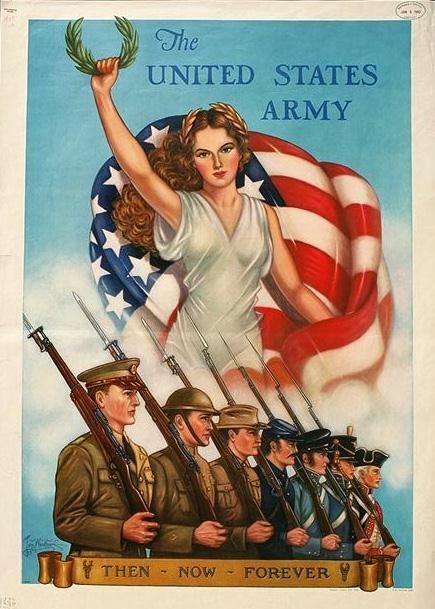 World War II United States Patriotic Army Recruiting Poster History, political ideologies, and religions place most nations along a continuum of muscular nationalism.[226] Muscular nationalism conceptualizes a nation's identity as being derived from muscular or masculine attributes that are unique to a particular country.[226] If definitions of nationalism and gender are understood as socially and culturally constructed, the two may be constructed in conjunction by invoking an "us" versus "them" dichotomy for the purpose of the exclusion of the so-called "other," who is used to reinforce the unifying ties of the nation.[225] The empowerment of one gender, nation or sexuality tends to occur at the expense and disempowerment of another; in this way, nationalism can be used as an instrument to perpetuate heteronormative structures of power.[228] The gendered manner in which dominant nationalism has been imagined in most states in the world has had important implications on not only individual's lived experience, but on international relations.[229] Colonialism has historically been heavily intertwined with muscular nationalism, from research linking hegemonic masculinity and empire-building,[225] to intersectional oppression being justified by colonialist images of the "other", a practice integral in the formation of Western identity.[230] This "othering" may come in the form of orientalism, whereby the East is feminized and sexualized by the West. The imagined feminine East, or "other," exists in contrast to the masculine West. The status of conquered nations can become a causality dilemma: the nation was "conquered because they were effeminate and seen as effeminate because they were conquered."[225] In defeat they are considered militaristically unskilled, not aggressive, and thus not muscular. In order for a nation to be considered "proper", it must possess the male-gendered characteristics of virility, as opposed to the stereotypically female characteristics of subservience and dependency.[226] Muscular nationalism is often inseparable from the concept of a warrior, which shares ideological commonalities across many nations; they are defined by the masculine notions of aggression, willingness to engage in war, decisiveness, and muscular strength, as opposed to the feminine notions of peacefulness, weakness, non-violence, and compassion.[225] This masculinized image of a warrior has been theorized to be "the culmination of a series of gendered historical and social processes" played out in a national and international context.[225] Ideas of cultural dualism—of a martial man and chaste woman—which are implicit in muscular nationalism, underline the raced, classed, gendered, and heteronormative nature of dominant national identity.[226] Nations and gender systems are mutually supportive constructions: the nation fulfils the masculine ideals of comradeship and brotherhood.[231] Masculinity has been cited as a notable factor in producing political militancy.[231] A common feature of national crisis is a drastic shift in the socially acceptable ways of being a man,[232] which then helps to shape the gendered perception of the nation as a whole. Integral, pan and irredentism Main articles: Integral nationalism, Irredentism, and Pan-nationalism There are different types of nationalism including Risorgimento nationalism and Integral nationalism.[233][234] Whereas risorgimento nationalism applies to a nation seeking to establish a liberal state (for example the Risorgimento in Italy and similar movements in Greece, Germany, Poland during the 19th century or the civic American nationalism), integral nationalism results after a nation has achieved independence and has established a state. Fascist Italy and Nazi Germany, according to Alter and Brown, were examples of integral nationalism. Some of the qualities that characterize integral nationalism are anti-individualism, statism, radical extremism, and aggressive-expansionist militarism. The term Integral Nationalism often overlaps with fascism, although many natural points of disagreement exist. Integral nationalism arises in countries where a strong military ethos has become entrenched through the independence struggle, when, once independence is achieved, it is believed that a strong military is required to ensure the security and viability of the new state. Also, the success of such a liberation struggle results in feelings of national superiority that may lead to extreme nationalism. Pan-nationalism is unique in that it covers a large area span. Pan-nationalism focuses more on "clusters" of ethnic groups. Pan-Slavism is one example of Pan-nationalism. The goal is to unite all Slavic people into one country. They did succeed by uniting several south Slavic people into Yugoslavia in 1918.[235] Left-wing Main article: Left-wing nationalism 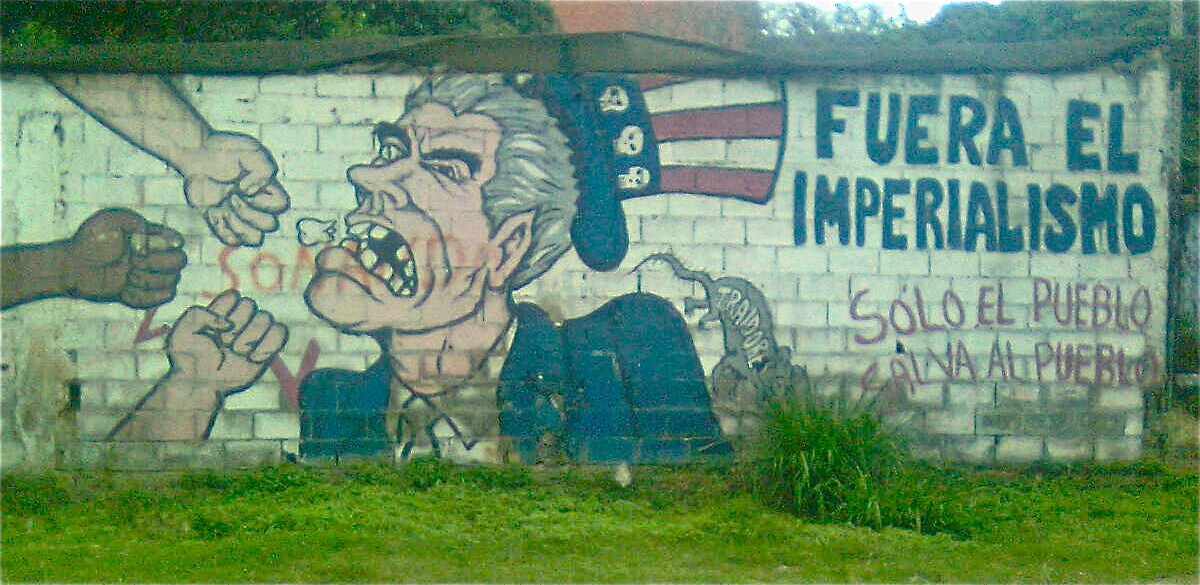 A political mural in Caracas featuring an anti-American and anti-imperialist message Left-wing nationalism, occasionally known as socialist nationalism, not to be confused with the German fascist "National Socialism",[236] is a political movement that combines left-wing politics with nationalism. Many nationalist movements are dedicated to national liberation, in the view that their nations are being persecuted by other nations and thus need to exercise self-determination by liberating themselves from the accused persecutors. Anti-revisionist Marxism–Leninism is closely tied with this ideology, and practical examples include Stalin's early work Marxism and the National Question and his socialism in one country edict, which declares that nationalism can be used in an internationalist context, fighting for national liberation without racial or religious divisions. Other examples of left-wing nationalism include Fidel Castro's 26th of July Movement that launched the Cuban Revolution in 1959, Cornwall's Mebyon Kernow, Ireland's Sinn Féin, Wales's Plaid Cymru, Galicia's Galician Nationalist Bloc, the Awami League in Bangladesh, the African National Congress in South Africa and numerous movements in Eastern Europe.[237][238] National-anarchism Main article: National-anarchism Among the first advocates of national-anarchism were Hans Cany, Peter Töpfer and former National Front activist Troy Southgate, founder of the National Revolutionary Faction, a since disbanded British-based organization which cultivated links to certain far-left and far-right circles in the United Kingdom and in post-Soviet states, not to be confused with the national-anarchism of the Black Ram Group.[239][240][241] In the United Kingdom, national-anarchists worked with Albion Awake, Alternative Green (published by former Green Anarchist editor Richard Hunt) and Jonathan Boulter to develop the Anarchist Heretics Fair.[240] Those national-anarchists cite their influences primarily from Mikhail Bakunin, William Godwin, Peter Kropotkin, Pierre-Joseph Proudhon, Max Stirner and Leo Tolstoy.[239] A position developed in Europe during the 1990s, national-anarchist groups have seen arisen worldwide, most prominently in Australia (New Right Australia/New Zealand), Germany (International National Anarchism) and the United States (BANA).[240][241] National-anarchism has been described as a radical right-wing[242][243][244] nationalist ideology which advocates racial separatism and white racial purity.[239][240][241] National-anarchists claim to syncretize neotribal ethnic nationalism with philosophical anarchism, mainly in their support for a stateless society whilst rejecting anarchist social philosophy.[239][240][241] The main ideological innovation of national-anarchism is its anti-state palingenetic ultranationalism.[242] National-anarchists advocate homogeneous communities in place of the nation state. National-anarchists claim that those of different ethnic or racial groups would be free to develop separately in their own tribal communes while striving to be politically meritocratic, economically non-capitalist, ecologically sustainable and socially and culturally traditional.[239][241] Although the term national-anarchism dates back as far as the 1920s, the contemporary national-anarchist movement has been put forward since the late 1990s by British political activist Troy Southgate, who positions it as being "beyond left and right".[239] The few scholars who have studied national-anarchism conclude that it represents a further evolution in the thinking of the radical right rather than an entirely new dimension on the political spectrum.[242][243][244] National-anarchism is considered by anarchists as being a rebranding of totalitarian fascism and an oxymoron due to the inherent contradiction of anarchist philosophy of anti-fascism, abolition of unjustified hierarchy, dismantling of national borders and universal equality between different nationalities as being incompatible with the idea of a synthesis between anarchism and fascism.[241] National-anarchism has elicited scepticism and outright hostility from both left-wing and far-right critics.[240][241] Critics, including scholars, accuse national-anarchists of being nothing more than white nationalists who promote a communitarian and racialist form of ethnic and racial separatism while wanting the militant chic of calling themselves anarchists without the historical and philosophical baggage that accompanies such a claim, including the anti-racist egalitarian anarchist philosophy and the contributions of Jewish anarchists.[240][241] Some scholars are sceptical that implementing national-anarchism would result in an expansion of freedom and describe it as an authoritarian anti-statism that would result in authoritarianism and oppression, only on a smaller scale.[245] Nativist See also: Nativism (politics) Nativist nationalism is a type of nationalism similar to creole or territorial types of nationalism, but which defines belonging to a nation solely by being born on its territory. In countries where strong nativist nationalism exists, people who were not born in the country are seen as lesser nationals than those who were born there and are called immigrants even if they became naturalized. It is cultural as people will never see a foreign-born person as one of them and is legal as such people are banned for life from holding certain jobs, especially government jobs. In scholarly studies, nativism is a standard technical term, although those who hold this political view do not typically accept the label. "[N]ativists . . . do not consider themselves nativists. For them it is a negative term and they rather consider themselves as 'Patriots'."[246] Racial Main article: Racial nationalism Racial nationalism is an ideology that advocates a racial definition of national identity. Racial nationalism seeks to preserve a given race through policies such as banning race mixing and the immigration of other races. Its ideas tend to be in direct conflict with those of anti-racism and multiculturalism.[247][248] Specific examples are black nationalism and white nationalism. Religious Main article: Religious nationalism Religious nationalism is the relationship of nationalism to a particular religious belief, dogma, or affiliation where a shared religion can be seen to contribute to a sense of national unity, a common bond among the citizens of the nation. Saudi Arabian, Iranian, Egyptian, Iraqi, American and the Pakistani-Islamic nationalism (Two-Nation Theory) are some examples. Territorial Main article: Territorial nationalism  Nationalist slogan "Brazil, love it or leave it", used during the Brazilian military dictatorship Some nationalists exclude certain groups. Some nationalists, defining the national community in ethnic, linguistic, cultural, historic, or religious terms (or a combination of these), may then seek to deem certain minorities as not truly being a part of the 'national community' as they define it. Sometimes a mythic homeland is more important for the national identity than the actual territory occupied by the nation.[249] Territorial nationalists assume that all inhabitants of a particular nation owe allegiance to their country of birth or adoption.[250] A sacred quality is sought in the nation and in the popular memories it evokes. Citizenship is idealized by territorial nationalists. A criterion of a territorial nationalism is the establishment of a mass, public culture based on common values, codes and traditions of the population.[251] Sport Main article: Nationalism and sport Sport spectacles like football's World Cup command worldwide audiences as nations battle for supremacy and the fans invest intense support for their national team. Increasingly people have tied their loyalties and even their cultural identity to national teams.[252] The globalization of audiences through television and other media has generated revenues from advertisers and subscribers in the billions of dollars, as the FIFA Scandals of 2015 revealed.[253] Jeff Kingston looks at football, the Commonwealth Games, baseball, cricket, and the Olympics and finds that, "The capacity of sports to ignite and amplify nationalist passions and prejudices is as extraordinary as is their power to console, unify, uplift and generate goodwill."[254] The phenomenon is evident across most of the world.[255][256][257] The British Empire strongly emphasized sports among its soldiers and agents across the world, and often the locals joined in enthusiastically.[258] It established a high prestige competition in 1930, named the British Empire Games from 1930 to 1950, the British Empire and Commonwealth Games from 1954 to 1966, British Commonwealth Games from 1970 to 1974 and since then the Commonwealth Games.[259] The French Empire was not far behind the British in the use of sports to strengthen colonial solidarity with France. Colonial officials promoted and subsidized gymnastics, table games, and dance and helped football spread to French colonies.[260] Pandemic Harris Mylonas and Ned Whalley co-edited a special issue on "pandemic nationalism" exploring the relationship between nationalism and the COVID-19 pandemic.[261] While nationalism unquestionably helped overcome collective action problems within state borders during the pandemic, it has undermined them at the global scale. The most clear example being been the abject failure of international organizations to coordinate an appropriate response. As they put it, "During the pandemic, a nationalist human calculus has prevailed. Solidarity has been extended to co-nationals but has been less forthcoming beyond that point. All states have responded by turning inward. Border closures have been at the heart of mitigation efforts from the very beginning, and lockdowns legitimated and often enforced through national and patriotic discourses."[262] |
種類 こちらも参照: ナショナリズムの種類 一般的に、ナショナリズムを分類する最も一般的な方法は、運動を「市民的」ナショナリズムと「民族的」ナショナリズムのいずれかの特徴を持つものとして記 述することであった[196]。この区別は1950年代にハンス・コーンによって一般化されたものであり、彼は「市民的」ナショナリズムを「西洋的」でよ り民主的であると説明する一方で、「民族的」ナショナリズムを「東洋的」で非民主的であると描写した[197]。1980年代以降、ナショナリズムの研究 者たちはこの硬直的な区分における多くの欠陥を指摘し、より具体的な分類や多くの種類を提案してきた[198][199]。 反植民地主義  1951年10月23日、スエズ運河と英領スーダンの支配権をめぐるエジプトとイギリスの紛争で緊張が続く中、カイロでイギリスに対するデモを行う群衆。 反植民地ナショナリズムは、1900年代半ばの脱植民地化のプロセスに先行し、それに伴い、またそれに追随した知的枠組みである。ベネディクト・アンダー ソンは、国家とは社会的に構築された共同体であり、その集団の一員であると想像する個人によって共同創造されるものであると定義した[13][16]。彼 は、ナショナリズムを概念として最初に構想した場所として新世界を挙げており、それは植民地主義を定義によって否定する非歴史的なアイデンティティの想像 力によって定義されている。このようなナショナリズムの概念は、入植者の植民地が国家へと変貌することによって例証され、反植民地ナショナリズムは 1900年代の植民地権力に対する運動によって例証される。 フランス植民地時代のアフリカやイギリス植民地時代のインドにおけるナショナリズムの動員は、「植民地体制が、次第に教養を高めていく植民地臣民に権利を 譲り渡すことを拒否したとき」に発展し、彼らは土着のエリートを形成し、戦略的にナショナリズムの戦術を採用し、適応させていった[13][200] [201]。新たなナショナリズムのアイデンティティは、既存の民族的あるいは言語的な分断を越える可能性がある[13]。アンダーソンは、植民地支配の 結果としてしばしば経験され、ナショナリズムに起因する人種差別は、むしろ階級論によるものであると論じている[175]。 ゲルナーのナショナリズム論は、ナショナリズムは1つの国家において1つの文化や民族を結合させるために機能し、それが国家の成功につながると主張してい る。ゲルナーにとって、ナショナリズムとは民族的なものであり、国家の政党はその国家の多数派である民族を反映すべきものである。ナショナリズムのこの定 義は、反植民地運動が外部の支配政党に対抗するある特定の民族集団からなる運動であると考えるならば、反植民地ナショナリズムにも寄与している [202]。エドワード・サイードもまたナショナリズムを少なくとも部分的には民族的なものであると見ており、共同体が他者との関係において自らを定義す るように、ナショナリズムの語りはしばしば人種差別と密接に関係していると論じている[203]。 反植民地ナショナリズムは固定的なものではなく、場所によって異なる形態のナショナリズムによって定義される。インド亜大陸で起こった反植民地運動におい て、インド独立運動におけるマハトマ・ガンディーと彼の盟友たちは、独立したインド国家がその宗教的アイデンティティによって定義されるべきだとは考え ず、複合ナショナリズムを主張した[204][205]。議会支持者による大規模な反対にもかかわらず、分離主義的なムスリム同盟のもとでのムスリムの主 張によって、1947年にインド亜大陸は宗教的な境界線に沿って、ムスリムが多数を占めるパキスタン王国とヒンドゥー教徒が多数を占めるインド王国に分割 された[206]。 植民地主義が民族的、宗教的、言語的、その他の歴史的境界線を越えて国家や国の境界線を作ったため、反植民地ナショナリズムはまず土地に大きく関係してい る。独立後、特に歴史的な敵対関係にある多様な人口を抱える国々では、反植民地主義によって定義される小規模な独立運動が相次いだ。 哲学者であり学者でもあるアキレ・ムベンベは、ポストコロニアリズムは矛盾した言葉であると主張する。これは反植民地主義においても同様である。知的枠組 みとしての反植民地ナショナリズムは、ソビエト衛星国における抵抗運動とともに20世紀後半まで存続し、21世紀のアラブ世界における独立運動とともに続 いている。 市民主義・自由主義 主な記事 市民的ナショナリズム 市民的ナショナリズムは、国家を、国家に属することを自認し、平等で共通の政治的権利を持ち、同様の政治的手続きに忠誠を誓う人々の連合体として定義して いる[208]。市民的ナショナリズムの原則によれば、国家は共通の民族的先祖に基づくものではなく、民族性を中核的アイデンティティとしない政治的実体 である。この市民的ナショナリズムの概念は、エルネスト・ルナンによって1882年に行われた講義「国家とは何か」の中で例示されており、彼は国家を、共 に生き続けるという国民の意思に依存する「毎日の国民投票」(しばしば「毎日の国民投票」と訳される)と定義している[208]。 シビック・ナショナリズムは通常、リベラル・ナショナリズムと関連しているが、この2つは別物であり、常に一致していたわけではない。一方では、19世紀 後半から20世紀初頭まで、フランスのレギティミズムやスペインのカーリズムのような反啓蒙主義運動の信奉者たちは、自由主義的な単一民族国家を否定しな がらも、自らを民族国家ではなく非民族的な王朝や地域の封建的特権と同一視することが多かった。西欧の伝統的な国家における外国人排斥運動は、国境を越え た共同体(イギリスではアイルランドのカトリック教徒、フランスではアシュケナージ系ユダヤ人)に属する集団が国家に同化することを拒否する「市民国家」 的な形態をとることが多かった。コルシカ共和国、連合アイルランド人、ブルトン連邦同盟、カタルーニャ共和国党のようなナショナリストは、市民的・国家的 な単一国家の否定と自由普遍主義への信奉を結びつけることができた。 リベラルナショナリズムは一般的に自由、寛容、平等、個人の権利といったリベラルな価値観と両立すると考えられている[209][210][211]。リ ベラル・ナショナリストは、個人が意味のある自律的な生活を送るためには国民的アイデンティティが必要であり[214][215]、自由民主主義政治が適 切に機能するためには国民的アイデンティティが必要であると言って、国民的アイデンティティの価値を擁護することが多い[216][217]。 市民的ナショナリズムは合理主義と自由主義の伝統の中にあるが、ナショナリズムの一形態としては通常民族的ナショナリズムと対比される。市民的ナショナリ ズムは、王朝の支配者が境界をほとんど変えることなく、複数の異なる領土を徐々に獲得していったが、複数の言語的背景および/または宗派的背景を持つ歴史 的人口を含んでいた、長く確立された国家と関連している。国家領土の異なる部分に住む個人は、明白な共通基盤をほとんど持たない可能性があるため、市民ナ ショナリズムは、支配者がこのような異質性の現代的な理由を説明し、共通の目的を提供する方法として発展した(アーネスト・ルナンの古典的な記述『国家と は何か?(1882)の中で、共通の努力のための自発的なパートナーシップと表現している)。ルナンは、民族、言語、宗教、経済、地理、支配王朝、歴史的 な武勲といった要素は重要だが十分ではないと主張した。市民的・国民的理念は、アメリカやフランスなどの多民族国家やイギリス、ベルギー、スペインなどの 立憲君主制国家における代議制民主主義の発展に影響を与えた[70]。  ウクライナのナショナリストはステパン・バンデラの肖像画やウクライナ反乱軍の旗を持っている。2012 クレオール 主な記事 クレオール・ナショナリズム クレオール・ナショナリズムは、特に19世紀初頭にラテンアメリカのクレオール(植民地支配者の子孫)の間で独立運動の中で生まれたイデオロギーである。 フランス皇帝ナポレオンがスペインとポルトガルの支配権を掌握し、スペイン王やポルトガル王から地方知事への支配の連鎖が断ち切られたことで促進された。 ナポレオン国家への忠誠は拒否され、クレオール人はますます独立を求めるようになった。1808年から1826年にかけての内戦を経て独立を果たした [219]。 民族 以下も参照: 民族ナショナリズム 民族ナショナリズムはエスノナショナリズムとも呼ばれ、「国家」が民族性の観点から定義されるナショナリズムの一形態である[220]。民族ナショナリス トの中心的なテーマは「国家は共有された遺産によって定義され、その遺産には通常、共通の言語、共通の信仰、共通の民族的祖先が含まれる」というものであ る[221]。 また、集団のメンバー間やその祖先と共有される文化についての考え方も含まれる。これは、文化的同化によって国家の一員となることを認める「国家」の純粋 に文化的な定義や、「国家」が特定の言語を話すすべての人々から構成されるとする純粋に言語的な定義とは異なる。 ナショナリズムそれ自体は、ある民族や国が他の民族や国より優れているという信念を意味しないが、ナショナリストの中には民族至上主義や保護主義を支持す る者もいる。 イギリス、スペイン、フランス、ドイツ、ロシア、オスマン帝国などの多民族国家では、二級市民であることの屈辱感から、少数民族の文化、特に言語や宗教へ の忠誠という観点からナショナリズムを定義するようになった。強制的な同化は忌み嫌われた[222]。 政治的に支配的な文化集団にとって、同化は不誠実さや反逆を最小限に抑えるために必要であり、それゆえにナショナリズムの主要な構成要素となった。政治的 に支配的な集団にとっての第二の要因は、近隣諸国との競争であった。ナショナリズムは、特に軍事力と経済力の面でのライバル関係を含んでいた[223]。 経済 経済も参照: 経済ナショナリズム 経済ナショナリズム(経済的愛国主義)とは、経済に対する国家の介入主義を支持するイデオロギーであり、労働力、商品、資本の移動に対して関税やその他の 制限を課すことが必要であったとしても、経済、労働力、資本形成の国内管理を強調する政策である[224]。 ジェンダー的で男性的 主な記事 ナショナリズムとジェンダー フェミニスト批評は、ナショナリズムを、しばしば支配的な男性的権力によって、性的支配と抑圧が正当化され、正当化されるメカニズムとして解釈している。 社会的に構築された男性性と女性性の概念を通してナショナリズムをジェンダー化することは、国家建設への男性的・女性的参加がどのようなものであるかを形 作るだけでなく、国家がナショナリストたちによってどのように想像されるかをも形作る。 [225]独自のアイデンティティを持つ国家は必要であり、しばしば不可避であるとみなされ、これらのアイデンティティはジェンダー化される[226]。 物理的な土地そのものはしばしば女性(すなわち「祖国」)としてジェンダー化され、外国人男性による侵害の危険に常にさらされている身体を持つが、一方で 国家の誇りと「彼女」の国境の保護は男性的なものとしてジェンダー化される[227]。  第二次世界大戦合衆国愛国軍隊の募集ポスター 歴史、政治的イデオロギー、および宗教は、ほとんどの国家を筋肉質ナショナリズムの連続体に沿って位置づける。 [226]ナショナリズムとジェンダーの定義が社会的、文化的に構築されたものとして理解されるならば、この2つは、いわゆる「他者」を排除する目的で 「我々」対「彼ら」の二分法を呼び起こすことによって連動して構築される可能性があり、彼らは国家の統一的な結びつきを強化するために使用される [225]。あるジェンダー、国家、セクシュアリティのエンパワーメントは、別のものを犠牲にし、無力化することで起こる傾向がある。 [世界のほとんどの国家において支配的なナショナリズムが想像されてきたジェンダー化された方法は、個人の生活経験だけでなく、国際関係にも重要な影響を 及ぼしてきた。 [覇権的な男性性と帝国建設を結びつける研究[225]から、西洋のアイデンティティの形成に不可欠な実践である「他者」の植民地主義的イメージによって 正当化される交差的抑圧に至るまで、植民地主義は歴史的に筋肉質なナショナリズムと大きく絡み合ってきた。想像される女性的な東洋、あるいは「他者」は、 男性的な西洋とは対照的に存在する。 征服された国家の地位は、因果関係のジレンマとなりうる。国家は「女々しいから征服され、征服されたから女々しいとみなされる」[225]。国家が「正し い」とみなされるためには、従属と依存というステレオタイプ的な女性の特徴とは対照的に、男らしさという男性ジェンダー的な特徴を有していなければならな い。 [筋肉質なナショナリズムはしばしば戦士の概念と不可分であり、多くの国家でイデオロギー的な共通性を共有している。戦士は攻撃性、戦争への意欲、決断 力、筋肉質な強さという男性的な概念によって定義され、平和主義、弱さ、非暴力、思いやりという女性的な概念とは対照的である。 [225]このように男性化された戦士のイメージは、国内的、国際的な文脈の中で繰り広げられた「一連のジェンダー化された歴史的、社会的プロセスの集大 成」であると理論化されている[225]。 筋肉ナショナリズムに暗黙のうちに含まれている、武闘的な男性と貞淑な女性という文化的二元論のアイデアは、支配的な国家アイデンティティの人種的、階級 的、ジェンダー的、ヘテロ規範的な性質を強調している[226]。 国家とジェンダーのシステムは相互に支え合う構築物であり、国家は同志愛と兄弟愛という男性的な理想を満たすものである。 男性性は政治的な過激さを生み出す顕著な要因として挙げられている[231]。 国家的危機の共通の特徴は、社会的に受け入れられる男性としてのあり方の劇的な変化であり[232]、それは国家全体に対するジェンダー化された認識を形 成する助けとなる。 統合主義、汎国民主義、独立主義 主な記事 インテグラル・ナショナリズム、独立主義、汎ナショナリズム ナショナリズムには、リソルジメント・ナショナリズムとインテグラル・ナショナリズムを含むさまざまなタイプがある[233][234]。リソルジメン ト・ナショナリズムが自由主義国家の樹立を目指す国家(例えば、イタリアのリソルジメントや19世紀のギリシャ、ドイツ、ポーランドにおける同様の運動、 あるいは市民的なアメリカのナショナリズムなど)に適用されるのに対し、インテグラル・ナショナリズムは、国家が独立を達成し、国家を樹立した後に生じ る。アルターとブラウンによれば、ファシスト・イタリアとナチス・ドイツはインテグラル・ナショナリズムの例である。 インテグラル・ナショナリズムを特徴づける特質には、反個人主義、国家主義、急進的な過激主義、攻撃的拡大主義の軍国主義などがある。インテグラル・ナ ショナリズムという用語はファシズムと重なることが多いが、多くの自然な相違点が存在する。インテグラル・ナショナリズムは、独立闘争を通じて強力な軍事 的エートスが定着した国々で生まれる。独立が達成されると、新国家の安全と存続を保証するために強力な軍隊が必要だと考えられるようになる。また、このよ うな解放闘争の成功は、民族的優越感をもたらし、極端なナショナリズムにつながることもある。 汎ナショナリズムは、広い地域をカバーするという点でユニークである。汎ナショナリズムは、民族の「クラスター」に重点を置く。汎スラブ主義は汎ナショナ リズムの一例である。その目的は、すべてのスラブ民族をひとつの国にまとめることである。彼らは1918年にいくつかの南スラブ民族をユーゴスラビアに統 合することに成功した[235]。 左翼 主な記事 左翼ナショナリズム  カラカスにある反米・反帝国主義の政治壁画。 左翼ナショナリズムは、ドイツのファシスト「国家社会主義」と混同されないように、社会主義ナショナリズムとして知られることもあるが[236]、左翼政 治とナショナリズムを組み合わせた政治運動である。 多くのナショナリズム運動は、自国が他国から迫害を受けているため、告発された迫害者から自国を解放することによって自決を行使する必要があるという見解 のも と、民族解放を目的としている。反修正主義的なマルクス・レーニン主義はこのイデオロギーと密接に結びついており、スターリンの初期の著作『マルクス主義 と民族問題』や、人種や宗教の分裂なしに民族解放のために戦う国際主義的な文脈でナショナリズムを利用できると宣言した『一国社会主義勅令』などがその実 例である。 左翼ナショナリズムの他の例としては、1959年にキューバ革命を起こしたフィデル・カストロの7月26日運動、コーンウォールのメビョン・ケルナウ、ア イルランドのシン・フェイン、ウェールズのプレイド・シムル、ガリシアのガリシアナショナリズムブロック、バングラデシュのアワミ連盟、南アフリカのアフ リカ民 族会議、東ヨーロッパの多くの運動が挙げられる[237][238]。 国民アナーキズム 主な記事 国民無政府主義 国民的アナーキズムの最初の提唱者の中には、ハンス・カニー、ペーター・テプファー、そして元国民戦線活動家のトロイ・サウスゲートがいた。トロイは、イ ギリスを拠点とし、イギリスやポスト・ソビエト諸国の特定の極左・極右サークルとのつながりを培ってきた組織である国民革命派の創設者であり、ブラック・ ラム・グループの国民的アナーキズムと混同してはならない。 [239][240][241]イギリスでは、ナショナル=アナーキストはAlbion Awake、Alternative Green(元Green Anarchistの編集者Richard Huntによって出版)、Jonathan Boulterと協力し、Anarchist Heretics Fairを展開していた[240]。これらのナショナル=アナーキストは主にミハイル・バクーニン、ウィリアム・ゴドウィン、ピーター・クロポトキン、ピ エール=ジョセフ・プルードン、マックス・シュティルナー、レオ・トルストイから影響を受けたとしている[239]。 1990年代にヨーロッパで発展した国家アナキズムの立場は、オーストラリア(ニューライト・オーストラリア/ニュージーランド)、ドイツ(インターナ ショナル・ナショナル・アナキズム)、アメリカ(BANA)など、世界的に顕著である[240][241]。 [239][240][241]ナショナル=アナーキストは新部族的な民族ナショナリズムを哲学的なアナーキズムと同調させると主張しており、主に無国籍 社会を支持する一方でアナーキズム的な社会哲学を否定している[239][240][241]。 ナショナル=アナーキズムの主なイデオロギー的革新は反国家的なパリンジェニックなウルトラナショナリズムである[242]。ナショナル=アナーキスト は、異なる民族や人種の人々が、政治的に実力主義的であり、経済的に非資本主義的であり、生態学的に持続可能であり、社会的・文化的に伝統的であることに 努めながら、それぞれの部族的コミューンの中で別々に発展する自由を主張する[239][241]。 ナショナル=アナーキズムという用語は1920年代まで遡るが、現代のナショナル=アナーキズム運動は1990年代後半からイギリスの政治活動家トロイ・ サウスゲートによって提唱されており、彼はそれを「左翼と右翼を超えたもの」と位置づけている[239]。 ナショナル=アナーキズムを研究した数少ない学者は、それが政治的スペクトラムにおける全く新しい次元というよりは、急進的な右翼の思考における更なる進 化を表していると結論付けている。 [242][243][244]ナショナル=アナーキズムは、反ファシズム、不当なヒエラルキーの廃止、国境の解体、異なる国籍間の普遍的平等といったア ナーキズムの哲学がアナーキズムとファシズムの統合というアイデアと相容れないという本質的な矛盾のために、全体主義的ファシズムの再ブランド化であり、 矛盾語であるとアナーキストによって考えられている[241]。 学者を含む批評家たちは、反人種主義的な平等主義的アナキズム哲学やユダヤ人アナキストの貢献など、そのような主張に付随する歴史的・哲学的な荷物を持た ずにアナキズムを名乗るという過激な粋を求める一方で、民族的・人種的分離主義の共同体主義的・人種主義的な形態を推進する白人ナショナリストに過ぎない と非難している[240][241]。 [240][241]一部の学者は、ナショナリズム的アナーキズムを実行することが自由の拡大をもたらすことに懐疑的であり、それを権威主義的な反国家主 義であ り、規模が小さいだけで権威主義と抑圧をもたらすと表現している[245]。 ネイティビスト こちらも参照: ネイティビズム(政治) ナショナリズムとは、クレオールナショナリズムや領土主義に類似したナショナリズムの一種であるが、その領土で生まれたことのみによって国家への帰属を定 義する ものである。強いナショナリズムが存在する国では、その国で生まれなかった人々は、その国で生まれた人々よりも劣った国民とみなされ、たとえ帰化したとし ても移民と呼ばれる。これは文化的なもので、人々は外国生まれの人を自分たちの仲間とは決して見なさないし、法的なもので、そのような人々は特定の仕事、 特に政府の仕事に就くことが生涯禁止される。学術研究においては、ネイティヴィズムは標準的な専門用語であるが、この政治的見解を持つ人々は通常、この レッテルを受け入れない。「ナチビストは、自分たちをナチビストだとは思っていない。彼らにとってそれは否定的な言葉であり、むしろ自分たちを『愛国者』 だと考えている」[246]。 人種 主な記事 人種ナショナリズム 人種的ナショナリズムは、人種的定義による国民的アイデンティティを提唱するイデオロギーである。人種ナショナリズムは、人種混合や他民族の移民を禁止す るなどの政策を通じて、特定の人種を維持しようとする。その思想は反人種主義や多文化主義の思想と真っ向から対立する傾向がある[247][248]。具 体例としては黒人ナショナリズムや白人ナショナリズムがある。 宗教 主な記事 宗教的ナショナリズム 宗教的ナショナリズムとは、ナショナリズムと特定の宗教的信条、教義、所属との関係であり、宗教を共有することが国民の一体感、国民間の共通の絆に寄与す ると考えられる。サウジアラビア、イラン、エジプト、イラク、アメリカ、パキスタン・イスラム・ナショナリズム(二国論)などがその例である。 領土 主な記事 領土ナショナリズム  ブラジルの軍事独裁政権時代に使用されたナショナリストのスローガン「Brazil, love it or leave it」。 特定の集団を排除するナショナリストもいる。ナショナリストの中には、民族的、言語的、文化的、歴史的、宗教的な用語(またはこれらの組み合わせ)で国民 共同体を定義し、特定のマイノリティを自分たちが定義する「国民共同体」の真の一部ではないとみなすことを求める者もいる。神話的な祖国が、国家によって 占有されている実際の領土よりも国家のアイデンティティにとって重要であることもある[249]。 領土ナショナリストは、特定の国家のすべての住民が出生国または養子縁組国に忠誠を誓っていると仮定する[250]。シチズンシップは領土ナショナリスト によって理想化される。領土ナショナリズムの基準は、国民の共通の価値観、規範、伝統に基づく大衆的で公的な文化の確立である[251]。 スポーツ 主な記事 ナショナリズムとスポーツ サッカーのワールドカップのようなスポーツ・スペクタクルは、各国が覇権を争い、ファンがナショナル・チームへの激しい支持を投じる中で、世界中の観客を 魅了する。テレビなどのメディアを通じた観客のグローバル化は、2015年のFIFAスキャンダルが明らかにしたように、広告主や購読者から数十億ドルの 収益を生み出している[253]。ジェフ・キングストンはサッカー、コモンウェルス・ゲームズ、野球、クリケット、そしてオリンピックについて考察し、 「ナショナリストの情熱や偏見に火をつけ、増幅させるスポーツの能力は、慰め、統一、高揚、親善を生み出す力と同じくらい並外れたものである。 「255][256][257]大英帝国は世界中の兵士や諜報員の間でスポーツを強く重視し、しばしば現地の人々も熱狂的に参加した。 258]1930年に格式の高い競技会を設立し、1930年から1950年までは大英帝国競技会、1954年から1966年までは大英帝国・英連邦競技 会、1970年から1974年までは英連邦競技会、それ以降は英連邦競技会と名付けられた。 フランス帝国は、植民地におけるフランスとの連帯を強化するためにスポーツを利用することにおいて、イギリスに遠く及ばなかった。植民地当局者は体操、 テーブルゲーム、ダンスを奨励し、補助金を出し、フランスの植民地にサッカーが広まるのを助けた[260]。 パンデミック ハリス・マイロナス(Harris Mylonas)とネッド・ウォーリー(Ned Whalley)は、ナショナリズムとCOVID-19パンデミックとの関係を探求する「パンデミック・ナショナリズム」に関する特集号を共同編集した [261]。最も明確な例は、国際機関が適切な対応を調整することができなかったことである。彼らの言葉を借りれば、「パンデミックの間、ナショナリスト 的な人間計算が優勢だった。同国民には連帯の手を差し伸べたが、それ以上はあまり積極的ではなかった。すべての国家は内向きに対応してきた。国境閉鎖は当 初から緩和努力の中心であり、閉鎖は国家的・愛国的な言説によって正当化され、しばしば強制されてきた」[262]。 |
| Criticism See also: Internationalism (politics) Critics of nationalism have argued that it is often unclear what constitutes a nation, or whether a nation is a legitimate unit of political rule. Nationalists hold that the boundaries of a nation and a state should coincide with one another, thus nationalism tends to oppose multiculturalism[263] and anti-racism.[247][248] It can also lead to conflict when more than one national group finds itself claiming rights to a particular territory or seeking to take control of the state.[7] Philosopher A. C. Grayling describes nations as artificial constructs, "their boundaries drawn in the blood of past wars". He argues that "there is no country on earth which is not home to more than one different but usually coexisting culture. Cultural heritage is not the same thing as national identity".[264] Nationalism is considered by its critics to be inherently divisive, as adherents may draw upon and highlight perceived differences between people, emphasizing an individual's identification with their own nation. They also consider the idea to be potentially oppressive, because it can submerge individual identity within a national whole and give elites or political leaders potential opportunities to manipulate or control the masses.[265] Much of the early opposition to nationalism was related to its geopolitical ideal of a separate state for every nation. The classic nationalist movements of the 19th century rejected the very existence of the multi-ethnic empires in Europe, contrary to an ideological critique of nationalism which developed into several forms of internationalism and anti-nationalism. The Islamic revival of the 20th century also produced an Islamist critique of the nation-state. (see Pan-Islamism)[266] At the end of the 19th century, Marxists and other socialists and communists (such as Rosa Luxemburg) produced political analyses that were critical of the nationalist movements then active in Central and Eastern Europe, although a variety of other contemporary socialists and communists, from Vladimir Lenin (a communist) to Józef Piłsudski (a socialist), were more sympathetic to national self-determination.[267] In his classic essay on the topic, George Orwell distinguishes nationalism from patriotism which he defines as devotion to a particular place. More abstractly, nationalism is "power-hunger tempered by self-deception".[268] For Orwell, the nationalist is more likely than not dominated by irrational negative impulses: A nationalist is one who thinks solely, or mainly, in terms of competitive prestige. He may be a positive or a negative nationalist—that is, he may use his mental energy either in boosting or in denigrating—but at any rate his thoughts always turn on victories, defeats, triumphs and humiliations. He sees history, especially contemporary history, as the endless rise and decline of great power units and every event that happens seems to him a demonstration that his own side is on the upgrade and some hated rival is on the downgrade. But finally, it is important not to confuse nationalism with mere worship of success. The nationalist does not go on the principle of simply ganging up with the strongest side. On the contrary, having picked his side, he persuades himself that it is the strongest and is able to stick to his belief even when the facts are overwhelmingly against him.[268] In the liberal political tradition there was mostly a negative attitude toward nationalism as a dangerous force and a cause of conflict and war between nation-states. The historian Lord Acton put the case for "nationalism as insanity" in 1862. He argued that nationalism suppresses minorities, places country above moral principles and creates a dangerous individual attachment to the state. He opposed democracy and tried to defend the pope from Italian nationalism.[269] Since the late 20th century, liberals have been increasingly divided, with some philosophers such as Michael Walzer, Isaiah Berlin, Charles Taylor and David Miller emphasizing that a liberal society needs to be based in a stable nation state.[270] The pacifist critique of nationalism also concentrates on the violence of some nationalist movements, the associated militarism, and on conflicts between nations inspired by jingoism or chauvinism. National symbols and patriotic assertiveness are in some countries discredited by their historical link with past wars, especially in Germany. British pacifist Bertrand Russell criticized nationalism for diminishing the individual's capacity to judge his or her fatherland's foreign policy.[271][272] Albert Einstein stated that "Nationalism is an infantile disease. It is the measles of mankind".[273] Jiddu Krishnamurti stated that "Nationalism is merely the glorification of tribalism".[274] Transhumanists have also expressed their opposition to nationalism, to the extent that some transhumanists believe national identities should be dissolved entirely. The influential transhumanist FM-2030 refused to identify with any nationality, referring to himself as 'universal'.[275] Furthermore, in The Transhumanist Handbook, Kate Levchuk stated that a transhumanist "doesn't believe in nationality".[276] |
批判 こちらも参照: 国際主義(政治) ナショナリズムを批判する人々は、何が国家を構成するのか、あるいは国家が政治的支配の正当な単位であるのかが不明確であることが多いと主張している。ナ ショナリストは国家と国家の境界は一致すべきであると主張しており、そのためナショナリズムは多文化主義[263]や反人種主義[247][248]に反 対する傾向にある。 哲学者のA.C.グレイリングは、国家とは「過去の戦争の血で引かれた境界線」であり、人工的な構築物であると述べている。彼は、「地球上には、複数の異 なる、しかし通常は共存する文化が存在しない国はない」と主張する。文化遺産はナショナル・アイデンティティと同じものではない」[264]。 ナショナリズムは本質的に分裂的であると批評家たちは考えている。というのも、ナショナリズムの信奉者たちは、人々の間に認識される差異を利用して強調 し、個人の自国に対する同一性を強調する可能性があるからである。また、ナショナリズムは個人のアイデンティティを国民全体の中に沈め、エリートや政治指 導者に大衆を操作したり支配したりする潜在的な機会を与える可能性があるため、潜在的に抑圧的な思想であるとも考えられている。19世紀の古典的なナショ ナリスト運動は、ヨーロッパにおける多民族帝国の存在そのものを否定し、それとは逆にナショナリズムに対するイデオロギー的な批判は、いくつかの形態の国 際主義や反ナショナリズムへと発展していった。20世紀のイスラム復興もまた、国民国家に対するイスラム主義的批判を生み出した。(汎イスラム主義を参 照)[266]。 19世紀末、マルクス主義者やその他の社会主義者、共産主義者(ローザ・ルクセンブルクなど)は、当時中欧や東欧で活発だったナショナリズム運動に批判的 な政治 分析を行ったが、ウラジーミル・レーニン(共産主義者)からヨゼフ・ピウスツキ(社会主義者)に至るまで、他の様々な同時代の社会主義者や共産主義者は民 族自決により同情的であった[267]。 ジョージ・オーウェルは、このトピックに関する彼の古典的なエッセイの中で、ナショナリズムを、特定の場所への献身と定義する愛国主義と区別している。よ り抽象的に言えば、ナショナリズムとは「自己欺瞞によって和らげられた権力欲」である[268]。オーウェルにとって、ナショナリストは非合理的な否定的 衝動に支配されている可能性が高い: ナショナリストとは、もっぱら、あるいは主として、競争上の威信という観点から考える者のことである。彼は肯定的なナショナリストかもしれないし、否定的 なナショナリストかもしれない。つまり、精神的エネルギーを高めることに使うかもしれないし、否定することに使うかもしれないが、いずれにせよ、彼の思考 は常に勝利、敗北、勝利と屈辱に向けられている。彼は歴史、特に現代史を、大国単位の果てしない盛衰と見なし、起こる出来事はすべて、自国が格上げされ、 憎むべきライバルが格下げされたことを示すものだと考える。しかし最後に、ナショナリズムを単なる成功崇拝と混同しないことが重要である。ナショナリスト は、単に強い側と組めばいいという主義ではない。それどころか、自分の側を選んだ以上、それが最強であると自らを説得し、事実が圧倒的に不利であっても、 自分の信念を貫くことができるのである[268]。 自由主義政治の伝統においては、ナショナリズムは危険な力であり、国民国家間の対立や戦争の原因であるという否定的な態度が主流であった。歴史家のアクト ン卿は1862年に「狂気としてのナショナリズム」を提唱した。彼は、ナショナリズムは少数派を抑圧し、道徳的原則よりも国を優先させ、国家に対する個人 の危険な愛着を生み出すと主張した。彼は民主主義に反対し、イタリアのナショナリズムからローマ法王を守ろうとした[269]。20世紀後半以降、リベラ ル派はますます分裂しており、マイケル・ウォルツァー、アイザイア・バーリン、チャールズ・テイラー、デイヴィッド・ミラーなどの哲学者の中には、リベラ ルな社会は安定した国民国家を基盤とする必要があると強調する者もいる[270]。 ナショナリズムに対する平和主義者の批判は、一部のナショナリズム運動の暴力性やそれに関連する軍国主義、ジンゴイズムやショービニズムに触発された国家 間の紛争にも集中している。国家的シンボルや愛国的自己主張は、特にドイツでは、過去の戦争との歴史的関連性によって信用されない国もある。イギリスの平 和主義者バートランド・ラッセルは、ナショナリズムは祖国の外交政策を判断する個人の能力を低下させると批判した[271][272] 。それは人類のはしかである」[273] ジッドゥ・クリシュナムルティは「ナショナリズムは部族主義の美化にすぎない」と述べている[274]。 トランスヒューマニストはナショナリズムへの反対も表明しており、国家的アイデンティティは完全に解消されるべきだと考えるトランスヒューマニストもいる ほどである。影響力のあるトランスヒューマニストであるFM-2030は、いかなる国籍にも帰属することを拒否し、自らを「普遍的なもの」と呼んでいる [275]。 さらに、ケイト・レフチャックは、『トランスヒューマニスト・ハンドブック』の中で、トランスヒューマニストは「国籍を信じない」と述べている [276]。 |
| Chauvinism Gellner's theory of nationalism Jingoism List of historical separatist movements List of nationalist organizations List of active nationalist parties in Europe Lists of active separatist movements National memory National myth Nationalism and archaeology Nationalisms Across the Globe Nationalism in the Middle Ages Nationalism studies, an interdisciplinary academic field devoted to the study of nationalism Nationalist historiography Nationalization of history Nativism Patriotism Notes on Nationalism, an essay by George Orwell on types of nationalism in the late World War Two world Sadaejuui Zionism Xenophobia |
ショービニズム ゲルナーのナショナリズム論 ジンゴイズム 歴史的分離主義運動のリスト ナショナリスト組織のリスト ヨーロッパで活動中のナショナリズム政党のリスト 活発な分離主義運動のリスト 民族の記憶 民族神話 ナショナリズムと考古学 世界のナショナリズム 中世のナショナリズム ナショナリズム研究:ナショナリズムを研究する学際的な学問分野 ナショナリストの歴史学 歴史のナショナリゼーション ネイティヴィズム 愛国主義 ジョージ・オーウェルが第二次世界大戦後期の世界におけるナショナリズムのタイプについて書いたエッセイ。 サダイジュイ シオニズム 外国人嫌悪 |
| https://en.wikipedia.org/wiki/Nationalism | |
|
★目次(Nationalism、より)
|
| 民族ナショナリズム |
Ethnic nationalism Ethnic nationalism, also known as ethnonationalism,[4] is a form of nationalism wherein the nation and nationality are defined in terms of ethnicity,[5][6] with emphasis on an ethnocentric (and in some cases an ethnocratic) approach to various political issues related to national affirmation of a particular ethnic group.[7][8] The central tenet of ethnic nationalists is that "nations are defined by a shared heritage, which usually includes a common language, a common faith, and a common ethnic ancestry".[9] Those of other ethnicities may be classified as second-class citizens.[10][11] Ethnic nationalism was traditionally the determinant type of nationalism in Eastern Europe.[12] |
民族ナショナリズム 民族ナショナリズム(エスノナショナリズム)は、民族と国籍を民族の観点から定義するナショナリズムの一形態である。特定の民族集団の国家としての承認に 関連するさまざまな政治問題に対して、自民族中心主義(場合によってはエスノクラシー)のアプローチを重視する。 民族ナショナリストの中心的な主張は、「国民は共有する遺産によって定義され、通常は共通の言語、共通の信仰、共通の民族的な祖先を含む」というものであ る。[9] 他の民族は二級市民として分類される可能性がある。[10][11] 民族ナショナリズムは伝統的に東ヨーロッパにおけるナショナリズムの決定要因であった。[12] |
| 拡張主義的ナショナリズム | Expansionist nationalism Expansionist nationalism[13] is an aggressive radical form of nationalism or ethnic nationalism (ethnonationalism) that incorporates autonomous, heightened ethnic consciousness and patriotic sentiments with atavistic fears and hatreds focused on "other" or foreign peoples, framing a belief in expansion or recovery of formerly owned territories through militaristic means.[14][15][16] |
拡張主義的ナショナリズム 拡張主義的ナショナリズム[13]は、ナショナリズムや民族ナショナリズム(エスノナショナリズム)の攻撃的で急進的な形態であり、自律的で高揚した民族 意識と愛国的 な感情を、「他者」や外国の人々に対する隔世遺伝的な恐怖や憎悪と組み合わせ、かつての領土の拡張や回復を軍事的手段によって行うという信念を掲げてい る。[14][15][16] |
| ロマン主義的ナショナリズム | Romantic nationalism Romantic nationalism, also known as organic nationalism and identity nationalism, is the form of ethnic nationalism in which the state derives political legitimacy as a natural ("organic") consequence and expression of the nation, race, or ethnicity. It reflected the ideals of Romanticism and was opposed to Enlightenment rationalism. Romantic nationalism emphasized a historical ethnic culture which meets the Romantic Ideal; folklore developed as a Romantic nationalist concept. The Brothers Grimm were inspired by Herder's writings to create an idealized collection of tales which they labeled as ethnically German. Historian Jules Michelet exemplifies French romantic-nationalist history. |
ロマン主義的ナショナリズム ロマン主義的ナショナリズムは、有機的ナショナリズムやアイデンティティナショナリズムとも呼ばれ、国家が国民、人種、民族の自然な(「有機的な」)帰結 および表現として政治的正当性を導き出すナショナリズムの形態である。これはロマン主義の理想を反映したものであり、啓蒙主義の合理主義に反対するもので あった。ロマン主義的ナショナリズムは、ロマン主義的理想にかなう歴史的な国民文化を強調し、フォークロアはロマン主義的ナショナリズムの概念として発展 した。グリム兄弟はヘルダーの著作に触発され、ドイツ民族の理想郷を題材とした物語集を創作した。歴史家ジュール・ミシュレは、フランスのロマン主義ナ ショナリズムの歴史を代表する人物である。 |
| リベラル民族ナショナリズム | Liberal ethnonationalism Generally, "liberal nationalism" is used in a similar sense to "civic nationalism"; liberal nationalism is a kind of nationalism defended recently by political philosophers who believe that there can be a non-xenophobic form of nationalism compatible with liberal values of freedom, tolerance, equality, and individual rights.[17] However, not all "liberal nationalism" is always "civic nationalism"; there are also liberals who advocate moderate nationalism that affirm ethnic identity, it is also called "liberal ethno-nationalism".[18] Xenophobic movements in long-established Western European states indeed often took a 'civic national' form, rejecting a given group's ability to assimilate with the nation due to its belonging to a cross-border community (Irish Catholics in Britain, Ashkenazic Jews in France). On the other hand, while liberal subnational separatist movements were commonly associated with ethnic nationalism; such nationalists as the Corsican Republic, United Irishmen, Breton Federalist League or Catalan Republican Party could combine a rejection of the unitary civic-national state with a belief in liberal universalism. During Taiwan's KMT one-party dictatorship, the Kuomintang (KMT) defended Chinese state nationalism, in opposition to which liberal/progressives, including the Democratic Progressive Party (DPP), defended Taiwanese-based "liberal [ethnic] nationalism" (自由ナショナリズム).[18] South Korea prioritized South Korean-based "state nationalism" (국가주의) over Korean ethnic nationalism during the right-wing dictatorship, in response, political liberals and leftists defended "liberal [ethnic] nationalism" (자유민족주의),[19] a moderate version of Korean ethnic nationalism. Even today, major left-liberal and progressive nationalists in Taiwan and South Korea advocate anti-imperialistic minzu-based nationalism (ナショナリズム) and are critical of right-wing state nationalism (國家主義).[20][21] In 19th century Europe, liberal movements often affirmed ethnic nationalism in the modern sense along with to topple classical conservatism; István Széchenyi was a representative liberal ethnic nationalist.[22] |
リベラル民族ナショナリズム 一般的に、「リベラル民族ナショナリズム」は「シビック・ナショナリズム」と類似した意味で用いられる。リベラル民族ナショナリズムは、自由、寛容、平 等、個人の権利といったリベラルな価値観と両立する、外国人排斥主義ではないナショナリズムの形態が存在しうると考える政治哲学者たちによって近年擁護さ れているナショナリズムの一種である。平等、個人の権利といったリベラルな価値観と両立するナショナリズムの形が存在しうると考える政治哲学者たちによっ て、近年擁護されているものである。[17] しかしながら、「リベラル・ナショナリズム」のすべてが常に「シビック・ナショナリズム」であるわけではない。民族的なアイデンティティを肯定する穏健な ナショナリズムを擁護するリベラル派も存在し、それは「リベラル・エスノ・ナショナリズム」とも呼ばれる。[18] 西欧の老舗国家における外国人排斥運動は、確かにしばしば「市民的ナショナリズム」の形態をとり、国境を越えたコミュニティに属していることを理由に、特 定のグループが国民に同化する能力を否定することがあった(英国におけるアイルランド系カトリック教徒、フランスにおけるアシュケナジム系ユダヤ人)。一 方、リベラルな地域分離主義運動は、民族ナショナリズムと関連付けられることが多かったが、コルシカ共和国、アイルランド合衆国、ブルターニュ連邦党、カ タルーニャ共和党などのナショナリストは、リベラルな普遍主義の信念と、単一の市民国民国家の拒絶を組み合わせることができた。 台湾の国民党による一党独裁体制下では、国民党(KMT)が中国の国家ナショナリズムを擁護し、これに対抗して民主進歩党(DPP)を含むリベラル派・進 歩派が台湾を基盤とする「自由ナショナリズム」(自由ナショナリズム)を擁護した。[18] 韓国では、右派による独裁政権下で韓国民族ナショナリズムよりも韓国を基盤とする「国家ナショナリズム 」を、韓国ナショナリズムよりも優先した。これに対し、政治的リベラル派と左派は、韓国ナショナリズムの穏健なバージョンである「自由ナショナリズム」 (자유민족주의)を擁 護した。今日でも、台湾や韓国の主要な左派リベラル派や進歩派のナショナリズム者は、反帝国主義のナショナリズム(ナショナリズム)を提唱し、右派の国家 主義(国家主義)を 批判している。[20][21] 19世紀のヨーロッパでは、自由主義運動は古典的な保守主義を転覆させるために、しばしば現代的な意味でのナショナリズムを肯定した。イシュトヴァーン・ セーチェーニは、自由主義的なナショナリズム者の代表的人物であった。[22] |
| 左翼民族ナショナリズム | Left-wing ethnonationalism Main article: Left-wing nationalism § Social ethno-nationalism While left-wing nationalism has a weaker ethnic nationalist component than right-wing nationalism, but some national liberation movements have also combined with ethnic nationalism; Northeast Asia and Vietnam's "national liberation" (民族解放, Minzu jiefang) are representative. |
左翼民族ナショナリズム 詳細は「左翼民族ナショナリズム」の節を参照 左翼ナショナリズムは右翼民族ナショナリズムよりも民族ナショナリズムの要素が弱いものの、国民解放運動の中にはナショナリズムと結びついたものもある。 北東アジアやベトナムの「国民解放」(民族解放、Minzu jiefang)が代表例である。 |
| シビック(市民的)ナショナリズム | Civic nationalism Civic nationalism, sometimes known as democratic nationalism and liberal nationalism, is a political identity built around shared citizenship within the state, with emphasis on political institutions and liberal principles, which its citizens pledge to uphold. It aims to adhere to traditional liberal values of freedom, tolerance, equality, and individual rights, and is not based on ethnocentrism.[23][24] Civic nationalists often defend the value of national identity by arguing that individuals need it as a partial shared aspect of their identity to lead meaningful, autonomous lives[25] and that democratic polities need a national identity to function properly.[26] Membership in the civic nation is open to every person by citizenship, regardless of culture or ethnicity; those who share these values can be considered members of the nation.[27] In theory, a civic nation or state does not aim to promote one culture over another.[27] German philosopher Jürgen Habermas has argued that immigrants to a liberal-democratic state need not assimilate into the host culture but only accept the principles of the country's constitution (constitutional patriotism).[27] Donald Ipperciel argues civic nationalism historically was a determining factor in the development of modern constitutional and democratic state.[28] The 20th-century revival of civic nationalism played a key role in the ideological war against racism.[29] However, as the Turkish political scientist Umut Özkirimli states, "civic" nations can be as intolerant and cruel as the so-called "ethnic" nations, citing French Jacobin techniques of persecution that were used by 20th-century fascists.[30] |
シビック・ナショナリズム シビック・ナショナリズムは、民主主義的ナショナリズムや自由主義的ナショナリズムとも呼ばれることがあり、国家内の共有された市民権を基盤とする政治的 アイデンティティである。政治制度や自由主義の原則に重点を置き、その市民が支持することを誓う。自由、寛容、平等、個人の権利といった伝統的な自由主義 的価値観を固守することを目的としており、自民族中心主義に基づくものではない。[23][24] シビック・ナショナリストは、個人が有意義で自律的な生活を送るためには、アイデンティティの一部として共有される側面として国家のアイデンティティを必 要としていると主張し、国家のアイデンティティを擁護することが多い。また、民主主義国家が適切に機能するためには、国家のアイデンティティが必要である とも主張している。[26] 市民国家の国民となる資格は、文化や民族に関係なく、市民権を持つすべての人に開かれている。これらの価値観を共有する人々は、国民であるとみなされる。 理論上、市民国家や市民国家は、ある文化を他の文化よりも優先させることを目的とはしていない 。ドイツの哲学者ユルゲン・ハーバーマスは、自由民主主義国家への移民は、ホスト文化に同化する必要はなく、その国の憲法の原則を受け入れるだけでよい (立憲愛国主義)と主張している。 ドナルド・イッペルシエルは、市民ナショナリズムは歴史的に近代的な立憲民主国家の発展の決定要因であったと主張している。[28] 20世紀における市民ナショナリズムの復活は、人種差別に対するイデオロギー戦争において重要な役割を果たした。[29] しかし、トルコの政治学者 トルコの政治学者ウムット・オズキリムリは、「市民的」国家も、いわゆる「民族的」国家と同様に不寛容で残酷になりうることを指摘している。20世紀の ファシストが用いたフランス・ジャコバン派の迫害手法を例に挙げている。[30] |
| 国家ナショナリズム | State nationalism State nationalism, state-based nationalism, state-led nationalism,[31] or "statism" (Chinese: 國家主義) equates 'state identity' with 'national identity' and values state authority. State nationalism is classified as civic nationalism by the dichotomy that divides nationalism into "civic" and "ethnic",[32][33][34] but it is not necessarily liberal and has something to do with authoritarian politics. Soviet nationalism, Shōwa Statism, Kemalism,[35] Francoism,[34] and Communist-led Chinese state nationalism[32] are classified as state nationalism. |
国家ナショナリズム 国家ナショナリズム、国家主義、国家主導のナショナリズム、または「国家主義」(中国語:國家主義)は、「国家のアイデンティティ」と「国民のアイデン ティティ」を同一視し、国家の権威を重視する。国家ナショナリズムは、ナショナリズムを「市民的」と「民族的」に二分する二分法によって、市民的ナショナ リズムに分類されるが[32][33][34]、必ずしもリベラルではなく、権威主義的な政治と何らかの関係がある。ソビエトナショナリズム、昭和国家主 義、ケ マル主義、フランコ主義、共産党主導の中国国家主義は国家ナショナリズムに分類される。 |
| 革命的ナショナリズム | Revolutionary nationalism Revolutionary nationalism is a broad label that has been applied to many different types of nationalist political movements that wish to achieve their goals through a revolution against the established order. Individuals and organizations described as being revolutionary nationalist include some political currents within the French Revolution,[36] Irish republicans engaged in armed struggle against the British crown,[37] the Can Vuong movement against French rule in 19th century Vietnam,[38] the Indian independence movement in the 20th century,[39] some participants in the Mexican Revolution,[40] Benito Mussolini and the Italian Fascists,[41] the Autonomous Government of Khorasan,[42] Augusto Cesar Sandino, the Revolutionary Nationalist Movement in Bolivia,[43] black nationalism in the United States,[44] and some African independence movements.[45] |
革命的ナショナリズム 革命的ナショナリズムは、既存の秩序に対する革命を通じて目標を達成しようとする、さまざまなタイプのナショナリストの政治運動に広く適用される用語であ る。革命的ナショナリストとされる個人や組織には、フランス革命における一部の政治潮流[36]、英国王冠に対する武装闘争に従事したアイルランド共和主 義者[37]、19世紀のベトナムにおけるフランス支配に対するカン・ヴォン運動[38]、20世紀のインド独立運動[39]、 メキシコ革命の参加者たち[40]、ベニート・ムッソリーニとイタリアのファシスト党[41]、ホラーサーンの自治政府[42]、アウグスト・セサル・サ ンディーノ、ボリビアの革命民族運動[43]、アメリカ合衆国の黒人ナショナリズム[44]、そしていくつかのアフリカ独立運動[45] |
| 解放ナショナリズム | Liberation nationalism Many nationalist movements in the world are dedicated to national liberation in the view that their nations are being persecuted by other nations and thus need to exercise self-determination by liberating themselves from the accused persecutors. Anti-revisionist Marxist–Leninism is closely tied with this ideology, and practical examples include Stalin's early work Marxism and the National Question and his Socialism in One Country edict, which declares that nationalism can be used in an internationalist context i.e. fighting for national liberation without racial or religious divisions. |
解放ナショナリズム 世界の多くのナショナリズム運動は、自国が他国から迫害されているという見解のもと、その告発された加害者から自らを解放することで、自決権を行使する必 要があるという、国民解放に専念している。反修正主義マルクス・レーニン主義はこのイデオロギーと密接に関連しており、その実例としては、スターリンの初 期の著作『マルクス主義と国民問題』や『一国社会主義論』が挙げられる。後者は、ナショナリズムは国際主義的文脈、すなわち人種や宗教による分裂なしに国 民解放のために戦うために利用できると宣言している。 |
| 左翼ナショナリズム | Left-wing nationalism Left-wing nationalism, also occasionally known as socialist nationalism,[46] refers to any political movement that combines left-wing politics or socialism with nationalism. Notable examples include Fidel Castro's 26th of July Movement that launched the Cuban Revolution that ousted dictator Fulgencio Batista in 1959, Ireland's Sinn Féin, Labor Zionism in Israel and the African National Congress in South Africa. |
左翼ナショナリズム 左翼ナショナリズムは、社会主義ナショナリズムとも呼ばれることがあり[46]、左翼政治や社会主義をナショナリズムと組み合わせたあらゆる政治運動を指 す。著名な例としては、1959年に独裁者フルヘンシオ・バティスタを追放したキューバ革命を起こしたフィデル・カストロの26th of July Movement、アイルランドのシン・フェイン党、イスラエルの労働シオニズム、南アフリカのアフリカ国民会議などがある。 |
| ナショナリズムを認めるアナーキズムの諸学派 | Schools of anarchism which
acknowledge nationalism Main article: Anarchism and nationalism Anarchists who see value in nationalism typically argue that a nation is first and foremost a people; that the state is parasite upon the nation and should not be confused with it; and that since in reality states rarely coincide with national entities, the ideal of the nation state is actually little more than a myth. Within the European Union, for instance, they argue there are over 500 ethnic nations[47] within the 25 member states, and even more in Asia, Africa, and the Americas. Moving from this position, they argue that the achievement of meaningful self-determination for all of the world's nations requires an anarchist political system based on local control, free federation, and mutual aid. There has been a long history of anarchist involvement with left-nationalism all over the world. Contemporary fusions of anarchism with anti-state left-nationalism include some strains of Black anarchism and indigenism. In the early to mid 19th century Europe, the ideas of nationalism, socialism, and liberalism were closely intertwined. Revolutionaries and radicals like Giuseppe Mazzini aligned with all three in about equal measure.[48] The early pioneers of anarchism participated in the spirit of their times: they had much in common with both liberals and socialists, and they shared much of the outlook of early nationalism as well. Thus Mikhail Bakunin had a long career as a pan-Slavic nationalist before adopting anarchism. He also agitated for a United States of Europe (a contemporary nationalist vision originated by Mazzini).[49] In 1880–1881, the Boston-based Irish nationalist W. G. H. Smart wrote articles for a magazine called The Anarchist.[50] Similarly, anarchists in China during the early part of the 20th century were very much involved in the left-wing of the nationalist movement while actively opposing racist elements of the anti-Manchu wing of that movement. |
ナショナリズムを認めるアナーキズムの諸学派 詳細は「アナーキズムとナショナリズム」を参照 ナショナリズムに価値を見出すアナーキストは、一般的に、国家とは第一に国民であると主張する。国家は国民に寄生するものであり、混同されるべきではな い。また、現実には国家と国民が一致することはまれであるため、国民国家という理想は実際には神話にすぎない。例えば、彼らは欧州連合(EU)内には25 の加盟国に500以上の国民国家が存在すると主張している[47]。さらにアジア、アフリカ、南北アメリカにはさらに多くの民族国家が存在する。この立場 から、彼らは世界中のすべての国民国家が有意義な自己決定を達成するには、地域管理、自由連合、相互扶助に基づく無政府主義的な政治体制が必要であると主 張している。世界中で、左派ナショナリズムとアナーキズムの関わりには長い歴史がある。反国家左派ナショナリズムとアナーキズムの現代的な融合には、ブ ラック・アナー キズムや土着主義などの流れがある。 19世紀前半から半ばにかけてのヨーロッパでは、ナショナリズム、社会主義、自由主義の思想は密接に絡み合っていた。ジュゼッペ・マッツィーニのような革 命家や急進派は、この3つの思想をほぼ均等に支持していた。[48] 初期の無政府主義の先駆者たちは、その時代の精神に参加していた。彼らは自由主義者や社会主義者と多くの共通点があり、初期のナショナリズムの見解の多く も共有していた。したがって、ミハイル・バクーニンは、アナーキズムを採用する以前は、汎スラブナショナリズム者として長いキャリアを持っていた。また、 彼は欧 州合衆国(マッツィーニが提唱した当時のナショナリズム的構想)の実現を訴えていた。[49] 1880年から1881年にかけて、ボストンを拠点とするアイルランドのナショナリストW. G. H. スマートは、 『アナーキスト』という雑誌に寄稿していた。[50] 同様に、20世紀初頭の中国の無政府主義者たちは、ナショナリズム運動の左派に深く関与しながら、その運動における反満州派の人種差別的要素には積極的に 反対していた。 |
| 汎ナショナリズム | Pan-nationalism Pan-nationalism is usually an ethnic and cultural nationalism, but the 'nation' is itself a cluster of related ethnic groups and cultures, such as Slavic peoples. Occasionally pan-nationalism is applied to mono-ethnic nationalism, when the national group is dispersed over a wide area and several states – as in Pan-Germanism. |
汎ナショナリズム 汎ナショナリズムは通常、民族や文化に基づくナショナリズムであるが、「国民」とは、スラブ民族のように、関連する民族集団や文化の集合体である。汎ナ ショナリズムが単一民族のナショナリズムに適用されることもあるが、それは、国民集団が広い地域に分散し、複数の国家にまたがっている場合である。例え ば、汎ゲルマン主義などである。 |
| トランスナショナリズム | Trans-nationalism Transnationalism puts nations within an overarching concept, such as global citizenry, seeing shared overarching institutions, for example such as institutions for continental union or globalising society. |
トランスナショナリズム トランスナショナリズムは、地球市民権のような包括的な概念の中に国民を位置づけ、大陸統合やグローバル化社会のための機関など、共有された包括的な機関 を見ている。 |
| 宗教的ナショナリズム | Religious nationalism Religious nationalism is the relationship of nationalism to a particular religious belief, church, Hindu temple or affiliation. This relationship can be broken down into two aspects; the politicization of religion and the converse influence of religion on politics. In the former aspect, a shared religion can be seen to contribute to a sense of national unity, by the citizens of the nation. Another political aspect of religion is the support of a national identity, similar to a shared ethnicity, language or culture. The influence of religion on politics is more ideological, where current interpretations of religious ideas inspire political activism and action; for example, laws are passed to foster stricter religious adherence.[51] Hindu nationalism is common in many states and union territories in India which joined the union of India solely on the basis of religion and post-colonial nationalism. |
宗教的ナショナリズム 宗教的ナショナリズムとは、ナショナリズムと特定の宗教的信念、教会、ヒンドゥー教寺院、または所属との関係である。この関係は、宗教の政治化と、政治に 対する宗教の逆の影響という2つの側面に分けることができる。前者の側面では、国民が共有する宗教が国民の一体感の形成に貢献していることが分かる。宗教 の政治的な側面のもう一つは、民族、言語、文化の共有と同様に、国民としてのアイデンティティの支持である。宗教が政治に与える影響はより観念的なもので あり、宗教的観念の現在の解釈が政治的活動や行動を促す。例えば、宗教への厳格な帰依を促進する法律が制定されることもある。[51] ヒンドゥー・ナショナリズムは、宗教と植民地独立後のナショナリズムのみに基づいてインド連邦に加盟したインドの多くの州や連邦直轄地で一般的である。 |
| ポストコロニアル・ナショナリズム | Post-colonial nationalism Since the process of decolonisation that occurred after World War II, there has been a rise of Third World nationalisms. Third world nationalisms occur in those nations that have been colonized and exploited. The nationalisms of these nations were forged in a furnace that required resistance to colonial domination to survive. As such, resistance is part and parcel of such nationalisms and their very existence is a form of resistance to imperialist intrusions. Third World nationalism attempts to ensure that the identities of Third World peoples are authored primarily by themselves, not colonial powers.[52] Examples of third world nationalist ideologies are African nationalism and Arab nationalism. Other important nationalist movements in the developing world have included the ideas of the Mexican Revolution and Haitian Revolution. Third world nationalist ideas have been particularly influential among governments elected in South America. |
ポストコロニアル・ナショナリズム 第二次世界大戦後に起こった脱植民地化のプロセス以降、第三世界のナショナリズムが台頭した。第三世界のナショナリズムは、植民地化され搾取されてきた国 々で発生している。これらの国のナショナリズムは、植民地支配に抵抗しなければ生き残れないという状況の中で形成された。そのため、抵抗はこうしたナショ ナリズムの不可欠な要素であり、その存在自体が帝国主義の侵入に対する抵抗の一形態である。第三世界のナショナリズムは、第三世界の国民のアイデンティ ティは主に植民地支配国ではなく自分たち自身によって形成されるべきであると主張している。[52] 第三世界のナショナリズムの例としては、アフリカナショナリズムやアラブナショナリズムが挙げられる。その他にも、発展途上国における重要なナショナリズ ム運動 には、メキシコ革命やハイチ革命の思想が含まれている。第三世界のナショナリズムの思想は、南米で選出された政府の間で特に大きな影響力を持っている。 |
| 多民族ナショナリズム | Multi-ethnic nationalism See also: Plurinationalism Multi-ethnic nationalism, as in a multinational state. Chinese nationalism is a representative multi-ethnic nationalism. The concept of "Zhonghua minzu" ("Chinese ethnicity") includes many indigenous minorities in China who already live on Chinese territory, but does not include immigrants who are not part of the traditional Chinese ethnic group (ex, Japanese Chinese, European Chinese, African Chinese, etc). Therefore, Chinese nationalism is multi-ethnic nationalism, but it is distinct from civic nationalism.[citation needed] Taiwanese nationalism[53] and India's composite nationalism is also considered a multi-ethnic nationalism. Multi-ethnic nationalism may be similar to civic nationalism. However multi-ethnic nationalism tends to embrace multi-ethnic elements without embracing the core elements of civic nationalism.[citation needed] |
多民族ナショナリズム 関連項目: 多元主義 多民族国家における多民族ナショナリズム。 中国ナショナリズムは、多民族ナショナリズムの代表例である。「中華民族」(Zhonghua minzu)という概念には、すでに中国領内に居住している中国の先住少数民族が含まれるが、伝統的な中国民族集団に属さない移民(例えば、華僑、欧州系 中国人、アフリカ系中国人など)は含まれない。したがって、中国のナショナリズムは多民族ナショナリズムであるが、市民ナショナリズムとは異なる。[要出 典]台湾のナショナリズム[53]やインドの複合ナショナリズムも多民族ナショナリズムであると考えられている。 多民族ナショナリズムは市民ナショナリズムと類似している可能性がある。しかし、多民族ナショナリズムは市民ナショナリズムの中核的要素を受け入れずに多 民族の要素を受け入れる傾向がある。[要出典] |
| ディアスポラ・ナショナリズム | Diaspora nationalism Diaspora nationalism, or as Benedict Anderson terms it, "long-distance nationalism", generally refers to nationalist feeling among a diaspora such as the Irish in the United States, Jews around the world after the expulsion from Jerusalem (586 BCE), the Lebanese in the Americas and Africa, or Armenians in Europe and the United States.[54] Anderson states that this sort of nationalism acts as a "phantom bedrock" for people who want to experience a national connection, but who do not actually want to leave their diaspora community. The essential difference between pan-nationalism and diaspora nationalism is that members of a diaspora, by definition, are no longer resident in their national or ethnic homeland. In some instances, 'Diaspora' refers to a dispersal of a people from a (real or imagined) 'homeland' due to a cataclysmic disruption, such as war, famine, etc. New networks – new 'roots' – form along the 'routes' travelled by diasporic people, who are connected by a shared desire to return 'home'. In reality, the desire to return may be eschatological (i.e. end times orientation), or may not occur in any foreseeable future, but the longing for the lost homeland and the sense of difference from circumambient cultures in which Diasporic people live becomes an identity unto itself. |
ディアスポラ・ナショナリズム ディアスポラ・ナショナリズム、またはベネディクト・アンダーソンが「長距離ナショナリズム」と呼ぶものは、一般的に、米国在住のアイリッシュ、エルサレ ム追放(紀元前586年)以降の世界中のユダヤ人、南北アメリカ大陸在住のレバノン人 、あるいはヨーロッパや米国のアルメニア人などである。[54] アンダーソンは、この種のナショナリズムは、国民としてのつながりを実感したいが、ディアスポラのコミュニティから実際に離れることは望まない人々にとっ て、「幻の基盤」として作用すると述べている。汎ナショナリズムとディアスポラ・ナショナリズムの本質的な違いは、ディアスポラの構成員は定義上、もはや 自らの 民族や国民の故郷には居住していないということである。場合によっては、「ディアスポラ」とは、戦争や飢饉などの大惨事による激変によって、(現実の、あ るいは想像上の)「祖国」から離散した人々を指す。ディアスポラの人々がたどった「ルート」に沿って、新たなネットワーク、すなわち新たな「ルーツ」が形 成される。彼らは「故郷」への帰還という共通の願いによってつながっている。実際には、帰郷への願望は終末論的なもの(すなわち終末論的な志向)であるか もしれないし、あるいは近い将来には起こらないかもしれないが、失われた故郷への郷愁とディアスポラの人々が暮らす周囲の文化との違いに対する感覚は、そ れ自体がアイデンティティとなる。 |
| Anti-nationalism Integral nationalism Postnationalism Jingoism |
反ナショナリズム 本質的ナショナリズム ポストナショナリズム ジンゴイズム |
|
| https://en.wikipedia.org/wiki/Types_of_nationalism |
||
| Mahbubani
criticises Western human rights campaigns for putting the cart before
the horse, for double standards and for disregarding preparation,
context and essential preconditions. He believes that Western-initiated
human rights campaigns prioritise civil liberties over civil order and
economic development. He suggests that a high level of human rights is
achieved at the end of a process that includes economic development and
the development of a middle class. Mahbubani argues that when human
rights campaigns are driven by national governments, they are often
driven by national interests, leading to inconsistencies and double
standards in their application. He points out that the West may object
to the reversal of democracy in some countries but not in others, and
that there is a perception in the Islamic world that the loss of
Islamic lives is not valued as much as it should be. He suggests that
imposing democracy without proper preparation, as in the Balkans or
parts of Africa, can lead to disastrous results, such as the rise of
nationalist sentiment and instability. He emphasises that it took
centuries for Western nations to reach their current standards of human
rights, such as giving women and minorities the right to vote, and that
this progress was not achieved overnight. |
キショア・マフバニーは、西洋の人権運動が本末転倒[=馬よりも馬車を
先頭にしようとする]であり、二重基準を用い、準備や文脈、必須の前提条件を無視していると批判する。西洋主導の人権運動は、市民秩序や経済発展よりも市
民的自由を優先させていると彼は考える。高い水準の人権は、経済発展や中産階級の形成を含むプロセスを経て達成されるものだと彼は示唆する。マフバニー
は、人権運動が国民政府によって推進される場合、それはしばしば国民利益によって動かされ、その結果として適用に一貫性の欠如や二重基準が生じると論じて
いる。彼は、西側諸国が一部の国では民主主義の後退に反対する一方で、他の国ではそうしないこと、そしてイスラム世界ではイスラム教徒の命の損失が本来あ
るべきほど重視されていないという認識があることを指摘している。バルカン半島やアフリカの一部地域のように、十分な準備なしに民主主義を押し付けると、
ナショナリストの高まりや不安定化といった悲惨な結果を招きかねないと彼は示唆する。西洋国民が女性や少数派に投票権を与えるなど、現在の人権基準に到達
するまでに何世紀もかかったこと、そしてこの進歩が一夜にして達成されたものではないことを彼は強調する。 |
| https://es.wikipedia.org/wiki/Kishore_Mahbubani |
リ ンク
文 献
そ の他の情報
Copyleft, CC, Mitzub'ixi Quq Chi'j, 1996-2099
☆
 ☆
☆